Table of Contents
- Copyright
- Trademarks
- Contents
- About This Manual
- Important Instructions
- Scanner Basics
- Specifications of Originals and Placing Originals
- Basic Scanning
- Advanced Scanning
- Using the Flatbed Scanner Dock
- Maintenance
- Solving Problems
- Scanner Problems
- Problems Starting Scanning
- Paper Feeding Problems
- Scanned Image Problems
- Straight Lines Appear when Scanning from ADF
- The Image Quality is Rough
- Expanding or Contracting the Scanned Image
- Offset Appears in the Background of Images
- Text is Blurred
- Moiré Patterns (Web-Like Shadows) Appear
- The Edge of the Original is Not Scanned when Automatically Detecting the Size of the Original
- Text is Not Recognized Correctly when Saving as a Searchable PDF
- Cannot Solve Problems in the Scanned Image
- Uninstalling and Installing Applications
- Technical Specifications
- Standards and Approvals
- Where to Get Help
Epson DS-770 User Manual
Displayed below is the user manual for DS-770 by Epson which is a product in the Scanners category. This manual has pages.
Related Manuals

User's Guide
NPD5591-01 EN

Copyright
No part of this publication may be reproduced, stored in a retrieval system, or transmitted in any form or by any
means, electronic, mechanical, photocopying, recording, or otherwise, without the prior written permission of
Seiko Epson Corporation. No patent liability is assumed with respect to the use of the information contained
herein. Neither is any liability assumed for damages resulting from the use of the information herein. e
information contained herein is designed only for use with this Epson product. Epson is not responsible for any
use of this information as applied to other products.
Neither Seiko Epson Corporation nor its aliates shall be liable to the purchaser of this product or third parties for
damages, losses, costs, or expenses incurred by the purchaser or third parties as a result of accident, misuse, or
abuse of this product or unauthorized modications, repairs, or alterations to this product, or (excluding the U.S.)
failure to strictly comply with Seiko Epson Corporation's operating and maintenance instructions.
Seiko Epson Corporation and its aliates shall not be liable for any damages or problems arising from the use of
any options or any consumable products other than those designated as Original Epson Products or Epson
Approved Products by Seiko Epson Corporation.
Seiko Epson Corporation shall not be held liable for any damage resulting from electromagnetic interference that
occurs from the use of any interface cables other than those designated as Epson Approved Products by Seiko
Epson Corporation.
© 2017 Seiko Epson Corporation. All rights reserved.
e contents of this manual and the specications of this product are subject to change without notice.
User's Guide
Copyright
2

Trademarks
❏EPSON
®
is a registered trademark, and EPSON EXCEED YOUR VISION or EXCEED YOUR VISION is a
trademark of the Seiko Epson Corporation.
❏Microso
®
, Windows
®
, Windows Server
®
, and Windows Vista
®
are either registered trademarks or trademarks
of Microso Corporation in the United States and/or other countries.
❏Apple
®
, Mac OS
®
, and OS X
®
are trademarks of Apple Inc., registered in the U.S. and other countries.
❏Adobe
®
, Adobe Reader
®
, and Acrobat
®
are registered trademarks of Adobe Systems Incorporated.
❏Intel
®
is a registered trademark of Intel Corporation.
❏e SuperSpeed USB Trident Logo is a registered trademark of USB Implementers Forum, Inc.
❏Epson Scan 2 Soware is based in part on the work of the Independent JPEG Group.
❏libti
Copyright © 1988-1997 Sam Leer
Copyright © 1991-1997 Silicon Graphics, Inc.
Permission to use, copy, modify, distribute, and sell this soware and its documentation for any purpose is
hereby granted without fee, provided that (i) the above copyright notices and this permission notice appear in
all copies of the soware and related documentation, and (ii) the names of Sam Leer and Silicon Graphics
may not be used in any advertising or publicity relating to the soware without the specic, prior written
permission of Sam Leer and Silicon Graphics.
THE SOFTWARE IS PROVIDED “AS-IS” AND WITHOUT WARRANTY OF ANY KIND, EXPRESS,
IMPLIED OR OTHERWISE, INCLUDING WITHOUT LIMITATION, ANY WARRANTY OF
MERCHANTABILITY OR FITNESS FOR A PARTICULAR PURPOSE.
IN NO EVENT SHALL SAM LEFFLER OR SILICON GRAPHICS BE LIABLE FOR ANY SPECIAL,
INCIDENTAL, INDIRECT OR CONSEQUENTIAL DAMAGES OF ANY KIND, OR ANY DAMAGES
WHATSOEVER RESULTING FROM LOSS OF USE, DATA OR PROFITS, WHETHER OR NOT ADVISED
OF THE POSSIBILITY OF DAMAGE, AND ON ANY THEORY OF LIABILITY, ARISING OUT OF OR IN
CONNECTION WITH THE USE OR PERFORMANCE OF THIS SOFTWARE.
❏General Notice: Other product names used herein are for identication purposes only and may be trademarks
of their respective owners. Epson disclaims any and all rights in those marks.
User's Guide
Trademarks
3

Contents
Copyright
Trademarks
About This Manual
Introducing the Manuals.....................6
Marks and Symbols.........................6
Descriptions Used in this Manual...............6
Operating System References..................7
Important Instructions
Safety Instructions..........................8
Restrictions on Copying......................9
Scanner Basics
Part Names and Functions...................10
Buttons and Lights on the Control Panel.........12
Buttons...............................12
Lights................................13
Error Indicators.........................14
Information on Applications..................14
Epson Scan 2...........................14
Document Capture Pro / Document Capture. . . .14
EPSON Soware Updater..................15
Option Items and Consumables Information. . . . . . 15
Flatbed Scanner Dock Codes...............15
Network Interface Unit Codes.............. 15
Carrier Sheet Codes......................16
Roller Assembly Kit Codes.................16
Cleaning Kit Codes...................... 17
Specications of Originals and
Placing Originals
Specications of Originals................... 18
General Specications for Originals being
Scanned.............................. 18
Types of Originals that Require Attention. . . . . . 21
Types of Originals that Must Not be Scanned. . . .22
Placing Originals..........................23
Standard Size Originals................... 23
Long Paper............................28
Plastic Cards...........................30
Laminated Cards........................33
Large Size Originals......................36
Irregular Shaped Originals.................38
Photographs........................... 41
Envelopes............................. 44
Mixture of Originals......................47
Basic Scanning
Scanning Using Epson Scan 2.................50
Required Settings for Special Originals in
Epson Scan 2...........................53
Setting a Resolution at Suits the Scanning
Purpose...............................54
Scanning Using Document Capture Pro
(Windows)...............................54
Scanning Using Document Capture (Mac OS X). . . 57
Scanning Using a Scanner Button..............59
Advanced Scanning
Scanning Dierent Sizes or Types of Originals
One by One (Automatic Feeding Mode).........61
Creating Scanned Images to Suit Your Needs......62
Image Adjustment Features................ 62
Editing Scanned Pages Using Epson Scan 2. . . . . 69
Saving as a Searchable PDF.................69
Saving as an Oce Format File (for Windows
Only)................................ 70
Various Types of Saving and Transferring........72
Sorting and Saving Scanned Images into a
Separate Folder (for Windows Only)..........72
Scanning to a Cloud Service................72
Uploading to an FTP Server................74
Attaching Scanned Images to an Email. . . . . . . . 74
Printing Scanned Images..................75
Scanning Using Specied Scanning Settings (Job). . 75
Setting a Job............................76
Assigning a Job to the Scanner Button.........76
Using the Flatbed Scanner Dock
Part Names and Functions of the Flatbed
Scanner Dock............................ 77
Scanning from the Scanner Glass..............78
Notes on Using the Flatbed Scanner Dock........80
Notes on Scanning from the ADF............80
Maintenance.............................84
Cleaning the Flatbed Scanner Dock.......... 84
User's Guide
Contents
4

Transferring and Transporting the Flatbed
Scanner Dock.......................... 85
Troubleshooting for the Flatbed Scanner Dock. . . . 86
Uneven Colors, Dirt, Spots, and so on Appear
when Scanning from the Scanner Glass........86
Cannot Scan the Correct Area on the
Scanner Glass.......................... 87
Binding Margins of a Booklet are Distorted
or Blurred.............................87
Oset Appears in the Background of Images. . . . 87
Maintenance
Cleaning Outside the Scanner.................88
Cleaning Inside the Scanner..................88
Replacing the Roller Assembly Kit..............93
Resetting the Number of Scans..............97
Energy Saving............................98
Transporting the Scanner....................99
Updating Applications and Firmware..........100
Solving Problems
Scanner Problems........................ 102
Scanner Lights Indicate an Error............102
e Scanner Does Not Turn On............ 102
Problems Starting Scanning.................102
Cannot Start Epson Scan 2................102
Pressing a Scanner Button Does Not Start the
Correct Application.....................103
Paper Feeding Problems. . . . . . . . . . . . . . . . . . . . 103
Multiple Originals Are Fed................103
Removing Jammed Originals from the Scanner. 103
e Original Jams in the Scanner Frequently. . . 105
e Originals Get Dirty..................105
Scanning Speed Slows Down when Scanning
Continuously..........................106
Scanning Takes a Long Time...............106
Scanned Image Problems...................106
Straight Lines Appear when Scanning from
ADF................................106
e Image Quality is Rough...............106
Expanding or Contracting the Scanned Image. . 107
Oset Appears in the Background of Images. . . 107
Text is Blurred.........................107
Moiré Patterns (Web-Like Shadows) Appear. . . 108
e Edge of the Original is Not Scanned
when Automatically Detecting the Size of the
Original..............................108
Text is Not Recognized Correctly when
Saving as a Searchable PDF................108
Cannot Solve Problems in the Scanned Image. . 109
Uninstalling and Installing Applications. . . . . . . . 110
Uninstalling Your Applications.............110
Installing Your Applications...............111
Technical Specications
General Scanner Specications...............112
Dimensional Specications..................113
Electrical Specications.................... 113
Scanner Electrical Specications............113
AC Adapter Electrical Specications.........113
Environmental Specications................113
Flatbed Scanner Dock Specications...........114
System Requirements......................114
Standards and Approvals
Standards and Approvals for European Models. . . 116
Where to Get Help
Technical Support Web Site..................117
Contacting Epson Support..................117
Before Contacting Epson................. 117
Help for Users in Europe..................117
Help for Users in Singapore............... 118
Help for Users in ailand................ 118
Help for Users in Vietnam.................118
Help for Users in Indonesia................119
Help for Users in Malaysia................ 120
Help for Users in India...................121
Help for Users in the Philippines............121
User's Guide
Contents
5

About This Manual
Introducing the Manuals
e latest versions of the following manuals are available from the Epson support website.
http://www.epson.eu/Support (Europe)
http://support.epson.net/ (outside Europe)
❏Setup Guide (paper manual)
Provides you with information on setting up the product and installing the application.
❏User's Guide (digital manual)
Provides instructions on using the product, maintenance, and solving problems.
As well as the manuals above, see the help included in the various Epson applications.
Marks and Symbols
!
Caution:
Instructions that must be followed carefully to avoid bodily injury.
c
Important:
Instructions that must be observed to avoid damage to your equipment.
Note:
Provides complementary and reference information.
Related Information
&Links to related sections.
Descriptions Used in this Manual
❏Screenshots for the applications are from Windows 10 or Mac OS X v10.10.x. e content displayed on the
screens varies depending on the model and situation.
❏Illustrations used in this manual are for reference only. Although they may dier slightly from the actual
product, the operating methods are the same.
User's Guide
About This Manual
6

Operating System References
Windows
In this manual, terms such as "Windows 10", "Windows 8.1", "Windows 8", "Windows 7", "Windows Vista",
"Windows XP", "Windows Server 2012 R2", "Windows Server 2012", "Windows Server 2008 R2", "Windows Server
2008", "Windows Server 2003 R2", and "Windows Server 2003" refer to the following operating systems.
Additionally, "Windows" is used to refer to all versions.
❏Microso
®
Wi n d ow s
®
10 operating system
❏Microso
®
Wi n d ow s
®
8.1 operating system
❏Microso
®
Wi n d ow s
®
8 operating system
❏Microso
®
Wi n d ow s
®
7 operating system
❏Microso
®
Wi n d ow s Vis t a
®
operating system
❏Microso
®
Wi n d ow s
®
XP operating system Service Pack 3
❏Microso
®
Wi n d ow s
®
XP Professional x64 Edition operating system Service Pack 2
❏Microso
®
Wi n d ow s S e r ve r
®
2012 R2 operating system
❏Microso
®
Wi n d ow s S e r ve r
®
2012 operating system
❏Microso
®
Wi n d ow s S e r ve r
®
2008 R2 operating system
❏Microso
®
Wi n d ow s S e r ve r
®
2008 operating system
❏Microso
®
Wi n d ow s S e r ve r
®
2003 R2 operating system
❏Microso
®
Wi n d ow s S e r ve r
®
2003 operating system Service Pack 2
Mac OS X
In this manual, "Mac OS X v10.11.x" refers to OS X El Capitan, "Mac OS X v10.10.x" refers to OS X Yosemite, "Mac
OS X v10.9.x" refers to OS X Mavericks, and "Mac OS X v10.8.x" refers to OS X Mountain Lion. Additionally, "Mac
OS X" is used to refer to "Mac OS X v10.11.x", "Mac OS X v10.10.x", "Mac OS X v10.9.x", "Mac OS X v10.8.x", "Mac
OS X v10.7.x", and "Mac OS X v10.6.8".
User's Guide
About This Manual
7

Important Instructions
Safety Instructions
Read and follow these instructions to ensure safe use of this product and options. Make sure you keep this manual
for future reference. Also, be sure to follow all warnings and instructions marked on the product and options.
❏Some of the symbols used on your product and options are to ensure safety and proper use of the product. Visit
the following Web site to learn the meaning of the symbols.
http://support.epson.net/symbols
❏Place the product and options on a at, stable surface that extends beyond the base of the product and options
in all directions. If you place the product and options by the wall, leave more than 10 cm between the back of
the product and options and the wall.
❏Place the product and options close enough to the computer for the interface cable to reach it easily. Do not
place or store the product and options or the AC adapter outdoors, near excessive dirt or dust, water, heat
sources, or in locations subject to shocks, vibrations, high temperature or humidity, direct sunlight, strong light
sources, or rapid changes in temperature or humidity.
❏Do not use with wet hands.
❏Place the product and options near an electrical outlet where the adapter can be easily unplugged.
❏e AC adapter cord should be placed to avoid abrasions, cuts, fraying, crimping, and kinking. Do not place
objects on top of the cord and do not allow the AC adapter or the cord to be stepped on or run over. Be
particularly careful to keep the cord straight at the end.
❏Use only the power cord supplied with the product and do not use the cord with any other equipment. Use of
other cords with this product or the use of the supplied power cord with other equipment may result in re or
electric shock.
❏Use only the AC adapter that comes with your product. Using any other adapter could cause re, electrical
shock, or injury.
❏e AC adapter is designed for use with the product with which it was included. Do not attempt to use it with
other electronic devices unless specied.
❏Use only the type of power source indicated on the AC adapter’s label, and always supply power directly from a
standard domestic electrical outlet with the AC adapter that meets the relevant local safety standards.
❏When connecting this product and options to a computer or other device with a cable, ensure the correct
orientation of the connectors. Each connector has only one correct orientation. Inserting a connector in the
wrong orientation may damage both devices connected by the cable.
❏Avoid using outlets on the same circuit as photocopiers or air control systems that regularly switch on and o.
❏If you use an extension cord with the product, make sure the total ampere rating of the devices plugged into the
extension cord does not exceed the cord’s ampere rating. Also, make sure the total ampere rating of all devices
plugged into the wall outlet does not exceed the wall outlet’s ampere rating.
❏Never disassemble, modify, or attempt to repair the AC adapter, product, or product options by yourself except
as specically explained in the product’s guides.
❏Do not insert objects into any opening as they may touch dangerous voltage points or short out parts. Beware of
electrical shock hazards.
❏If damage occurs to the plug, replace the cord set or consult a qualied electrician. If there are fuses in the plug,
make sure you replace them with fuses of the correct size and rating.
User's Guide
Important Instructions
8

❏Unplug the product, options, and the AC adapter, and refer servicing to qualied service personnel under the
following conditions: e AC adapter or plug is damaged; liquid has entered the product, options, or the AC
adapter; the product or the AC adapter has been dropped or the case has been damaged; the product, options,
or the AC adapter does not operate normally or exhibits a distinct change in performance. (Do not adjust
controls that are not covered by the operating instructions.)
❏Unplug the product and the AC adapter before cleaning. Clean with a damp cloth only. Do not use liquid or
aerosol cleaners except as specically explained in the product’s guides.
❏If you are not going to use the product for a long period, be sure to unplug the AC adapter from the electrical
outlet.
❏Aer replacing consumable parts, dispose of them correctly following the rules of your local authority. Do not
disassemble them.
Restrictions on Copying
Observe the following restrictions to ensure the responsible and legal use of your product.
Copying of the following items is prohibited by law:
❏Bank bills, coins, government-issued marketable securities, government bond securities, and municipal
securities
❏Unused postage stamps, pre-stamped postcards, and other ocial postal items bearing valid postage
❏Government-issued revenue stamps, and securities issued according to legal procedure
Exercise caution when copying the following items:
❏Private marketable securities (stock certicates, negotiable notes, checks, etc.), monthly passes, concession
tickets, etc.
❏Passports, driver’s licenses, warrants of tness, road passes, food stamps, tickets, etc.
Note:
Copying these items may also be prohibited by law.
Responsible use of copyrighted materials:
Products can be misused by improperly copying copyrighted materials. Unless acting on the advice of a
knowledgeable attorney, be responsible and respectful by obtaining the permission of the copyright holder before
copying published material.
User's Guide
Important Instructions
9

Scanner Basics
Part Names and Functions
Front
AADF (Automatic Document Feeder) Feeds loaded originals automatically.
BEdge guides Feeds originals straight into the scanner. Slide to the edges of the
originals.
CInput tray Loads originals. Pull out the tray extension if originals are too big
for the input tray. This prevents paper from curling and causing
paper jams.
DInput tray extension
EOutput tray Holds originals ejected from the scanner. Pull out the extension
tray to the length of the originals.
FOutput tray extension
GStopper Prevents ejected originals from falling o the extension tray. Adjust
it to the length of the originals.
User's Guide
Scanner Basics
10

Back
ASecurity slot Inserts a security lock for theft prevention.
BUSB port Connects a USB cable.
CDC inlet Connects the AC adapter.
Inside
ACover open lever Pull the cover open lever and open the scanner cover.
BScanner cover Pull the cover open lever and open the scanner cover when
cleaning inside of the scanner and removing jammed paper.
CPickup roller Feeds originals. This needs to be replaced when the number of
scans exceeds the service number of papers.
DSeparation roller Feeds originals separately one by one. This needs to be replaced
when the number of scans exceeds the service number of papers.
Related Information
&“Cleaning Inside the Scanner” on page 88
&“Replacing the Roller Assembly Kit” on page 93
User's Guide
Scanner Basics
11

Buttons and Lights on the Control Panel
Buttons
APower button Turns the scanner on or o.
BDouble feed detection skip button Normally, an error occurs when detecting double feeds
when loading envelopes, plastic cards, originals with labels
or stickers, and so on. Press the button before scanning
to skip this error once (one sheet). The light is on when this
is enabled. Follow the steps below to restart scanning when
a double feed error has occurred (the error light ashes).
1. Open the scanner cover, and then remove the originals.
2. Close the scanner cover, and then press the button.
3. Load the originals.
4. Restart scanning by pressing the start button or the
software button.
CSlow mode button Slow down the feeding speed when scanning. The light is on
when this is enabled.
Press this button in the following situations:
❏when originals jam frequently
❏when loading thin originals
DStop button ❏Cancels scanning.
❏Finishes Automatic Feeding Mode.
EStart button ❏Starts scanning.
❏Press this when cleaning the inside of the scanner.
Related Information
&“Placing Plastic Cards” on page 31
User's Guide
Scanner Basics
12

&“Placing Envelopes” on page 45
&“Placing Laminated Cards” on page 34
&“Cleaning Inside the Scanner” on page 88
Lights
AError light An error has occurred. See “Light Error Indicators” for more details.
BAutomatic Feeding Mode
light
The scanner is in Automatic Feeding Mode. Scanning starts when
an original is placed in the input tray.
CReady light On: The scanner is ready to be used.
Flashing: The scanner is scanning, waiting to scan,
processing, or sleeping.
O: The scanner cannot be used because the power
is o or an error has occurred.
DSkip double feed detection
light
This is on when skipping double feed detection is enabled.
ESlow mode light This is on during slow mode.
Related Information
&“Error Indicators” on page 14
&“Placing a Mixture of Originals at Dierent Sizes” on page 48
User's Guide
Scanner Basics
13

Error Indicators
Scanner errors
Indicators Situation Solutions
Flashing slowly A paper jam or double feed occurred. Open the scanner cover, and then re-
move jammed originals. Close the cov-
er to release the error. Load the origi-
nals again.
On The scanner cover is opened. Close the scanner cover.
Flashing fast
Flashing fast
A fatal error has occurred. Turn the power o and on again. If the
error continues to occur, contact your
local dealer.
On
On
O
On
On
The scanner has started in recovery
mode because the rmware update
failed.
Follow the steps below to try to up-
date the rmware again.
1. Connect the computer and the scan-
ner with a USB cable. (During recovery
mode, you cannot update the rm-
ware over a network connection.)
2. Visit your local Epson website for fur-
ther instructions.
Related Information
&“Removing Jammed Originals from the Scanner” on page 103
Information on Applications
is section introduces the soware products available for your scanner. e latest soware can be installed at the
Epson Web site.
Epson Scan 2
Epson Scan 2 is a driver for controlling your scanner, enabling a variety of scan settings. is also allows you to
start either as a standalone application or by using TWAIN-compliant application soware.
See the Epson Scan 2 help for details on using the application.
Document Capture Pro / Document Capture
is application allows you to rearrange pages or correct rotation for image data, and then save the data, send it by
email, send it to a server, or send it to a cloud service. By registering frequently used scan process settings with a
name such as "job", you can scan by simply selecting “job”.
Document Capture Pro is for Windows only. For Mac OS X, use Document Capture, and for Windows Server, use
Document Capture Pro Server.
See the Document Capture Pro help for details on using the application.
User's Guide
Scanner Basics
14

EPSON Software Updater
EPSON Soware Updater is an application that checks for new or updated applications on the internet and installs
them.
You can also update the scanner’s digital manual.
Note:
Windows Server operating systems are not supported.
Option Items and Consumables Information
Flatbed Scanner Dock Codes
e dock combines the product (the sheet feed scanner) and a atbed scanner allowing you to use it as a single
scanner. is allows you to scan cardboard, booklets, and so on, that you cannot feed using the ADF.
Part name Codes
Flatbed Scanner Dock B12B819011
B12B819021 (China only)
Flatbed Scanner Epson Perfection V19/V39
Related Information
&“Using the Flatbed Scanner Dock” on page 77
Network Interface Unit Codes
You can scan through a network by using Document Capture Pro (Windows only). By registering frequently used
scan process settings such as save, sort, transfer, and so on, with a name such as "job", you can reduce the workload
and increase eciency by simply selecting “job” on the control panel. See the manual for more details.
User's Guide
Scanner Basics
15

Part name Codes
*2
Specications
Network Interface Unit
*1
B12B808451 (European, Middle East,
and African countries)
B12B808461 (Asia Pacic countries
excluding China and Korea)
B12B808464 (China)
B12B808466 (Korea)
Available for 1000BASE-T/100BASE-TX/
10BASE-T, IPv6, IEEE802.3az
*1 When mounted, you cannot use the scanner or a computer over a USB connection.
*2 Codes may vary by region.
Carrier Sheet Codes
Using a Carrier Sheet allows you to scan irregular shaped originals or photos that can be easily scratched when
feeding paper. You can scan originals larger than A4 size with a carrier sheet by folding it in half.
Part name Codes
Carrier Sheet
*
B12B819051
B12B819061 (China only)
* You can only use the carrier sheet with the code.
Related Information
&“General Specications for Originals being Scanned” on page 18
&“Placing Large Size Originals” on page 36
&“Placing Irregular Shaped Originals” on page 39
&“Placing Photographs” on page 42
Roller Assembly Kit Codes
Parts (the pickup roller and a separation roller) should be replaced when the number of scans exceeds the service
number. You can check the latest number of scans in Epson Scan 2 Utility.
A: pickup roller, B: separation roller
User's Guide
Scanner Basics
16

Part name Codes Life cycle
Roller Assembly Kit B12B819031
B12B819041 (China only)
200,000
*
* This number was reached by consecutively scanning using Epson test original papers, and is a guide to the replacement
cycle. The replacement cycle may vary depending on dierent paper types, such as paper that generates a lot of paper dust
or paper with a rough surface that may shorten the life cycle.
Related Information
&“Replacing the Roller Assembly Kit” on page 93
&“Resetting the Number of Scans” on page 97
Cleaning Kit Codes
Use this when cleaning inside the scanner.
A: cleaner, B: cleaning cloth
Part name Codes
Cleaning Kit B12B819291
Related Information
&“Cleaning Inside the Scanner” on page 88
User's Guide
Scanner Basics
17

Specications of Originals and Placing
Originals
Specications of Originals
is section explains the specications and conditions of originals that can be loaded in the ADF.
General Specications for Originals being Scanned
Type of Original Thickness Size
Plain paper
Fine paper
Recycled paper
Post card
Business card
Envelopes
Plastic cards complying with ISO7810
ID-1 type (with or without emboss)
Laminated cards
Thermal paper
27 to 413 g/m
A8 size or less: 127 to 413 g/m
Plastic cards: 1.24 mm (0.05 in.) or less
(including emboss)
Laminated Cards: 0.8 mm (0.03 in.) or
less
Maximum: 215.9×6,096.0 mm
(8.5×240.0 in.)
Minimum: 50.8×50.8 mm (2.0×2.0 in.)
The loadable size varies depending on
the type of originals.
Note:
❏All originals must be at at the leading edge.
❏Make sure that curls on the leading edge of the originals are kept within the following range.
e
A
must be 3 mm or less.
e
B
must be 1 mm or less while the
B
is equal to or less than
C
. When
C
is equal to or more than 10 times the
B
,
B
can be more than 1 mm.
Specications of Standard Size Originals
e list of the standard size originals you can load on the scanner.
User's Guide
Specications of Originals and Placing Originals
18

Size Measurement Thickness Paper Type Loading Capacity
*
Legal 215.9×355.6 mm
(8.5×14 in.)
27 to 413 g/m Plain paper
Fine paper
Recycled paper
Thickness of the originals stack:
under 12 mm (0.47 in.)
80 g/m: 80 sheets
90 g/m: 69 sheets
104 g/m: 59 sheets
127 g/m: 50 sheets
157 g/m: 40 sheets
209 g/m: 30 sheets
256 g/m: 24 sheets
413 g/m: 14 sheets
The loading capacity varies
depending on the paper type.
Letter 215.9×279.4 mm
(8.5×11 in.)
Thickness of the originals stack:
under 12 mm (0.47 in.)
80 g/m: 100 sheets
90 g/m: 86 sheets
104 g/m: 74 sheets
127 g/m: 62 sheets
157 g/m: 50 sheets
209 g/m: 38 sheets
256 g/m: 30 sheets
413 g/m: 18 sheets
The loading capacity varies
depending on the paper type.
A4 210×297 mm
(8.3×11.7 in.)
B5 182×257 mm
(7.2×10.1 in.)
A5 148×210 mm
(5.8×8.3 in.)
B6 128×182 mm
(5.0×7.2 in.)
A6 105×148 mm
(4.1×5.8 in.)
A8 52×74 mm
(2.1×2.9 in.)
127 to 413 g/m
Business Card 55×89 mm
(2.1×3.4 in.)
210 g/m Thickness of the originals stack:
under 12 mm (0.47 in.)
30 sheets
* You can rell the originals up to the maximum capacity during scanning.
Specications of Long Paper
e specication of long paper you can load into the scanner.
User's Guide
Specications of Originals and Placing Originals
19

Size Thickness Paper Type Loading Capacity
Width: 50.8 to 215.9 mm
(2.0 to 8.5 in.)
Length: 393.8 to 6,096.0 mm
(15.5 to 240.0 in.)
50 to 130 g/m Plain paper
Fine paper
Recycled paper
1 sheet
Specications of Plastic Cards
e specication of plastic card you can load into the scanner.
Size Card Type Thickness Loading Capacity Loading Direction
ISO7810 ID-1 Type
54.0×85.6 mm
(2.1×3.3 in.)
With embossing 1.24 mm (0.05 in.) or
less
1 card Horizontal (Landscape)
Without embossing 0.76 mm (0.03 in.) or
less
5 cards
Specications of Laminated Cards
e specication of laminated cards you can load into the scanner.
Size Thickness Loading Capacity
120.0×150.0 mm (4.7×5.9 in.) or less 0.8 mm (0.03 in.) or less 1 card
Specications for Originals Using the Carrier Sheet
e optional Carrier Sheet is a sheet designed to transport originals through the scanner. You can scan originals
that are larger than A4/Letter size, important documents or photos which must not damaged, thin paper, irregular
shaped originals, and so on.
e following table provides the conditions for using the Carrier Sheet.
User's Guide
Specications of Originals and Placing Originals
20

Type Size Thickness Loading Capacity of
the Carrier Sheet
Originals that cannot be
loaded directly into the
scanner
A3
*1
A4
B4
*1
Letter
Legal
*1
B5
A5
B6
A6
A8
Custom size:
❏Width: up to 431.8 mm (17 in.)
*2
❏Length: up to 297 mm (11.7 in.)
*3
0.3 mm (0.012 in.) or less
(excluding the thickness of
the Carrier Sheet)
10 sheets
*1 Fold in half to set.
*2 Originals that are wider than 215.9 mm (8.5 in.) need to be folded in half.
*3 The leading edge of the original must be placed at the binding part of the Carrier Sheet when scanning an original
approximately 297 mm (11.7 in.) long. Otherwise, the length of the scanned image may be longer than intended as the
scanner scans to the end of the Carrier Sheet when you select Auto Detect as the Document Size setting in Epson Scan 2.
Related Information
&“Carrier Sheet Codes” on page 16
Specications of Envelopes
e specication of envelopes you can load into the scanner.
Size Measurement Thickness Loading Capacity
C6 114×162 mm (4.49×6.38 in.)
(standard size)
0.38 mm (0.015 in.) or less 10 envelopes
DL 110×220 mm (4.33×8.66 in.)
(standard size)
Types of Originals that Require Attention
e following types of originals may not be successfully scanned.
❏Originals with an uneven surface such as letter head paper.
❏Originals with crinkles or fold lines
❏Perforated originals
User's Guide
Specications of Originals and Placing Originals
21

❏Original with labels or stickers
❏Carbon-less paper
❏Curled originals
❏Coated paper
Note:
❏Because carbon-less paper contains chemical substances that may harm the rollers, if paper jams occur frequently, clean
the pickup roller and the separation roller.
❏Crinkled originals may scan better if you slow down the feeding speed during scanning or smooth out the crinkles before
loading.
❏To scan delicate originals or originals that are easily crinkled, use the Carrier Sheet (sold separately).
❏To scan originals that are incorrectly detected as double feeds, press the (Double Feed Detection Skip) button before
scanning or select O in Detect Double Feed on the Main Settings tab in Epson Scan 2.
❏Labels or stickers must be rmly stuck to the originals with no glue protruding.
❏Try to atten the curled originals before scanning.
Related Information
&“Scanner Basics” on page 10
&“Maintenance” on page 88
Types of Originals that Must Not be Scanned
e following types of originals must not be scanned.
❏Photos
❏Booklets
❏Non-paper original (such as clear les, fabric, and metal foil)
❏Originals with staples or paper clips
❏Originals with glue attached
❏Ripped originals
❏Heavily wrinkled or curled originals
❏Transparent originals such as OHP lm
❏Originals with carbon paper on the back
❏Originals with wet ink
❏Originals with sticky notes attached
Note:
❏Do not feed photos, valuable original artwork, or important documents which you do not want to damage or deface into
the scanner directly. Misfeeding may wrinkle or damage the original. When scanning such originals, make sure you use
the Carrier Sheet (sold separately).
❏Rippled, wrinkled, or curled originals can also be scanned if you use the Carrier Sheet (sold separately).
Related Information
&“Photographs” on page 41
User's Guide
Specications of Originals and Placing Originals
22

Placing Originals
Standard Size Originals
Specications of Standard Size Originals
e list of the standard size originals you can load on the scanner.
Size Measurement Thickness Paper Type Loading Capacity
*
Legal 215.9×355.6 mm
(8.5×14 in.)
27 to 413 g/m Plain paper
Fine paper
Recycled paper
Thickness of the originals stack:
under 12 mm (0.47 in.)
80 g/m: 80 sheets
90 g/m: 69 sheets
104 g/m: 59 sheets
127 g/m: 50 sheets
157 g/m: 40 sheets
209 g/m: 30 sheets
256 g/m: 24 sheets
413 g/m: 14 sheets
The loading capacity varies
depending on the paper type.
Letter 215.9×279.4 mm
(8.5×11 in.)
Thickness of the originals stack:
under 12 mm (0.47 in.)
80 g/m: 100 sheets
90 g/m: 86 sheets
104 g/m: 74 sheets
127 g/m: 62 sheets
157 g/m: 50 sheets
209 g/m: 38 sheets
256 g/m: 30 sheets
413 g/m: 18 sheets
The loading capacity varies
depending on the paper type.
A4 210×297 mm
(8.3×11.7 in.)
B5 182×257 mm
(7.2×10.1 in.)
A5 148×210 mm
(5.8×8.3 in.)
B6 128×182 mm
(5.0×7.2 in.)
A6 105×148 mm
(4.1×5.8 in.)
A8 52×74 mm
(2.1×2.9 in.)
127 to 413 g/m
Business Card 55×89 mm
(2.1×3.4 in.)
210 g/m Thickness of the originals stack:
under 12 mm (0.47 in.)
30 sheets
User's Guide
Specications of Originals and Placing Originals
23

* You can rell the originals up to the maximum capacity during scanning.
Placing Standard Size Originals
1. Open the input tray and extend the input tray extension. Slide out the output tray, extend the output tray
extension, and then raise the stopper.
Note:
❏For A4 size or larger originals, make sure you pull out and extend the input tray extension.
❏Make sure you pull out and extend the output tray extensions so that they are a little bit longer than the length of the
original, and raise the stopper so that the ejected originals can be stacked comfortably on the output tray.
❏e stopper can move forward and backward on the output tray extension so that you can easily adjust the stopper
position to the best position for the originals being scanned.
❏If thick originals bump into the output tray and fall from it, store the output tray and do not use it to stack the
ejected originals.
❏If scanned images are still aected by ejected originals hitting the surface below the scanner, we recommend placing
the scanner on the edge of a table where the ejected originals can drop freely and you can catch them.
2. Slide the edge guides on the input tray all the way out.
User's Guide
Specications of Originals and Placing Originals
24

3. Fan the originals.
Hold both ends of the originals and fan them a few times.
4. Align the edges of the originals with the printed side facing down and slide the leading edge into a wedge
shape.
5. Load the originals into the input tray facing down with the top edge facing into the ADF.
Slide the originals into the ADF until they meet resistance.
User's Guide
Specications of Originals and Placing Originals
25
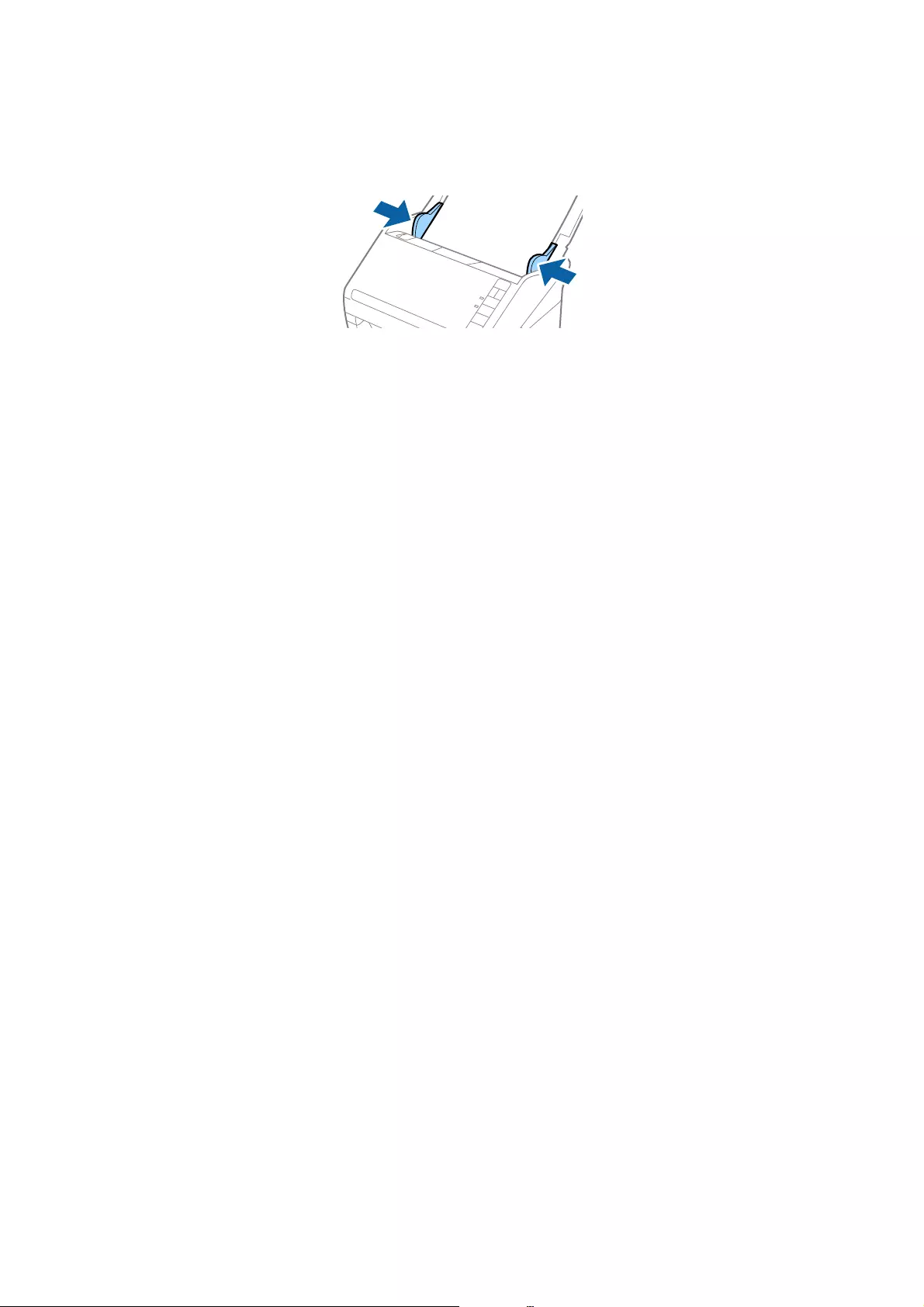
6. Slide the edge guides to t the edge of the originals making sure there are no gaps between the originals and
the edge guides. Otherwise, the originals may be fed skewed.
User's Guide
Specications of Originals and Placing Originals
26
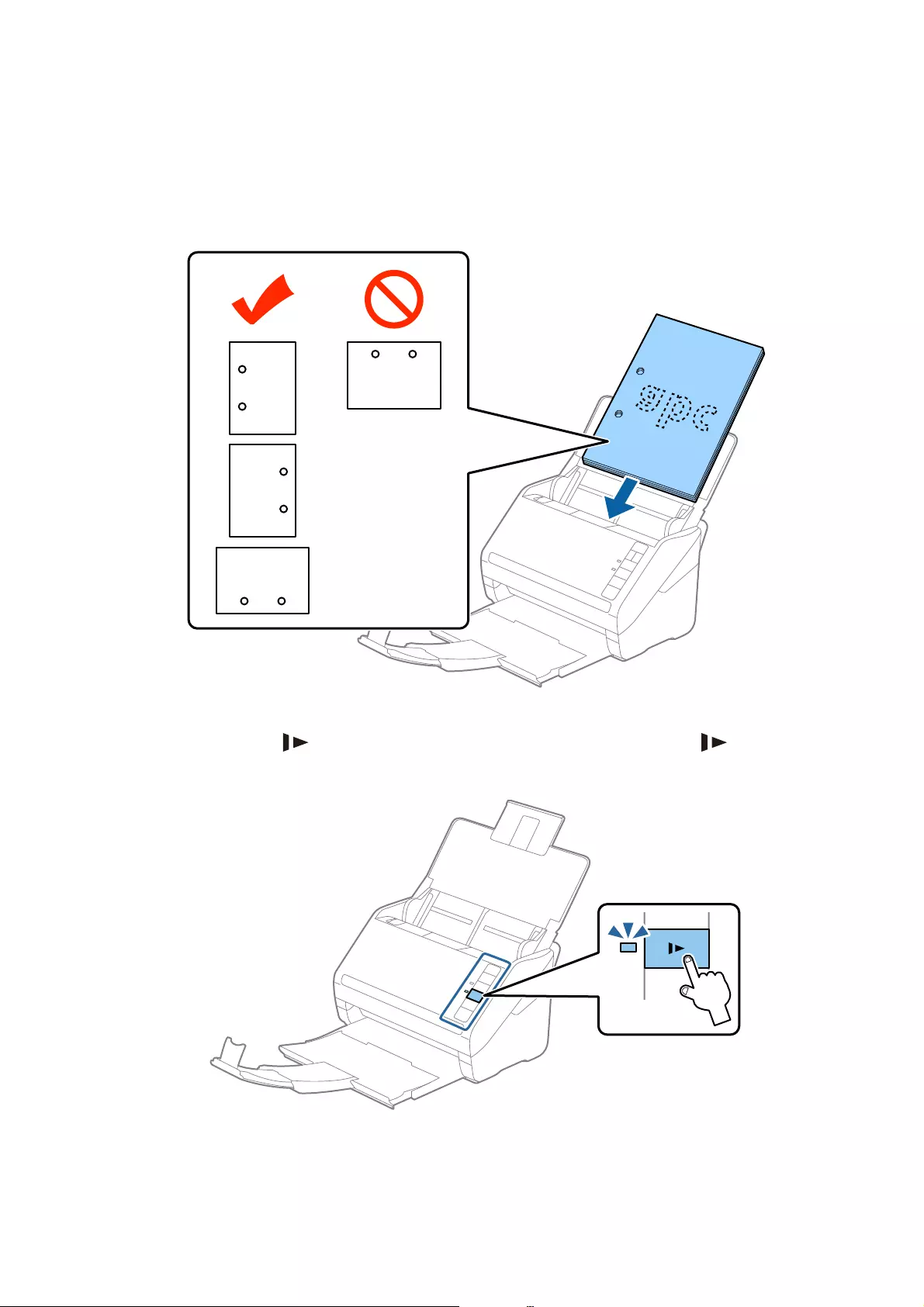
Note:
❏When scanning originals with punch holes such as loose leaf paper, load the originals with the holes facing the side or
facing down. ere must not be any holes within a 30 mm (1.2 inches) strip at the center of the originals. However,
there can be holes within 30 mm (1.2 inches) from the leading edge of the originals. Make sure that the edges of the
punch holes do not have burrs or curls.
❏When scanning thin paper with crinkles that are causing paper jams or double feeds, you may be able to improve the
situation by pressing the (Slow Mode) button to slow down the feeding speed. Pressing the (Slow Mode)
button once slows down the paper feeding speed; press it again to return to normal speed.
User's Guide
Specications of Originals and Placing Originals
27
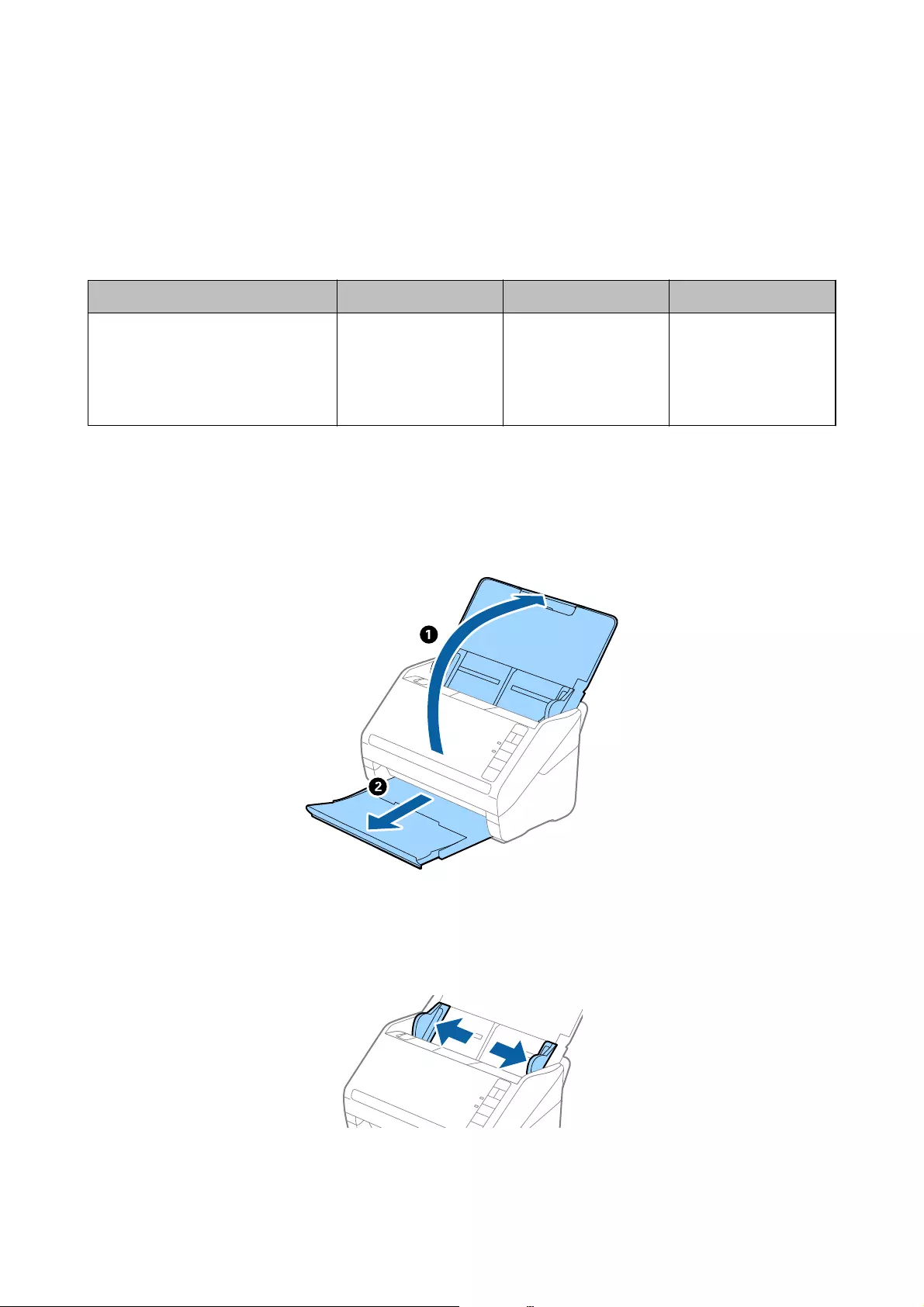
Long Paper
Specications of Long Paper
e specication of long paper you can load into the scanner.
Size Thickness Paper Type Loading Capacity
Width: 50.8 to 215.9 mm
(2.0 to 8.5 in.)
Length: 393.8 to 6,096.0 mm
(15.5 to 240.0 in.)
50 to 130 g/m Plain paper
Fine paper
Recycled paper
1 sheet
Placing Long Paper
1. Open the input tray, and then slide out the output tray.
Note:
Do not extend the input tray extension and output tray extensions and do not raise the stopper.
2. Slide the edge guides on the input tray all the way out.
User's Guide
Specications of Originals and Placing Originals
28
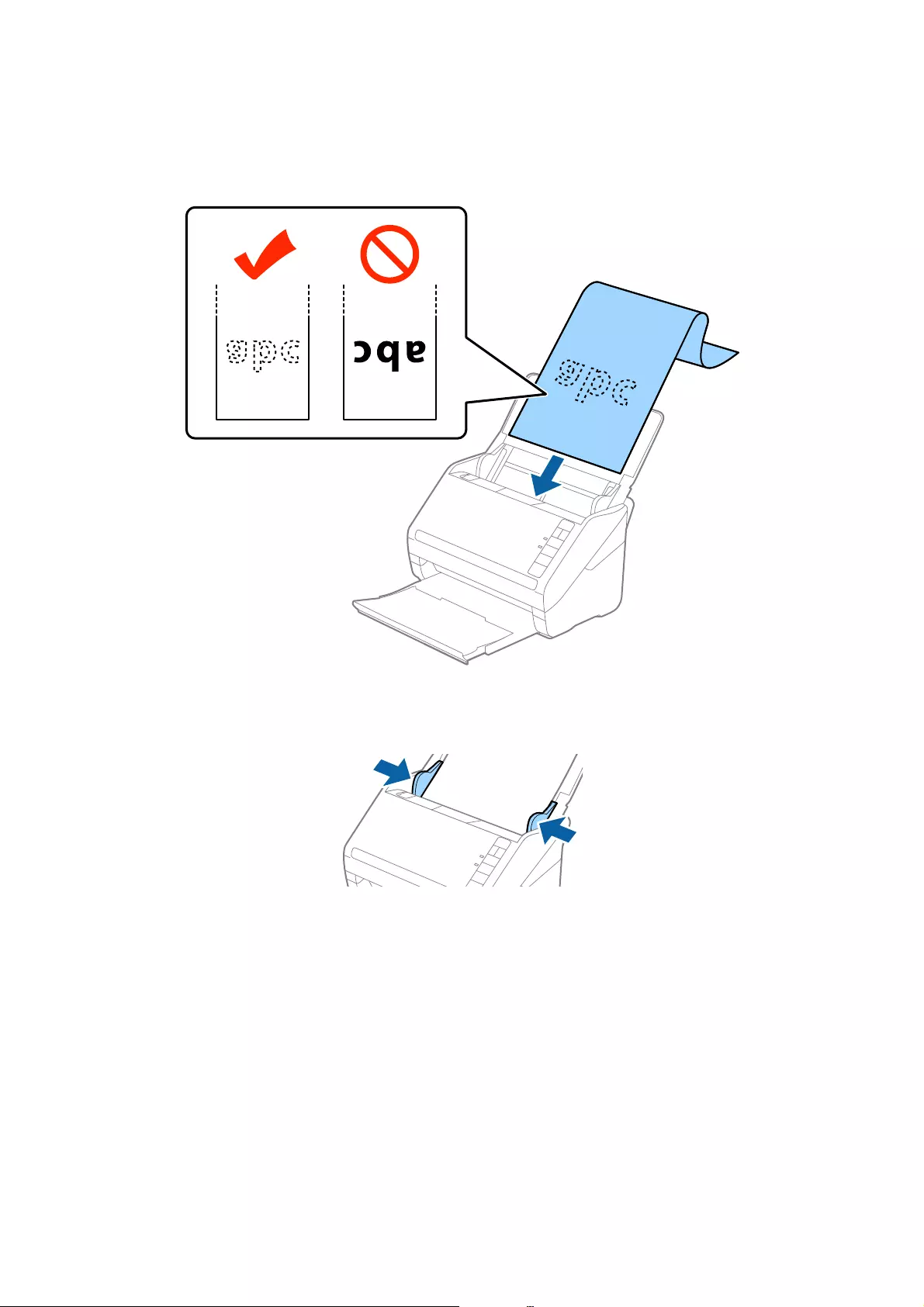
3. Load the original straight into the input tray, facing down with the top edge facing into the ADF.
Slide the original into the ADF until it meets resistance.
4. Adjust the edge guides to t the edge of the long paper making sure there are no gaps between the edge of the
paper and the edge guides. Otherwise, the originals may be fed skewed.
User's Guide
Specications of Originals and Placing Originals
29
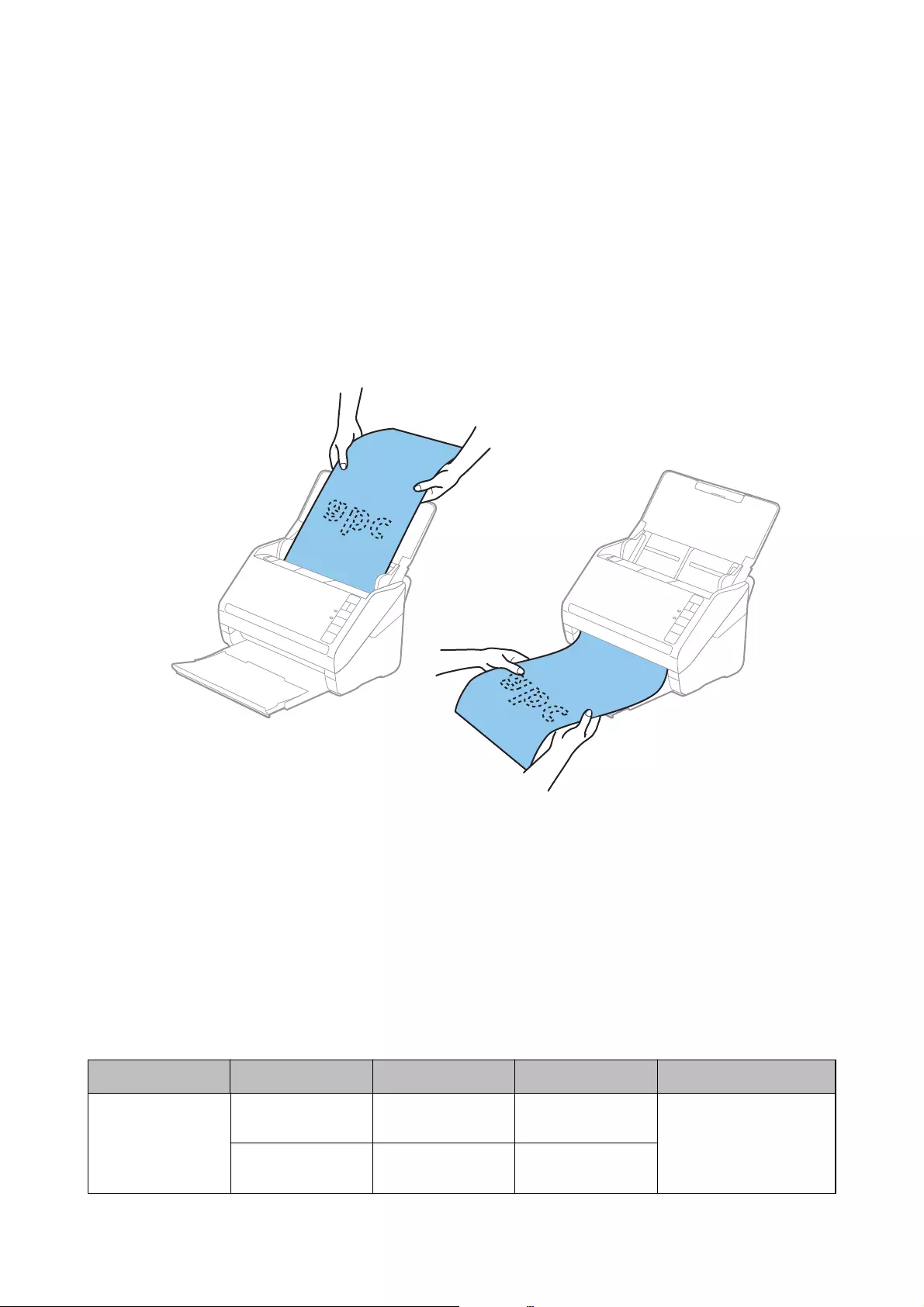
Note:
❏You can scan long paper up to 5,461 mm (215 inches) in length with a resolution of 300 dpi or less, and over 5,461
mm (215 inches) to 6,096 mm (240 inches) with a resolution of 200 dpi or less.
❏You need to specify the paper size in Epson Scan 2. ere are three ways to specify the paper size in Epson Scan 2, if
the paper length is 3,048 mm (120 inches) or less, you can select Auto Detect (Long Paper) to detect the size
automatically.
If the paper length is more than 3,048 mm (120 inches), you need to select Customize and enter the size of the paper.
If the paper length is 5,461 mm (215 inches) or less, you can use Detect paper length instead of entering the paper
height. If the paper is longer than 5,461 mm (215 inches), you need to enter both width and height size of the paper.
❏Support the long paper at the input side so that it does not drop out of the ADF, and the output side so that the
ejected paper does not fall from the output tray.
Related Information
&“Required Settings for Special Originals in Epson Scan 2” on page 53
Plastic Cards
Specications of Plastic Cards
e specication of plastic card you can load into the scanner.
Size Card Type Thickness Loading Capacity Loading Direction
ISO7810 ID-1 Type
54.0×85.6 mm
(2.1×3.3 in.)
With embossing 1.24 mm (0.05 in.) or
less
1 card Horizontal (Landscape)
Without embossing 0.76 mm (0.03 in.) or
less
5 cards
User's Guide
Specications of Originals and Placing Originals
30
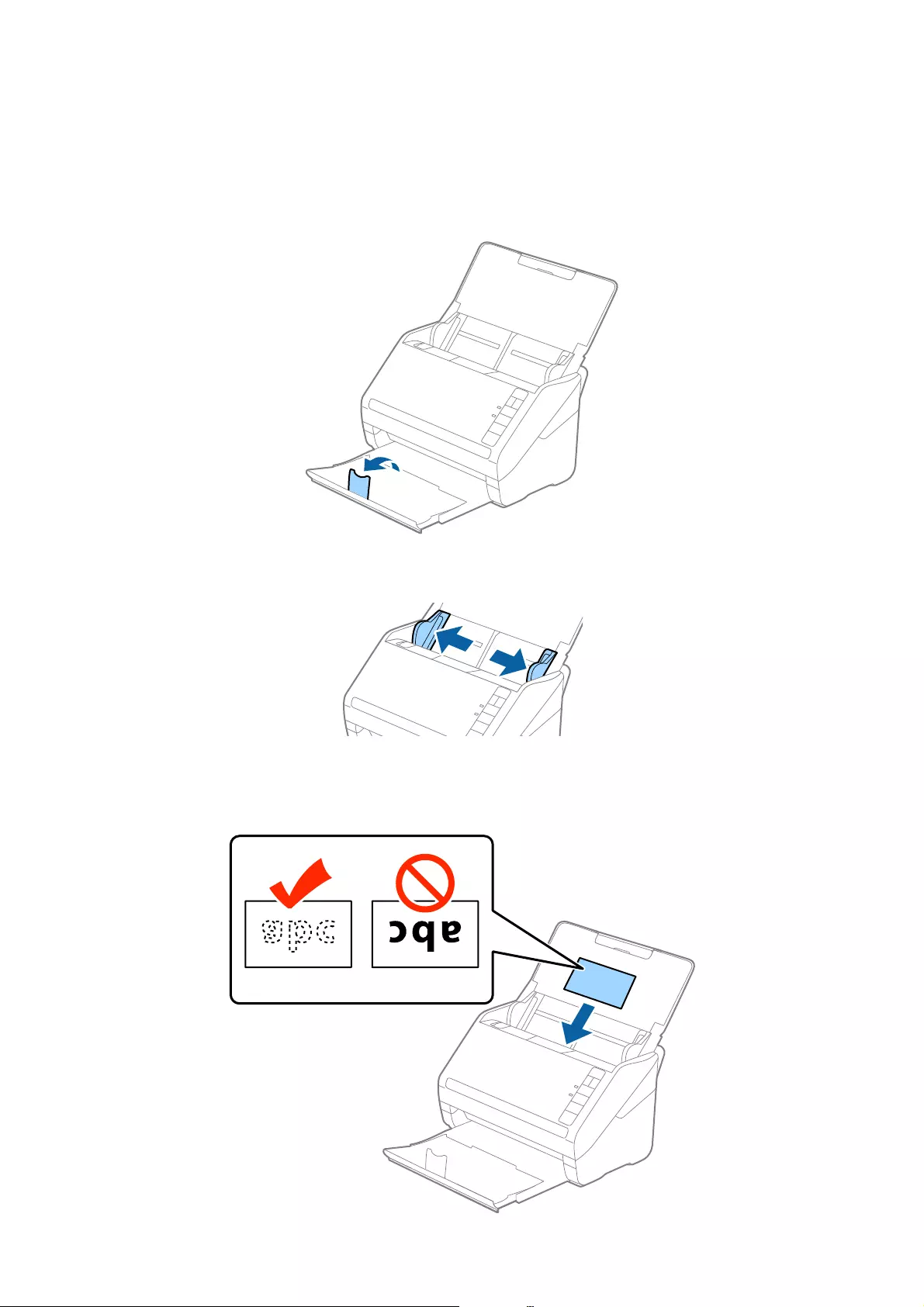
Placing Plastic Cards
1. Open the input tray, and then slide out the output tray and raise the stopper.
2. Slide the edge guides on the input tray all the way out.
3. Load the plastic cards into the input tray facing down with the top edge facing into the ADF.
Slide the plastic cards into the ADF until they meet resistance.
User's Guide
Specications of Originals and Placing Originals
31
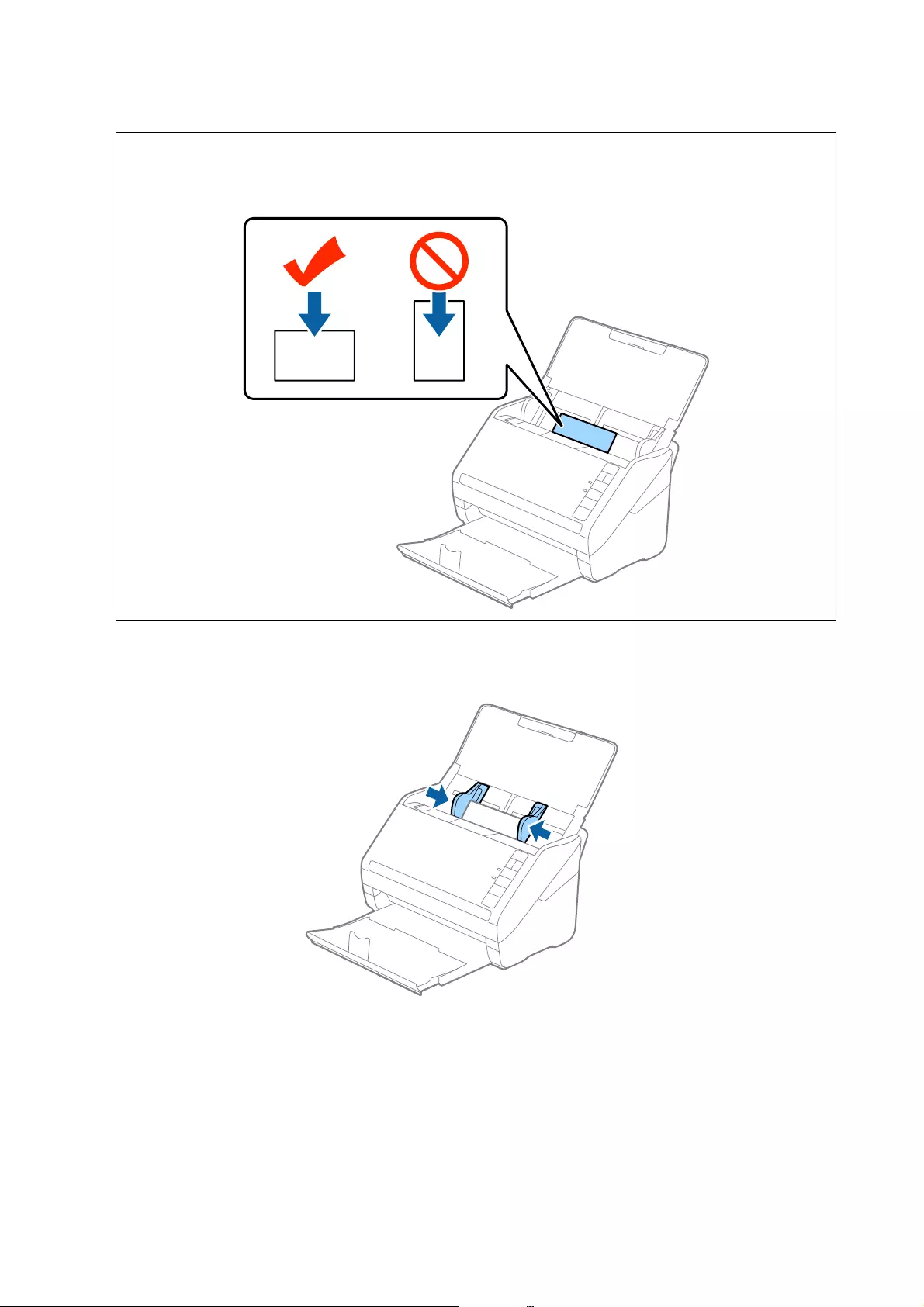
c
Important:
Do not load plastic cards vertically.
4. Slide the edge guides to t the edge of the plastic cards.
User's Guide
Specications of Originals and Placing Originals
32
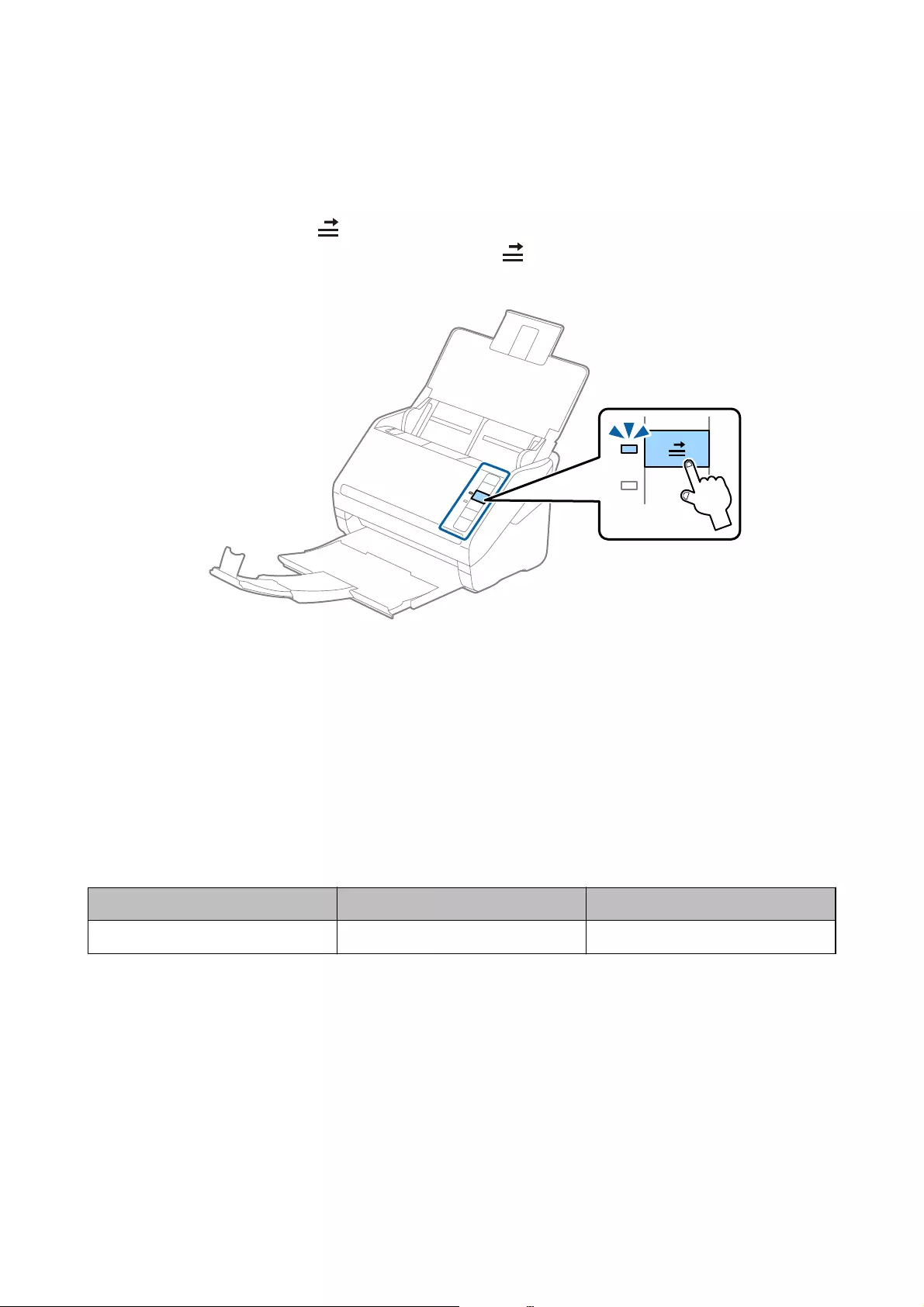
Note:
To scan plastic cards, select Plastic Card (Landscape) in Document Size or select O in Detect Double Feed on the
Main Settings tab in Epson Scan 2. See the Epson Scan 2 help for details.
If you forget to disable Detect Double Feed in Epson Scan 2 and a double feed error occurs, remove the card from the
ADF and then reload it, press the (Double Feed Detection Skip) button on the scanner as shown below to disable
Detect Double Feed for the next scan, and then scan again. e (Double Feed Detection Skip) button only disables
Detect Double Feed for one sheet.
Related Information
&“Required Settings for Special Originals in Epson Scan 2” on page 53
Laminated Cards
Specications of Laminated Cards
e specication of laminated cards you can load into the scanner.
Size Thickness Loading Capacity
120.0×150.0 mm (4.7×5.9 in.) or less 0.8 mm (0.03 in.) or less 1 card
User's Guide
Specications of Originals and Placing Originals
33
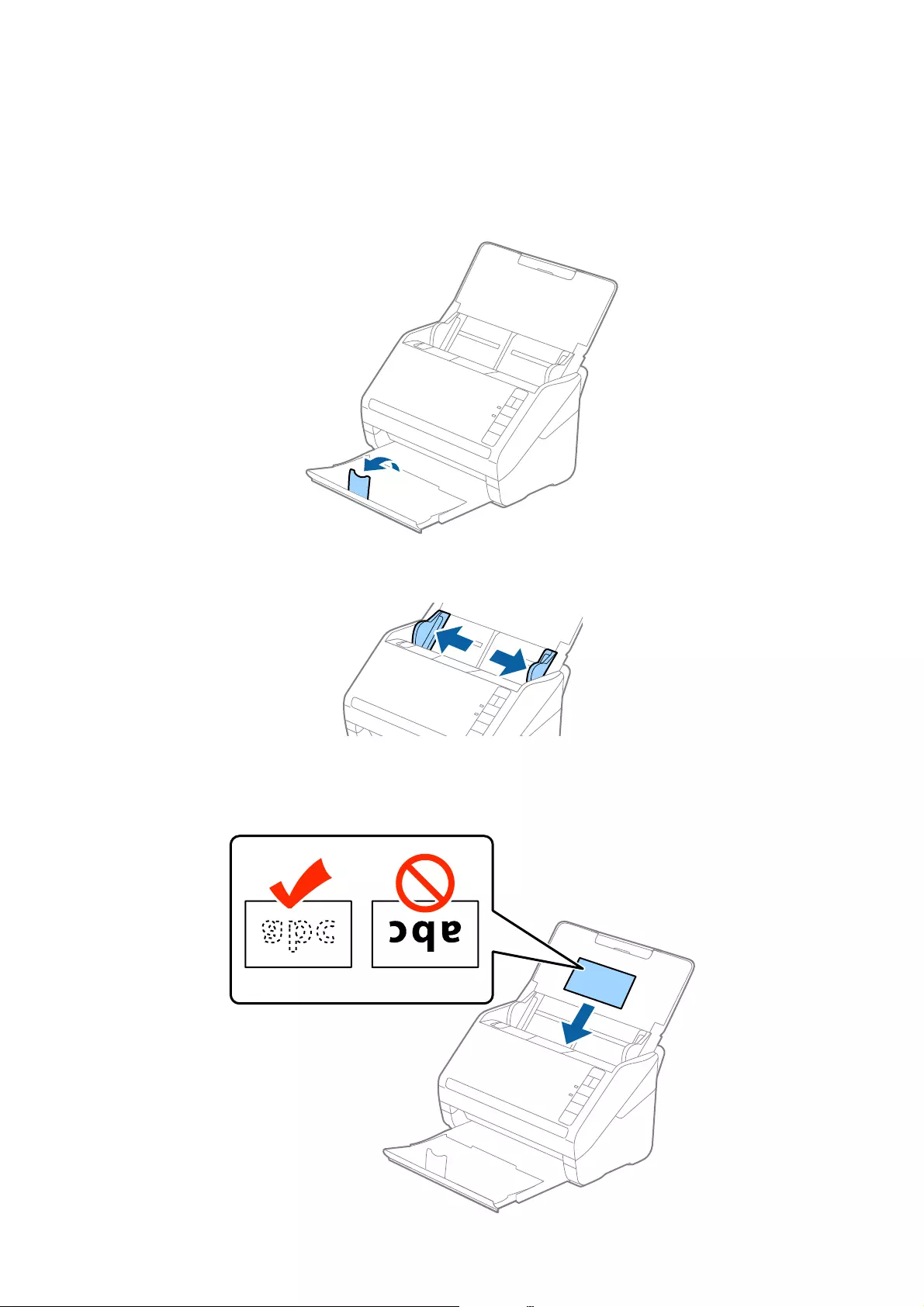
Placing Laminated Cards
1. Open the input tray, and then slide out the output tray and raise the stopper.
2. Slide the edge guides on the input tray all the way out.
3. Load the laminated cards into the input tray facing down with the top edge facing into the ADF.
Slide the laminated cards into the ADF until they meet resistance.
User's Guide
Specications of Originals and Placing Originals
34

4. Slide the edge guides to t the edge of the laminated cards.
Note:
❏To scan laminated cards, select Scan laminated card on the Settings window on the Main Settings tab in Epson
Scan 2 to increase the accuracy of auto size detection. See the Epson Scan 2 help for details.
❏To scan laminated cards, select O in Detect Double Feed on the Main Settings tab in Epson Scan 2. See the Epson
Scan 2 help for details.
If you forget to disable Detect Double Feed in Epson Scan 2 and a double feed error occurs, remove the card from
the ADF and then reload it, press the (Double Feed Detection Skip) button on the scanner as shown below to
disable Detect Double Feed for the next scan, and then scan again. e (Double Feed Detection Skip) button
only disables Detect Double Feed for one sheet.
Related Information
&“Required Settings for Special Originals in Epson Scan 2” on page 53
User's Guide
Specications of Originals and Placing Originals
35
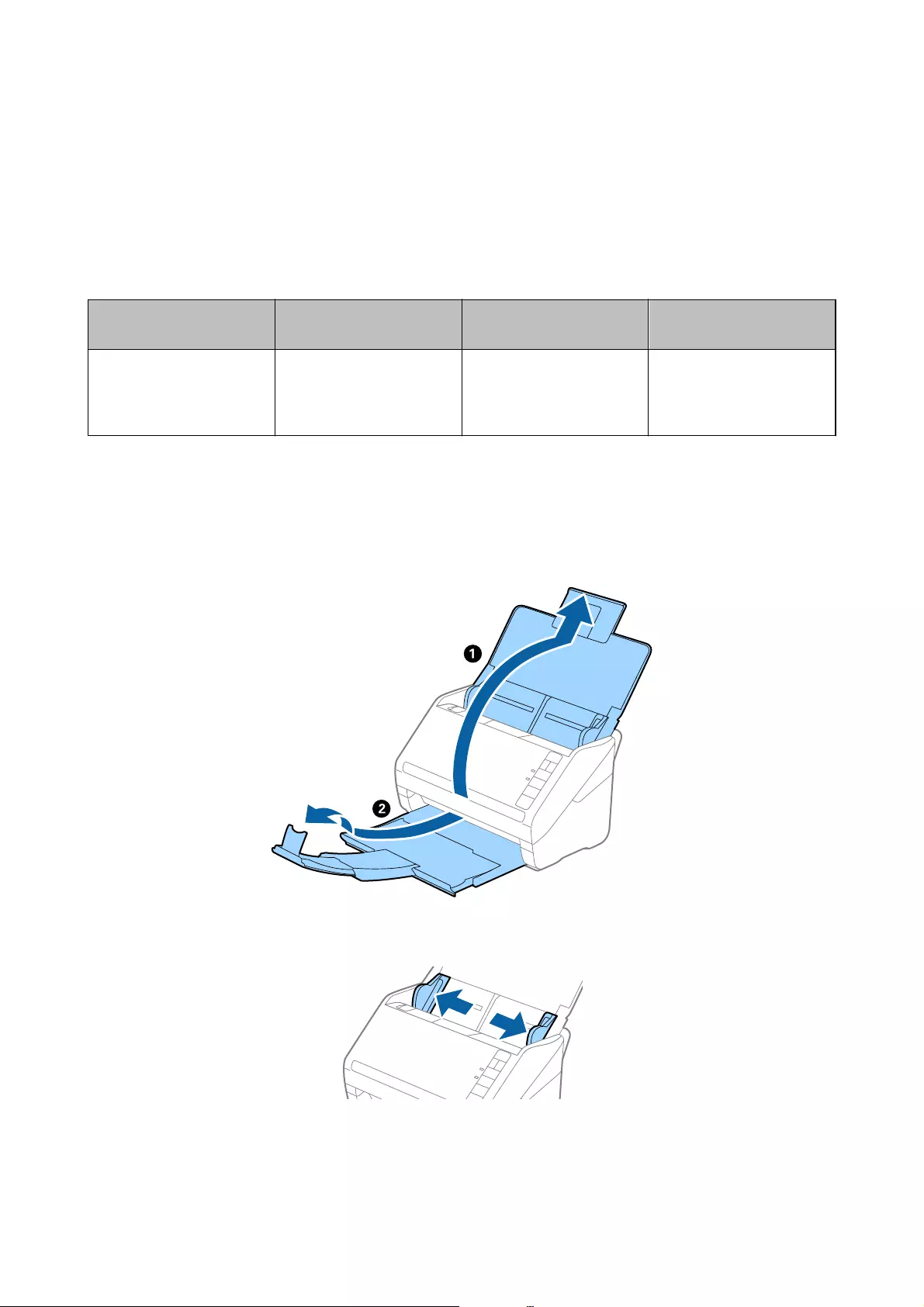
Large Size Originals
Specications of Large Size Originals
By using the Carrier Sheet sold separately and folding the originals in half, you can scan originals larger than A4
size, such as A3 or B4 sizes.
Size Thickness Paper Type Loading Capacity of the
Carrier Sheet
Up to A3 0.3 mm (0.012 in.) or less
(excluding the thickness of
the Carrier Sheet)
Plain paper
Fine paper
Recycled paper
10 carrier sheets
Placing Large Size Originals
1. Open the input tray and extend the input tray extension. Slide out the output tray, extend the output tray
extension, and then raise the stopper.
2. Slide the edge guides on the input tray all the way out.
User's Guide
Specications of Originals and Placing Originals
36
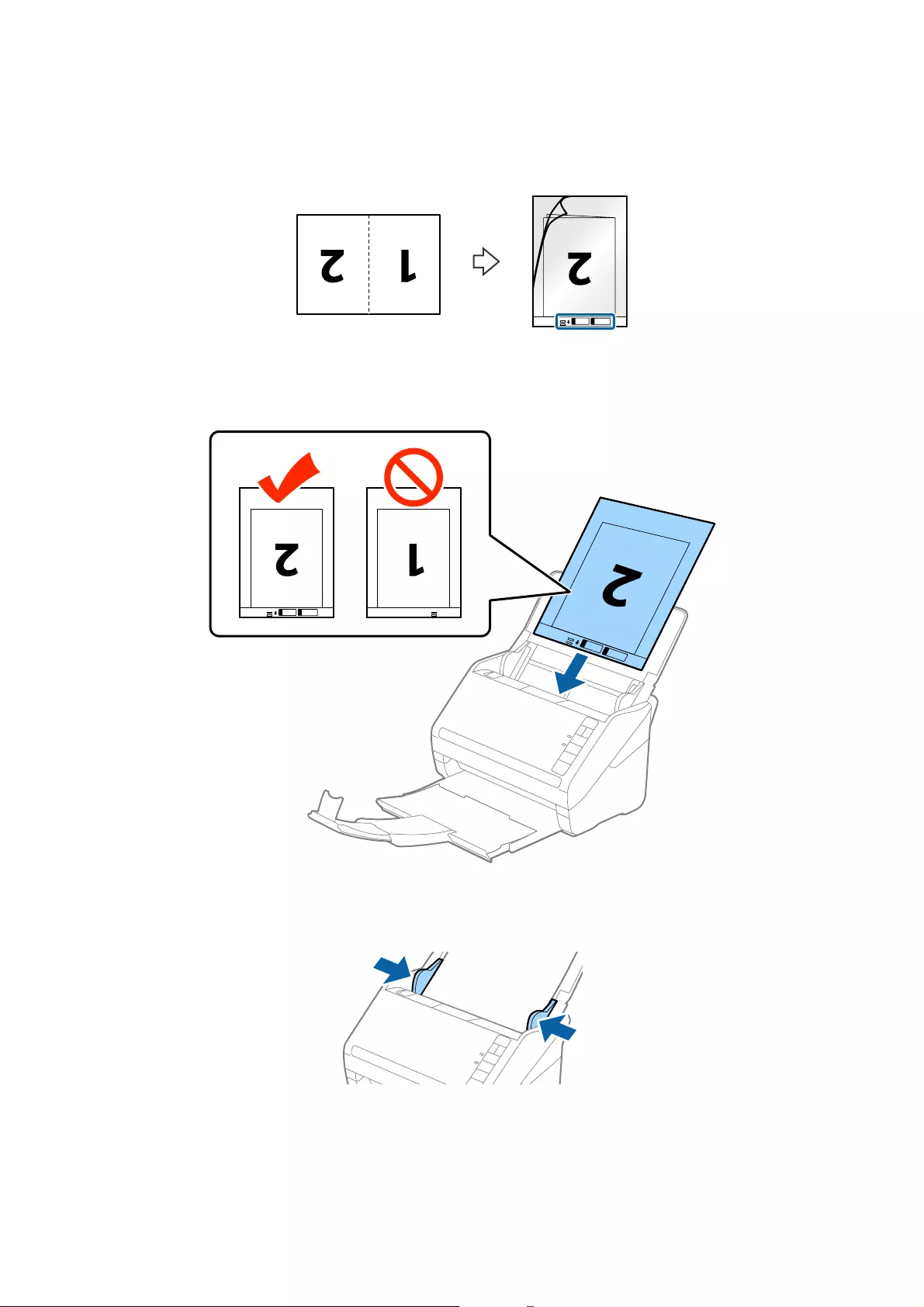
3. Place the Carrier Sheet with the illustration on the front edge facing up and place the original in the carrier
sheet by folding it in half so that the side to be scanned is facing out, with the right side at the front.
4. Load the Carrier Sheet into the input tray with the top edge facing into the ADF.
Slide the Carrier Sheet into the ADF until it meets resistance.
5. Slide the edge guides to t the edge of the Carrier Sheet making sure there are no gaps between the Carrier
Sheet and the edge guides. Otherwise, the carrier sheet may be fed skewed.
User's Guide
Specications of Originals and Placing Originals
37
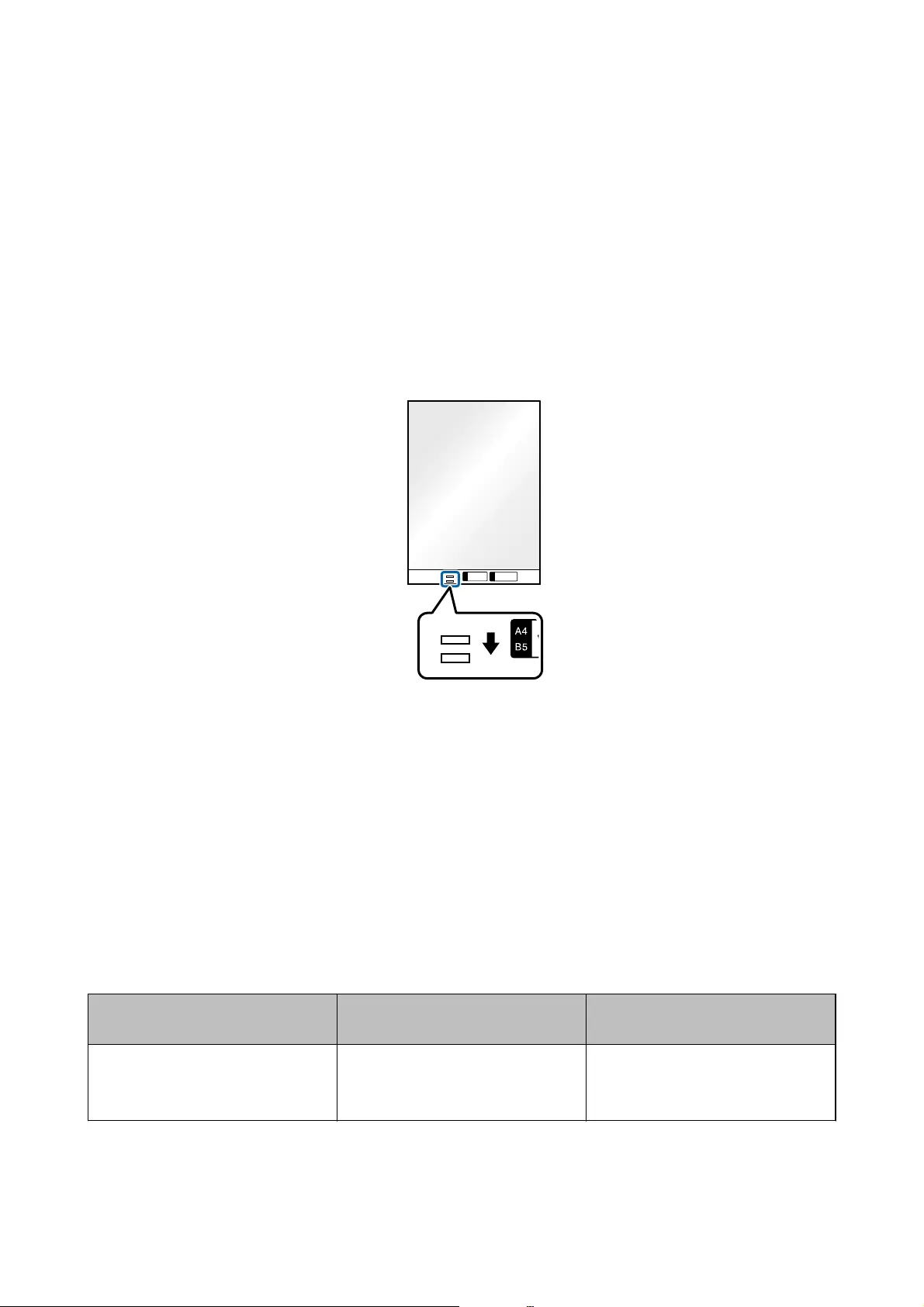
Note:
❏You may need to stop using a Carrier Sheet that is scratched or has been scanned more than 3,000 times.
❏To scan both sizes and stitch them together, select Double-Sided from Scanning Side and select Le & Right from
Stitch Images in Epson Scan 2. See the Epson Scan 2 help for details.
❏When scanning a Carrier Sheet by selecting Auto Detect as the Document Size setting, the image is automatically
scanned by applying Paper Skew in the Correct Document Skew setting.
❏e leading edge of the original must be placed at the binding part of the Carrier Sheet when scanning an original
approximately 297 mm long. Otherwise, the length of the scanned image may be longer than intended as the scanner
scans to the end of the Carrier Sheet when you select Auto Detect as the Document Size setting in Epson Scan 2.
❏Only use the Carrier Sheet designed for your scanner. e Carrier Sheet is automatically recognized by the scanner
by detecting two small rectangular holes on the front edge. Keep the holes clean and not covered.
Related Information
&“Carrier Sheet Codes” on page 16
&“Required Settings for Special Originals in Epson Scan 2” on page 53
Irregular Shaped Originals
Specications of Irregular Shaped Originals
By using the Carrier Sheet sold separately, you can scan originals that are wrinkled, curled, very thin, or irregularly
shaped.
Size Thickness Loading Capacity of the Carrier
Sheet
Up to A4 0.3 mm (0.012 in.) or less
(excluding the thickness of the Carrier
Sheet)
10 sheets
User's Guide
Specications of Originals and Placing Originals
38
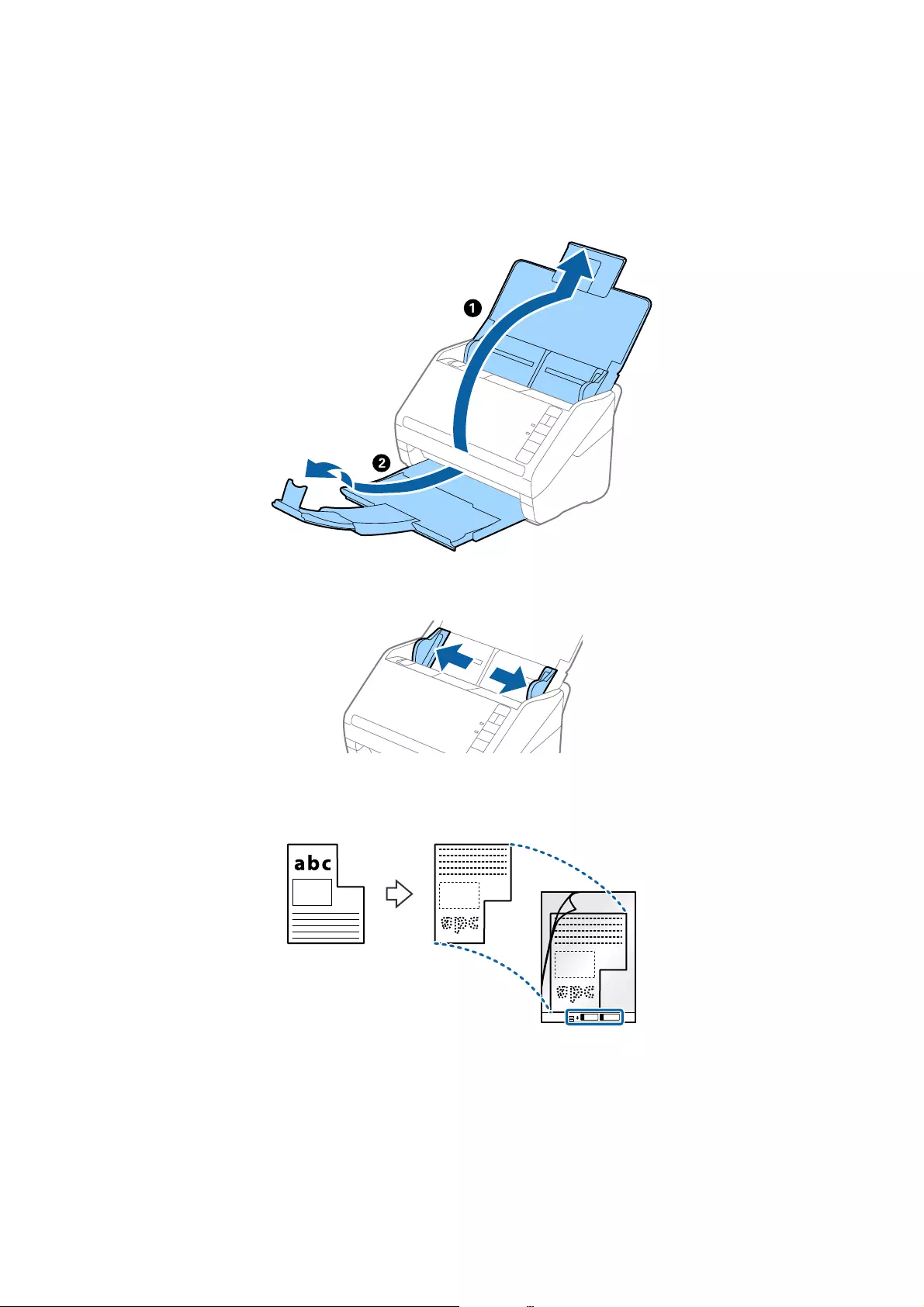
Placing Irregular Shaped Originals
1. Open the input tray and extend the input tray extension. Slide out the output tray, extend the output tray
extension, and then raise the stopper.
2. Slide the edge guides on the input tray all the way out.
3. Place the Carrier Sheet with the illustration on the front edge facing up and place the original in the center of
the Carrier Sheet with the side to be scanned facing down.
User's Guide
Specications of Originals and Placing Originals
39
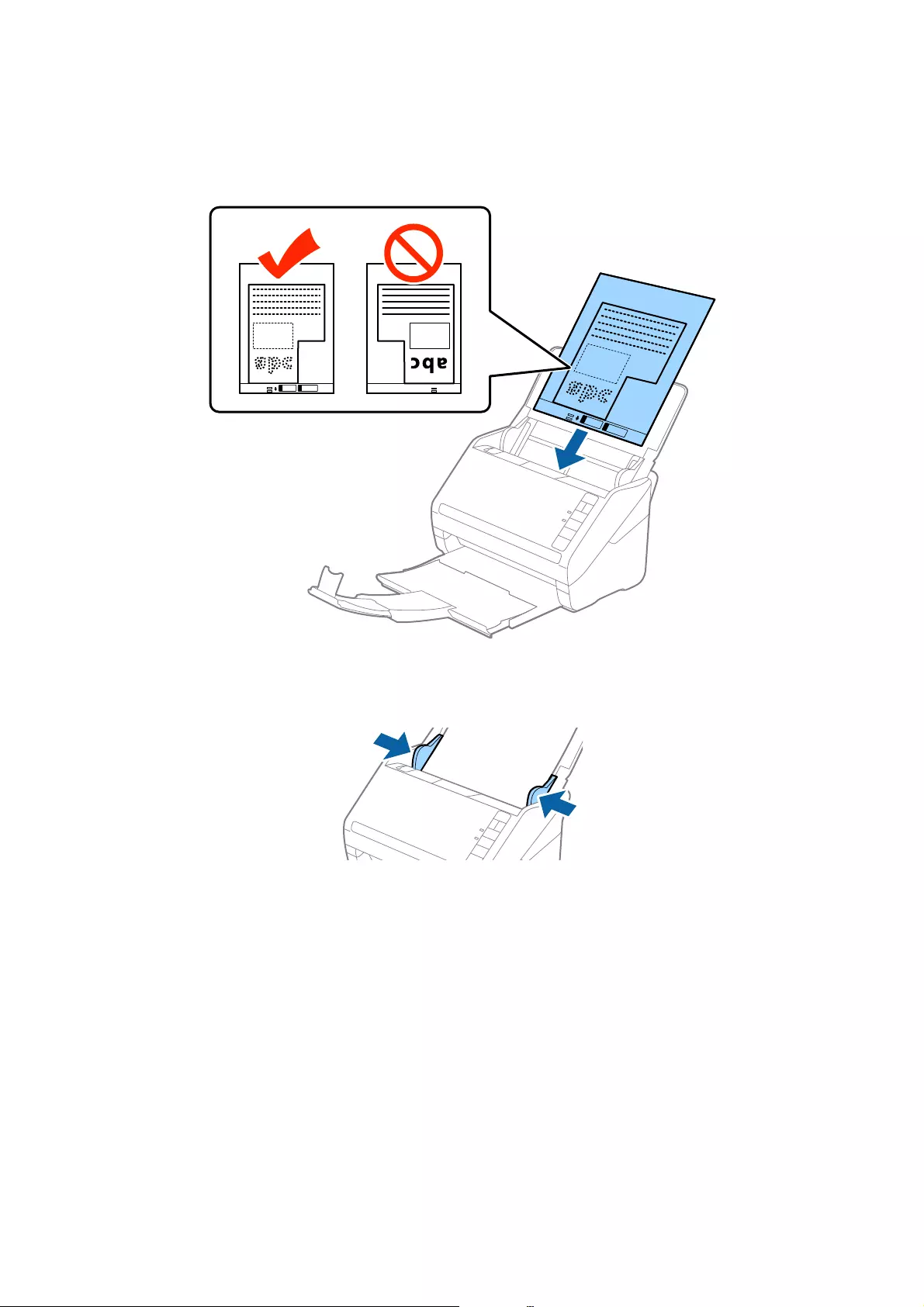
4. Load the Carrier Sheet into the input tray with the top edge facing into the ADF.
Slide the Carrier Sheet into the ADF until it meets resistance.
5. Slide the edge guides to t the edge of the Carrier Sheet making sure there are no gaps between the Carrier
Sheet and the edge guides. Otherwise, the carrier sheet may be fed skewed.
User's Guide
Specications of Originals and Placing Originals
40
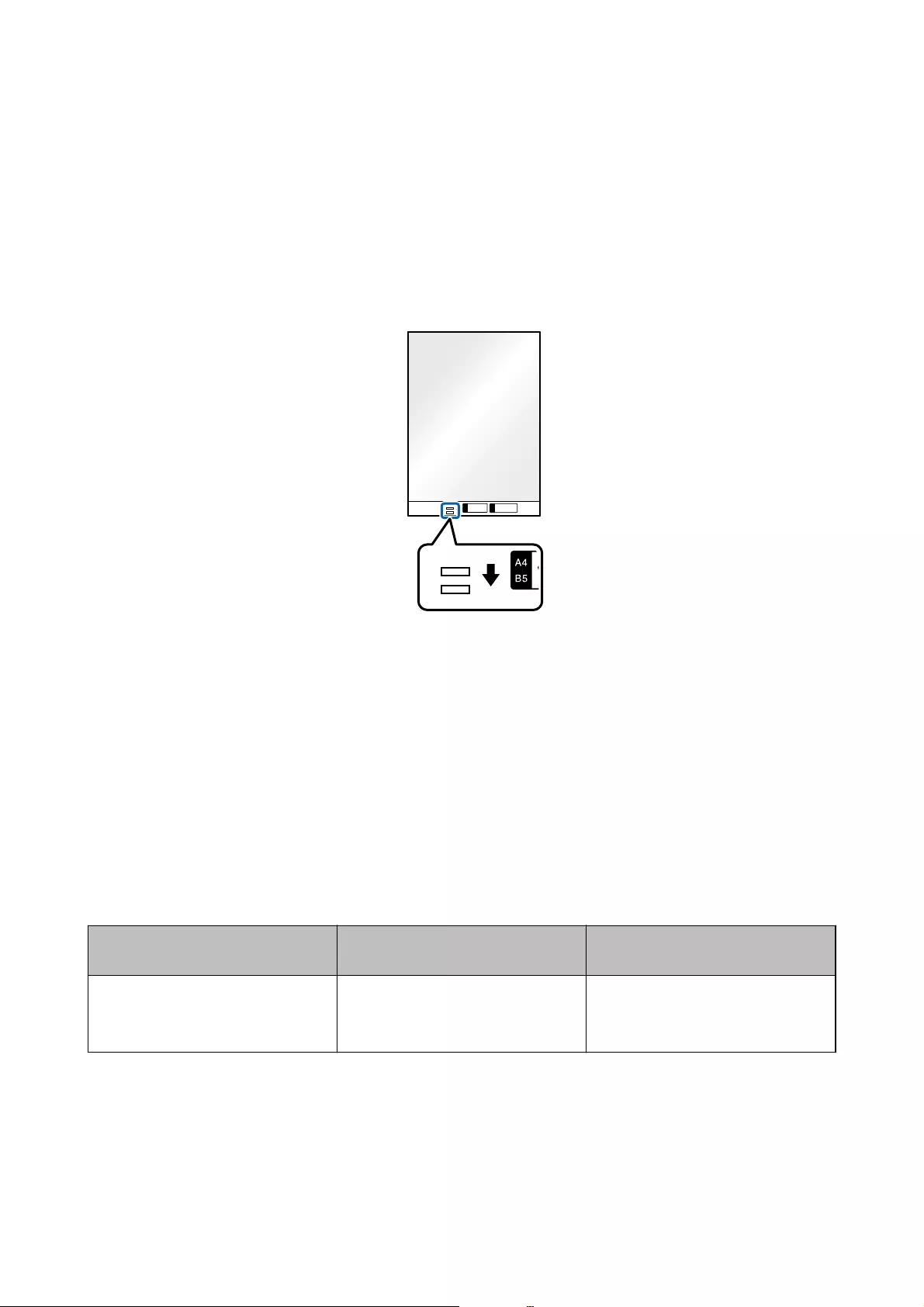
Note:
❏You may need to stop using a Carrier Sheet that is scratched or has been scanned more than 3,000 times.
❏If you cannot nd an appropriate size for the original you want to scan in the Document Size list in Epson Scan 2,
select Auto Detect or select Customize to create a custom document size.
When scanning a Carrier Sheet by selecting Auto Detect as the Document Size setting, the image is automatically
scanned by applying Paper Skew in the Correct Document Skew setting.
❏Only use the Carrier Sheet designed for your scanner. e Carrier Sheet is automatically recognized by the scanner
by detecting two small rectangular holes on the front edge. Keep the holes clean and not covered.
Related Information
&“Carrier Sheet Codes” on page 16
&“Required Settings for Special Originals in Epson Scan 2” on page 53
Photographs
Specications of Photographs
By using the Carrier Sheet sold separately, you can scan photographs without worrying about them being
damaged.
Size Thickness Loading Capacity of the Carrier
Sheet
Up to A4 0.3 mm (0.012 in.) or less
(excluding the thickness of the Carrier
Sheet)
10 sheets
User's Guide
Specications of Originals and Placing Originals
41
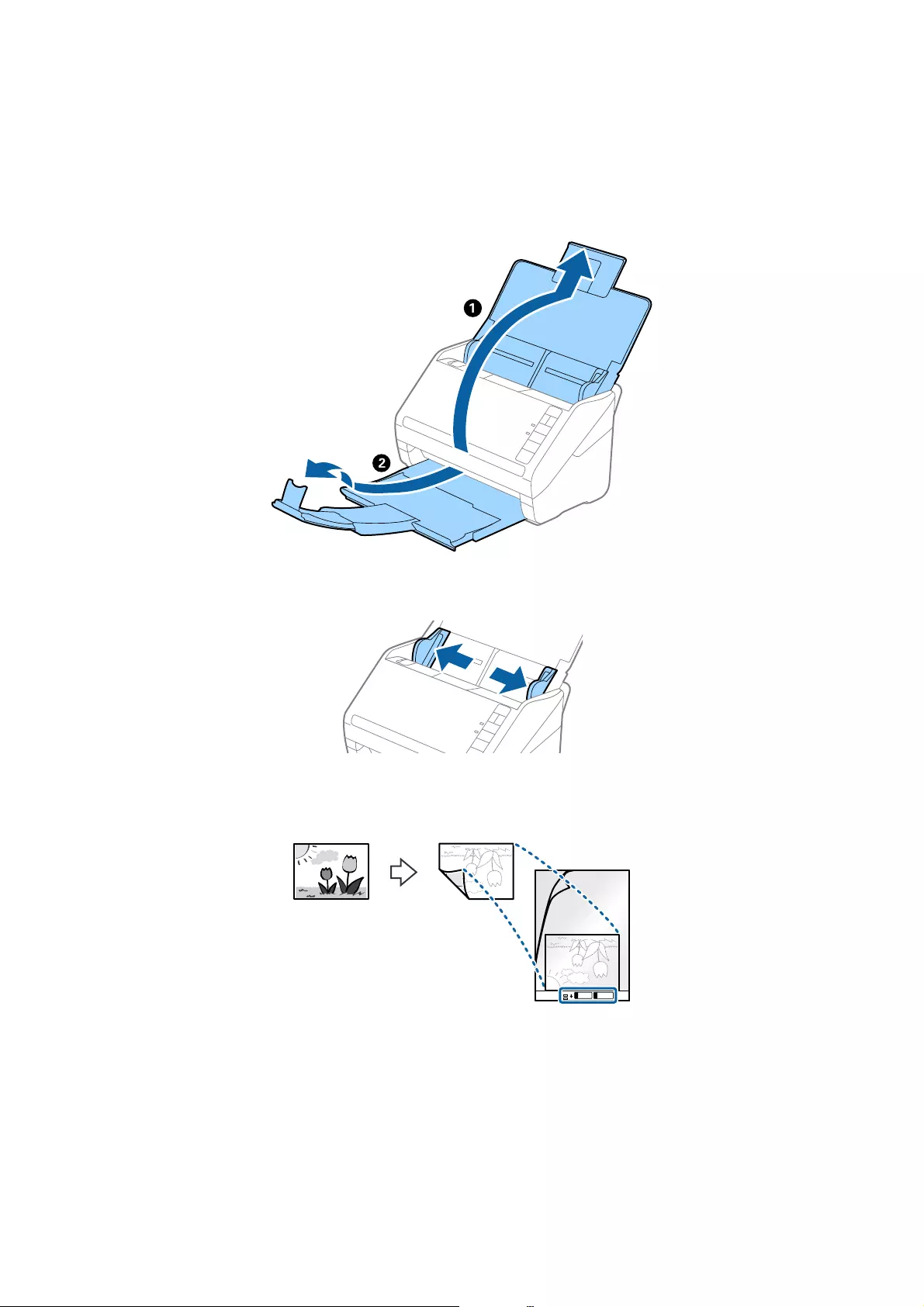
Placing Photographs
1. Open the input tray and extend the input tray extension. Slide out the output tray, extend the output tray
extension, and then raise the stopper.
2. Slide the edge guides on the input tray all the way out.
3. Place the Carrier Sheet with the illustration on the front edge facing up and place the photo in the center of the
Carrier Sheet with the side to be scanned facing down.
User's Guide
Specications of Originals and Placing Originals
42
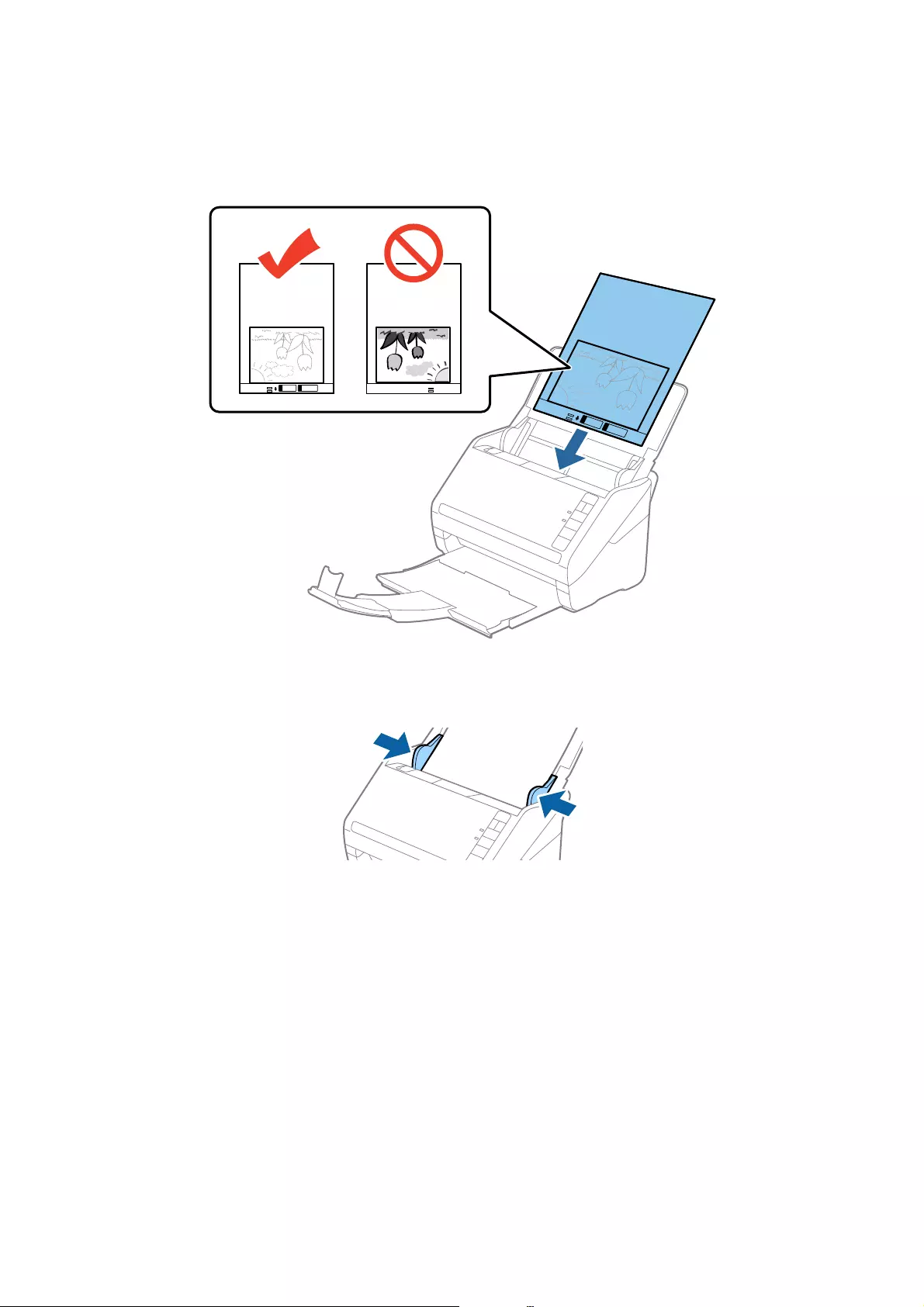
4. Load the Carrier Sheet into the input tray with the top edge facing into the ADF.
Slide the Carrier Sheet into the ADF until it meets resistance.
5. Slide the edge guides to t the edge of the Carrier Sheet making sure there are no gaps between the Carrier
Sheet and the edge guides. Otherwise, the carrier sheet may be fed skewed.
User's Guide
Specications of Originals and Placing Originals
43
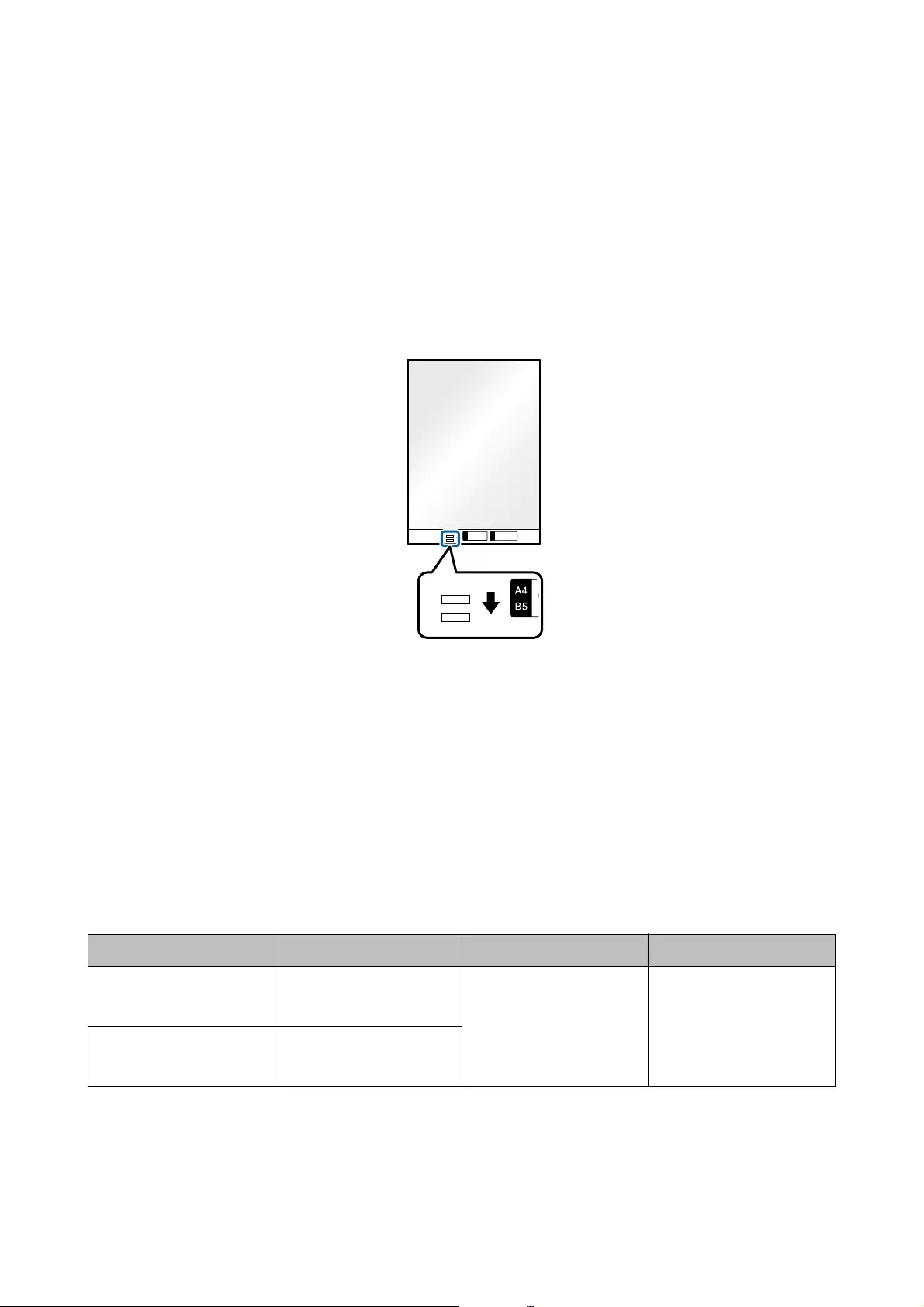
Note:
❏You may need to stop using a Carrier Sheet that is scratched or has been scanned more than 3,000 times.
❏If you cannot nd an appropriate size for the original you want to scan in the Document Size list in Epson Scan 2,
select Auto Detect or select Customize to create a custom document size.
When scanning a Carrier Sheet by selecting Auto Detect as the Document Size setting, the image is automatically
scanned by applying Paper Skew in the Correct Document Skew setting.
❏Do not leave photos inside the Carrier Sheet for a long time.
❏Only use the Carrier Sheet designed for your scanner. e Carrier Sheet is automatically recognized by the scanner
by detecting two small rectangular holes on the front edge. Keep the holes clean and not covered.
Related Information
&“Carrier Sheet Codes” on page 16
&“Required Settings for Special Originals in Epson Scan 2” on page 53
Envelopes
Specications of Envelopes
e specication of envelopes you can load into the scanner.
Size Measurement Thickness Loading Capacity
C6 114×162 mm (4.49×6.38 in.)
(standard size)
0.38 mm (0.015 in.) or less 10 envelopes
DL 110×220 mm (4.33×8.66 in.)
(standard size)
User's Guide
Specications of Originals and Placing Originals
44
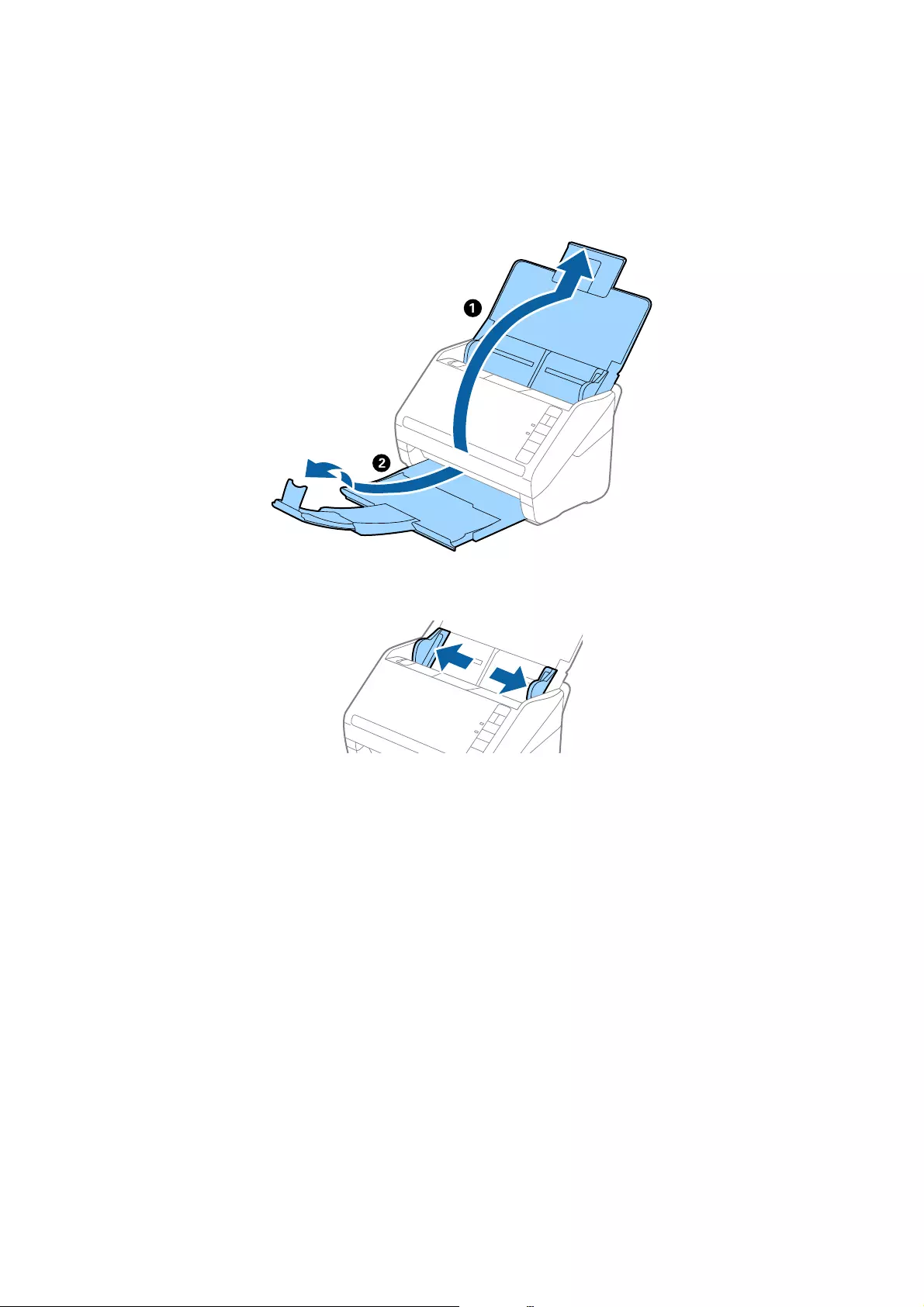
Placing Envelopes
1. Open the input tray and extend the input tray extension. Slide out the output tray, extend the output tray
extension, and then raise the stopper.
2. Slide the edge guides on the input tray all the way out.
User's Guide
Specications of Originals and Placing Originals
45
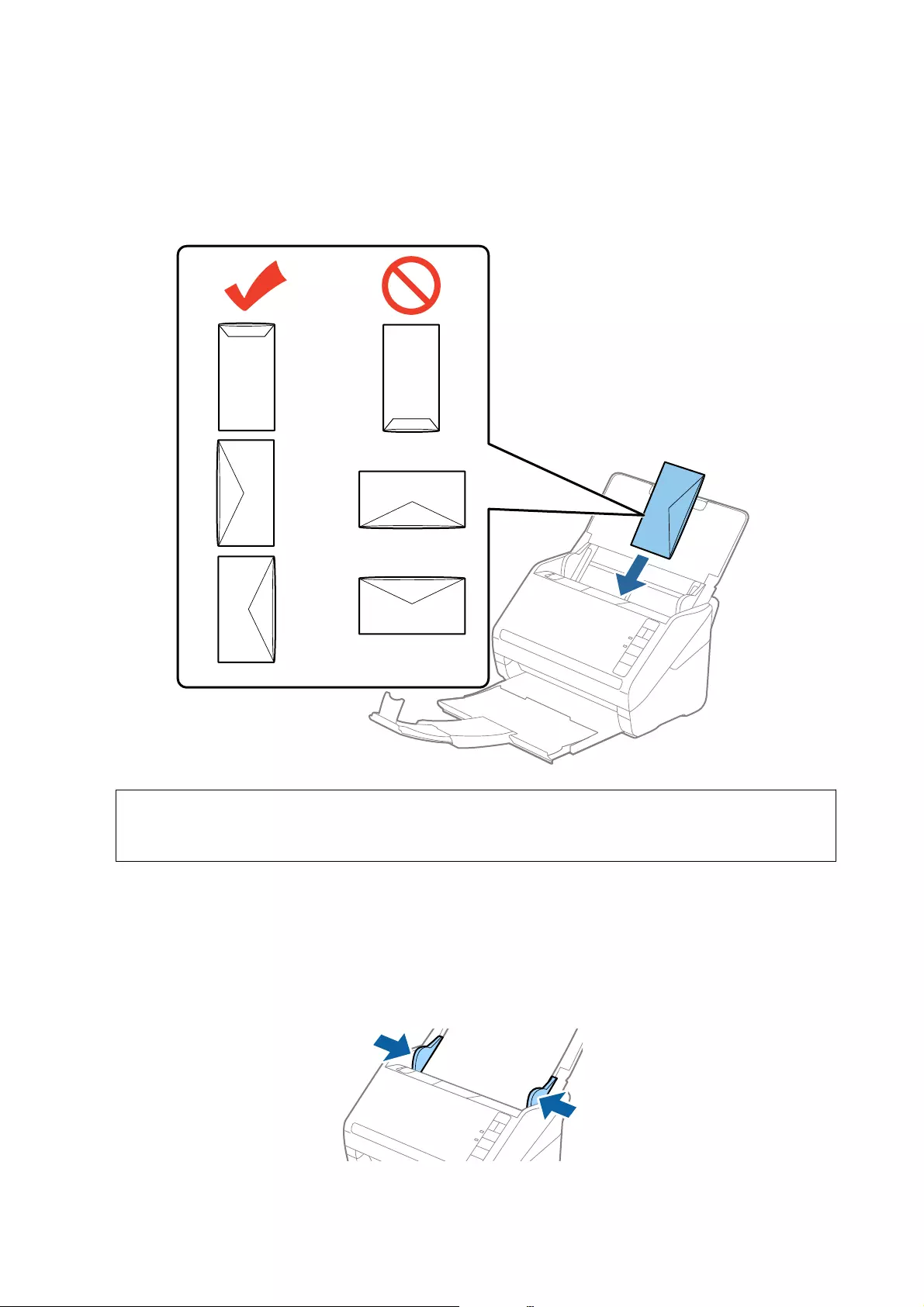
3. Load the envelopes into the input tray facing down making sure that the opened edge (ap side) of the
envelope is facing to the side. For envelopes with the opened edge (ap side) on the shorter side, you can load
the envelope with the opened edge (ap side) facing up.
Slide the envelopes into the ADF until they meet resistance.
c
Important:
Do not load envelopes with adhesives on them.
Note:
❏Envelopes that are not opened by cutting sharply at the ap edge may not be scanned correctly.
❏Envelopes that have not yet been sealed can be loaded with the ap open and facing up.
4. Slide the edge guides to t the edge of the envelopes making sure there are no gaps between the envelopes and
the edge guides. Otherwise, the envelopes may be fed skewed.
User's Guide
Specications of Originals and Placing Originals
46
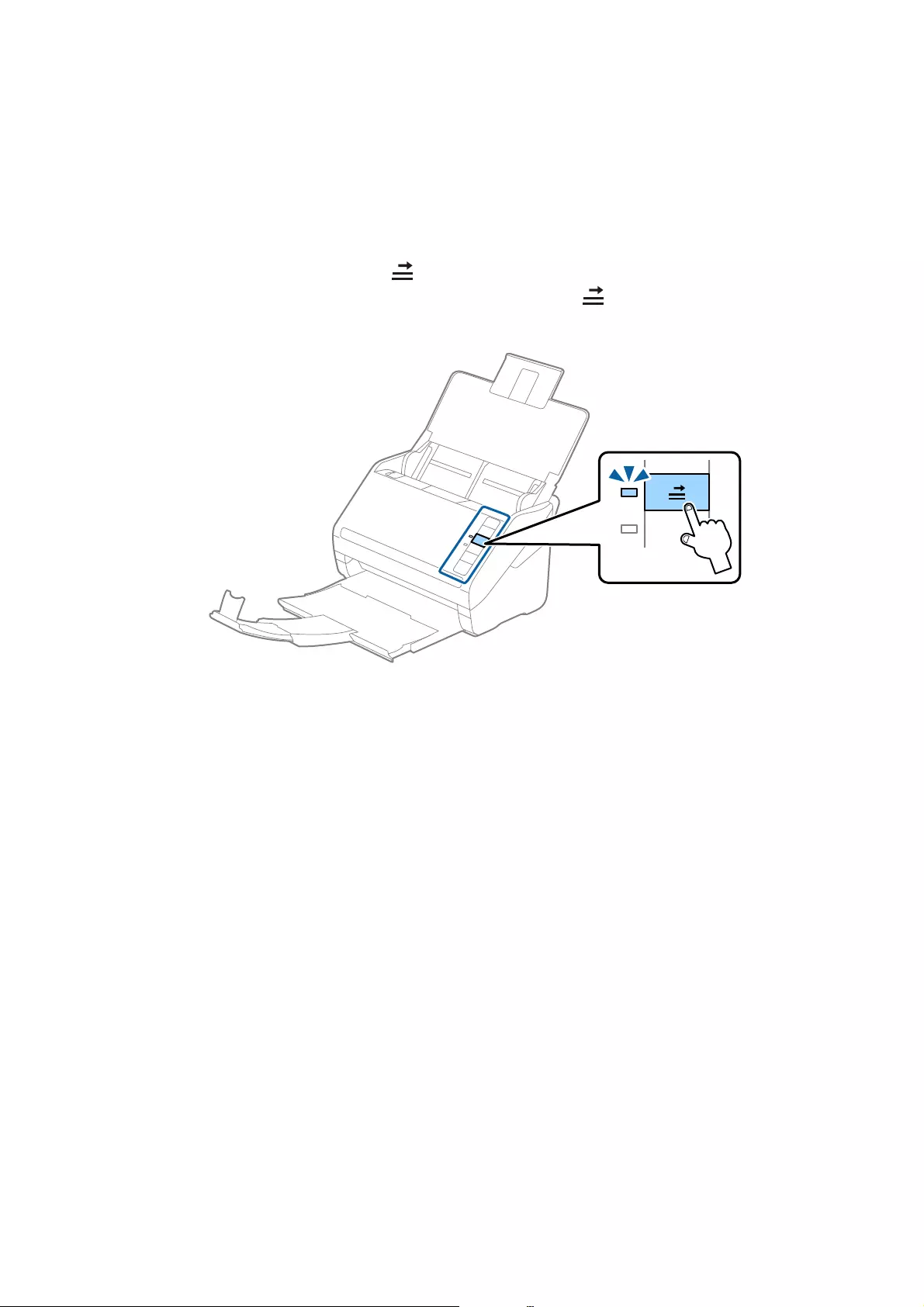
Note:
❏To scan envelopes, we recommend selecting the appropriate rotation angle or Auto in Rotate on the Main Settings
tab in Epson Scan 2 before scanning. See the Epson Scan 2 help for details.
❏To scan envelopes, select O in Detect Double Feed on the Main Settings tab in Epson Scan 2. See the Epson Scan 2
help for details.
If you forget to disable Detect Double Feed in Epson Scan 2 and a double feed error occurs, remove the envelope
from the ADF and then reload it, press the (Double Feed Detection Skip) button on the scanner as shown below
to disable Detect Double Feed for the next scan, and then scan again. e (Double Feed Detection Skip) button
only disables Detect Double Feed for one sheet.
Related Information
&“Required Settings for Special Originals in Epson Scan 2” on page 53
Mixture of Originals
Specications of Originals that are a Mixture of Dierent Sizes
You can load a mixture of originals from 50.8×50.8 mm (2.0×2.0 in.) to A4 (or Letter) size. You can also load a
mixture of paper types or thickness.
Note:
❏Depending on the combination of paper types or sizes, the originals may not be fed correctly and may be skewed or
jammed. We recommend that you check the scanned image if the original was skewed.
❏Alternatively, you can scan originals of dierent paper sizes and types by loading them one by one using Automatic
Feeding Mode.
User's Guide
Specications of Originals and Placing Originals
47
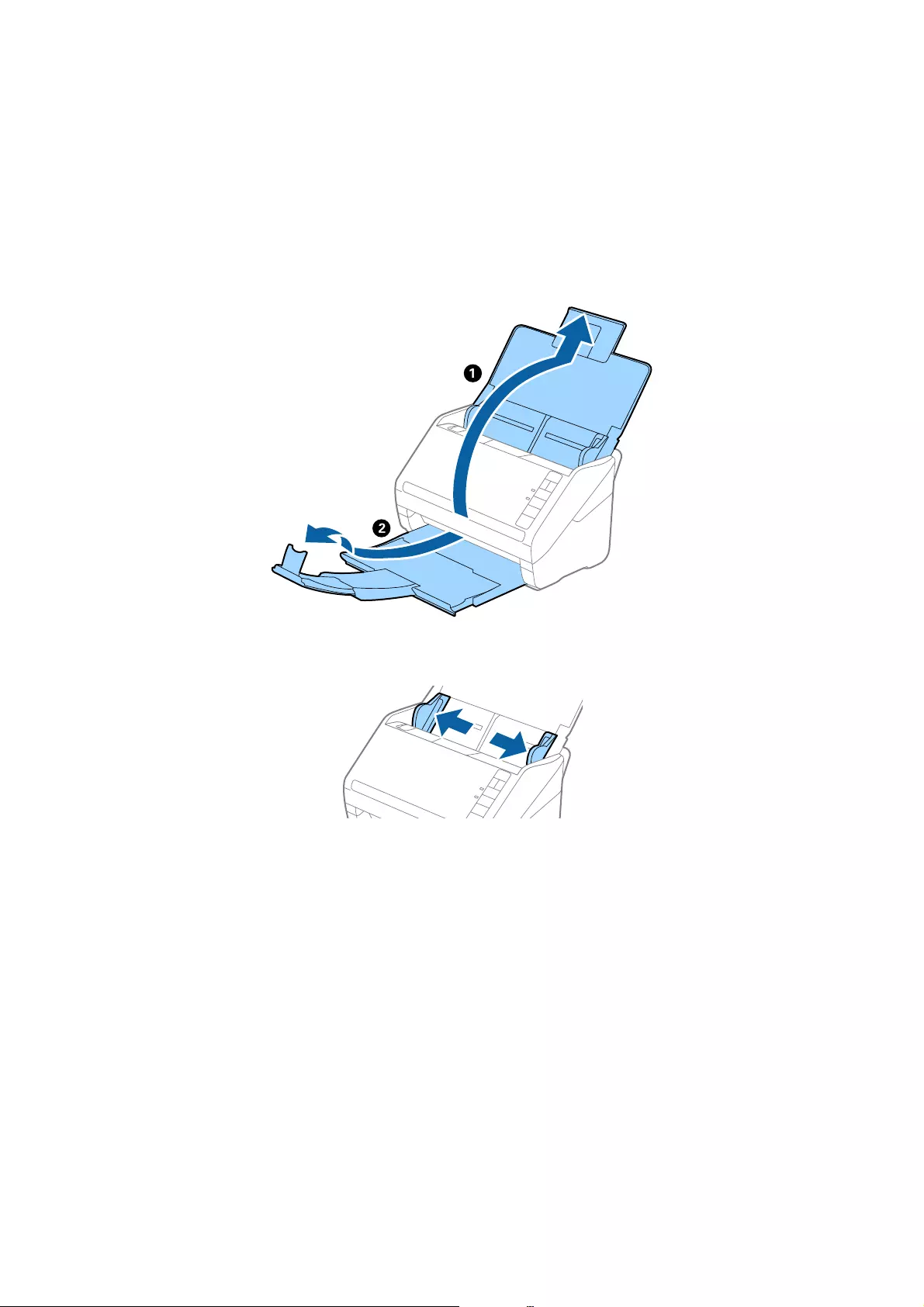
Placing a Mixture of Originals at Dierent Sizes
1. Open the input tray and extend the input tray extension. Slide out the output tray, extend the output tray
extension, and then raise the stopper.
Note:
If there are any thick originals amongst the originals, to stop the thick originals from bumping into the output tray and
falling out, store the output tray and do not use it to stack the ejected originals.
2. Slide the edge guides on the input tray all the way out.
User's Guide
Specications of Originals and Placing Originals
48
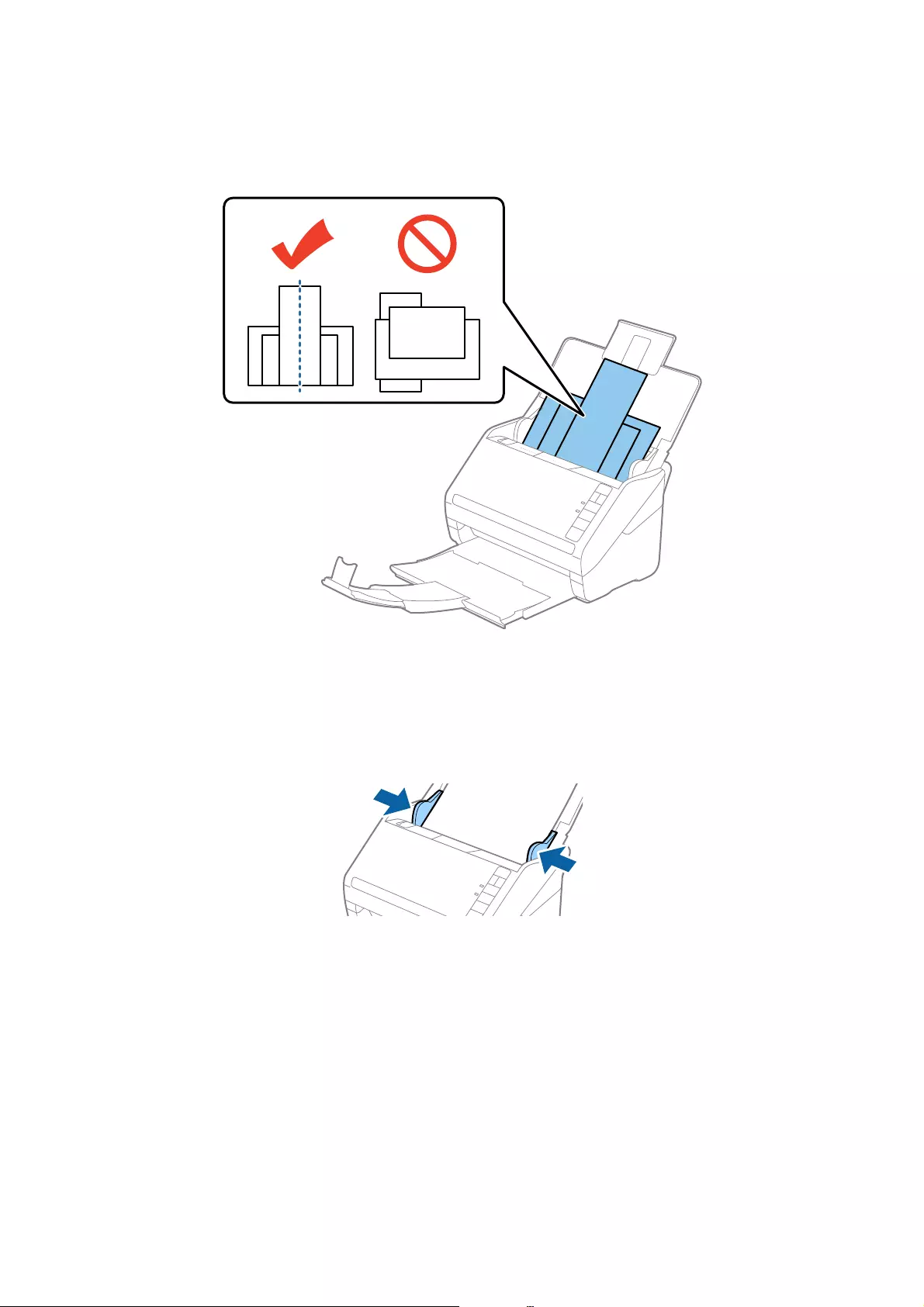
3. Load the originals at the center of the input tray in descending order of paper size with the widest at the back
and the narrowest at the front.
Note:
❏Load the originals into the input tray facing down and slightly displace the top edges at an angle facing into the ADF.
❏Slide the originals into the ADF until they meet resistance.
4. Slide the edge guides to t the edges of the widest original.
Related Information
&“Scanning Dierent Sizes or Types of Originals One by One (Automatic Feeding Mode)” on page 61
User's Guide
Specications of Originals and Placing Originals
49

Basic Scanning
Scanning Using Epson Scan 2
You can scan the originals using detailed settings that are suitable for text documents.
1. Place the original.
2. Start Epson Scan 2.
❏Win d ow s 1 0
Click the start button, and then select All apps > EPSON > Epson Scan 2.
❏Windows 8.1/Windows 8/Windows Server 2012 R2/Windows Server 2012
Enter the application name in the search charm, and then select the displayed icon.
❏Windows 7/Windows Vista/Windows XP/Windows Server 2008 R2/Windows Server 2008/Windows Server
2003 R2/Windows Server 2003
Click the start button, and select All Programs or Programs > EPSON > Epson Scan 2 > Epson Scan 2.
❏Mac OS X
Select Go > Applications > Epson Soware > Epson Scan 2.
User's Guide
Basic Scanning
50
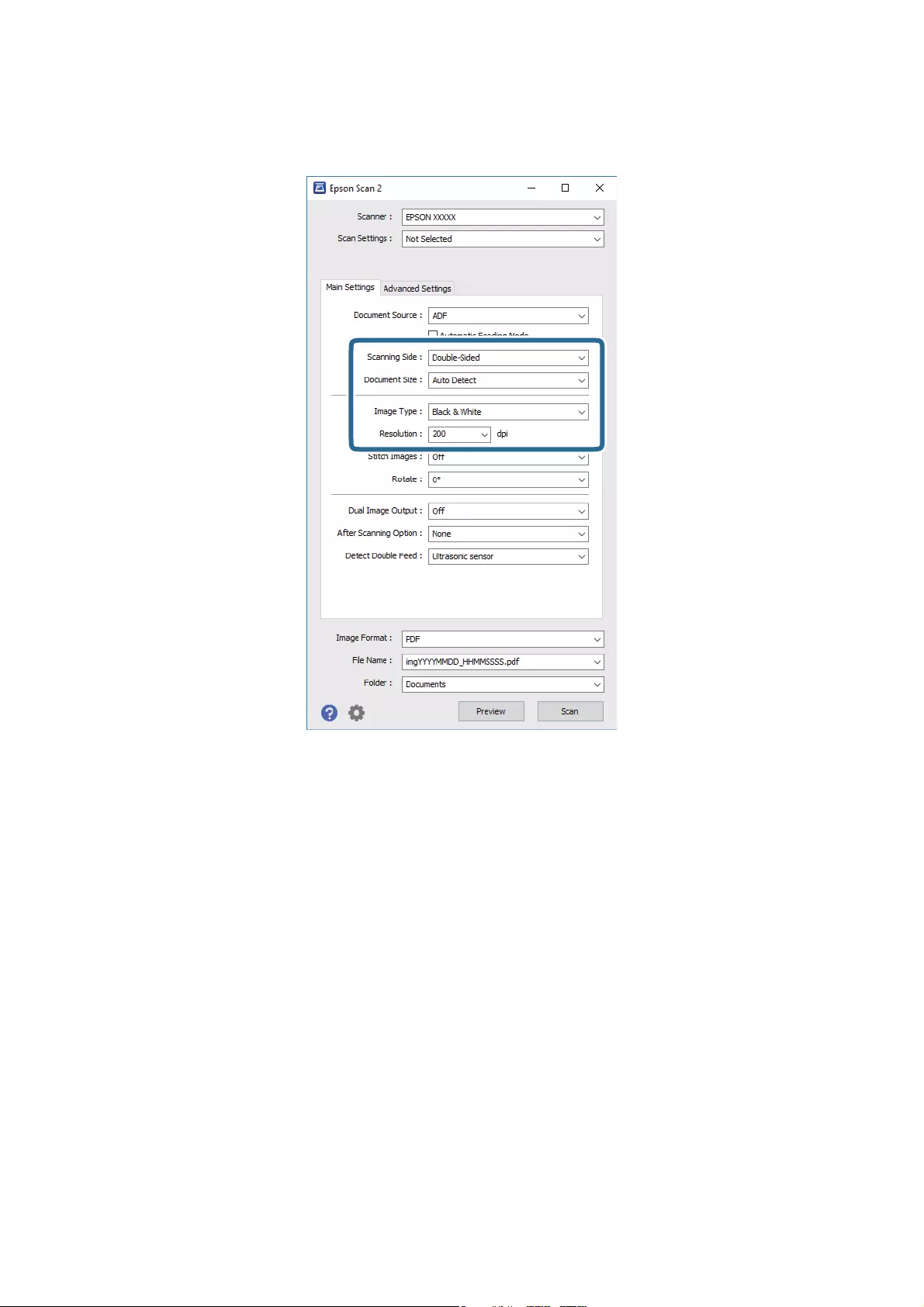
3. Make the following settings on the Main Settings tab.
❏Scanning Side: Select the side of the original you want to scan.
❏Document Size: Select the size of the original you placed.
❏Image Type: Select the color for saving the scanned image.
❏Resolution: Select the resolution.
Note:
ADF is set as the Document Source automatically.
4. Make other scan settings if necessary.
❏You can preview the scanned image by click the Preview button. e preview window opens, and the
previewed image is displayed.
A preview is generated, and the original is ejected from the ADF. Place the ejected original again.
User's Guide
Basic Scanning
51
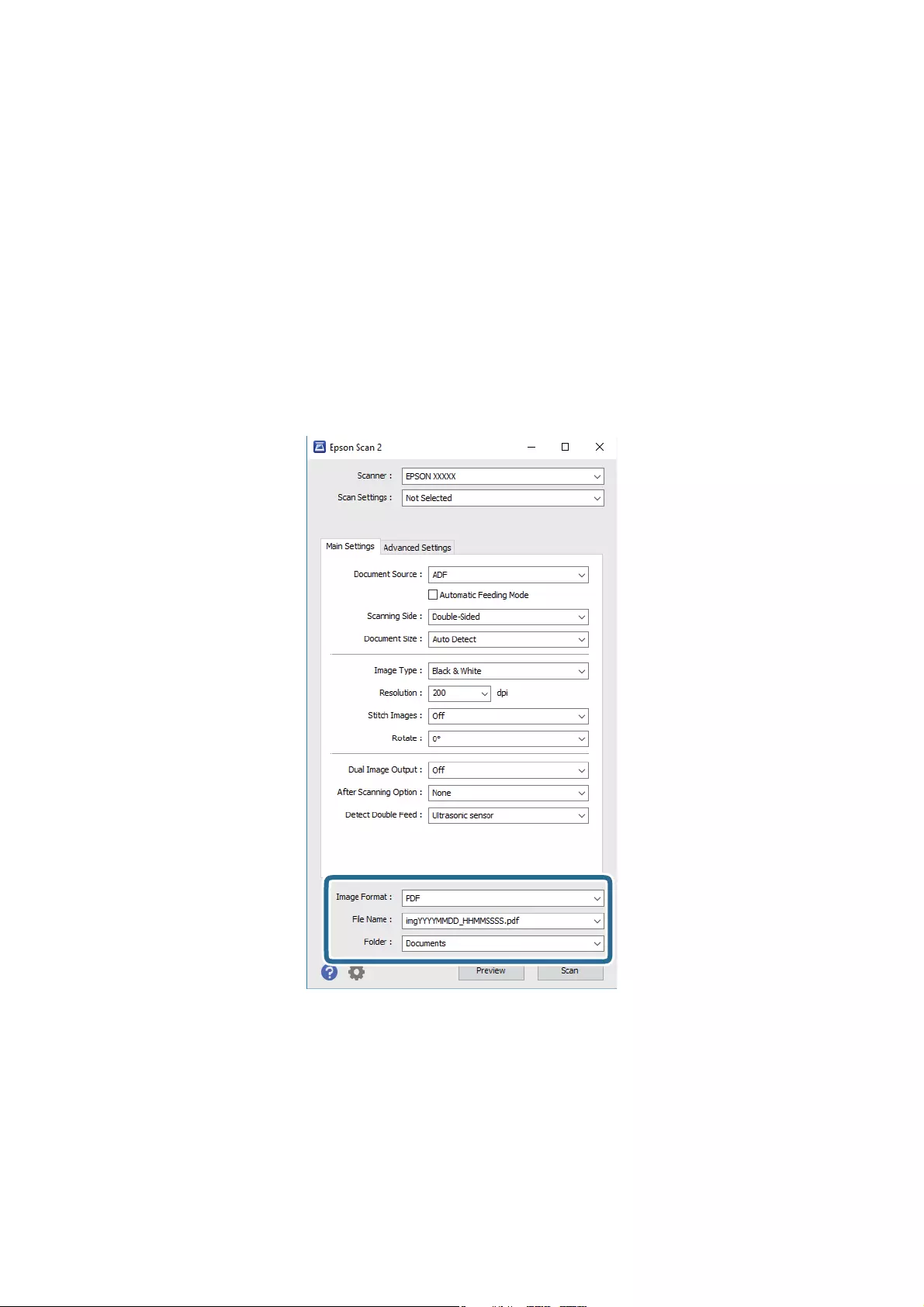
❏On the Advanced Settings tab, you can make image adjustments using detailed settings which are suitable
for text documents, such as the following.
❏Unsharp Mask: Select to enhance and sharpen the outlines of the image.
❏Descreening: Select to remove moiré patterns (web-like shadows) that appear when scanning printed
papers such as a magazine.
❏Text Enhancement: Select to make blurred letters in the original clear and sharp.
❏Auto Area Segmentation: Select to make letters clear and images smooth when performing black and
white scanning for a document that contains images.
Note:
Some items may not be available depending on other settings you made.
5. Set the le saving settings.
❏Image Format: Select the save format from the list.
You can make detailed settings for each save format except BITMAP and PNG. Aer selecting the save
format, select Options from the list.
❏File Name: Check the save le name displayed.
You can change settings for le name by selecting Settings from the list.
❏Folder: Select the save folder for the scanned image from the list.
You can select other folder or create a new folder by selecting Select from the list.
User's Guide
Basic Scanning
52
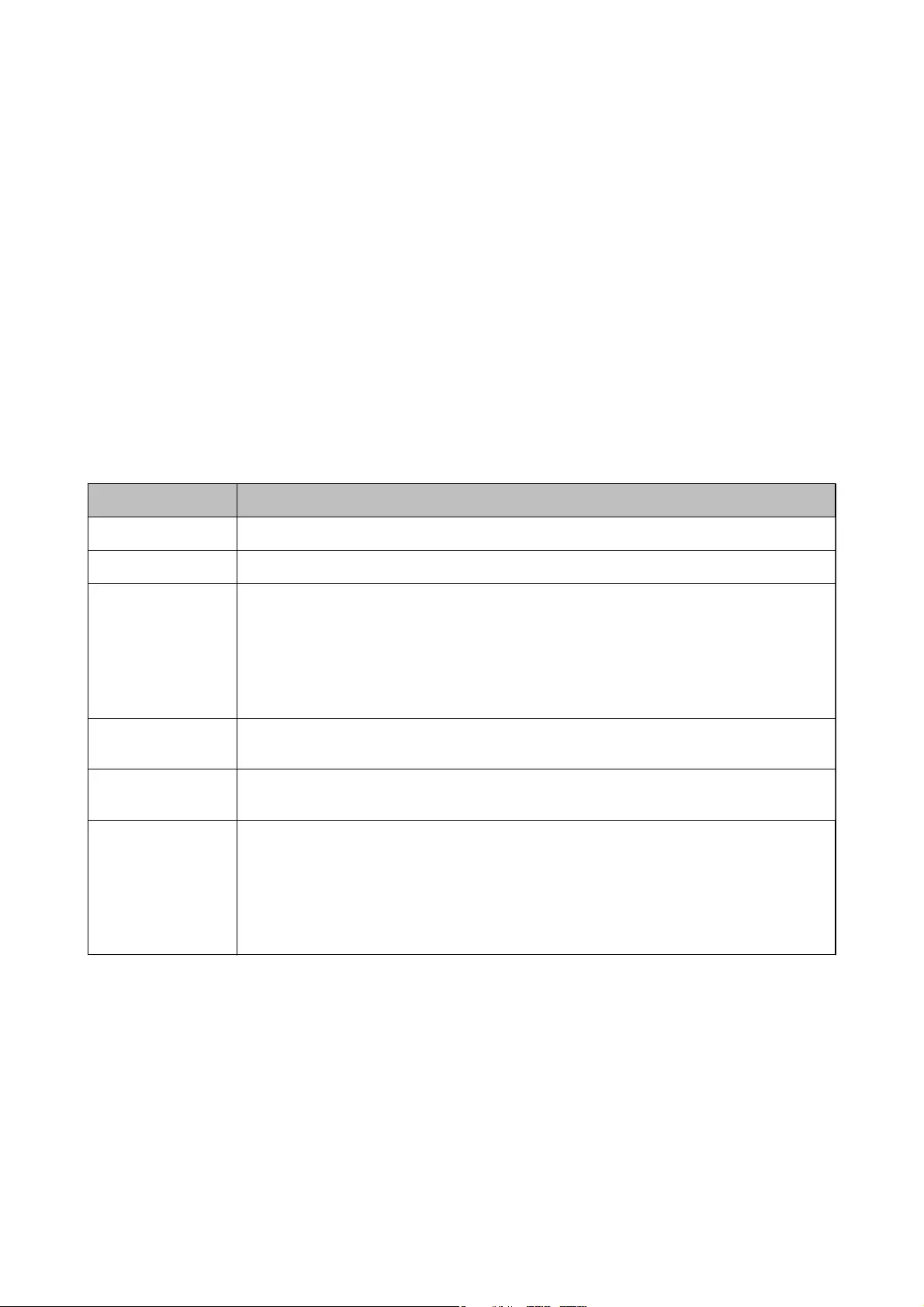
6. Click Scan.
e scanned image is saved to the folder you specied.
Related Information
&“Placing Originals” on page 23
&“Epson Scan 2” on page 14
&“Setting a Resolution at Suits the Scanning Purpose” on page 54
&“Image Adjustment Features” on page 62
&“Editing Scanned Pages Using Epson Scan 2” on page 69
Required Settings for Special Originals in Epson Scan 2
You need to set certain items on the Main Settings tab in Epson Scan 2 when scanning special originals.
Type of Original Required Settings
Envelopes Select O in Detect Double Feed.
Plastic cards Select Plastic Card (Landscape) on the Document Size list, or select O in Detect Double Feed.
Carrier Sheet ❏If you select Auto Detect from the Document Size list, paper skew in the original is
automatically corrected even if you select O in Correct Document Skew.
❏If you select a other size than Auto Detect from the Document Size list, you can only use
Contents Skew when using Correct Document Skew.
Paper Skew is not applied when this is selected. When you select Paper and Contents Skew,
only contents skew is corrected.
Large size originals If the size of the original you want to scan is not on the Document Size list, select Customize to
open the Document Size Settings window. Next, create the size manually on the window.
Long paper If the size is not listed on the Document Size list, select Auto Detect (Long Paper) or select
Customize to create a custom document size.
Laminated cards To scan transparent areas around the edges, select Customize on the Document Size list to open
the Document Size Settings window. Next, select Scan laminated card in the window.
Note:
e appropriate eect may not be achieved depending on the original. If transparent areas
around the edges are not scanned, select Customize from the Document Size list, and then
create the size manually.
Related Information
&“Placing Originals” on page 23
User's Guide
Basic Scanning
53
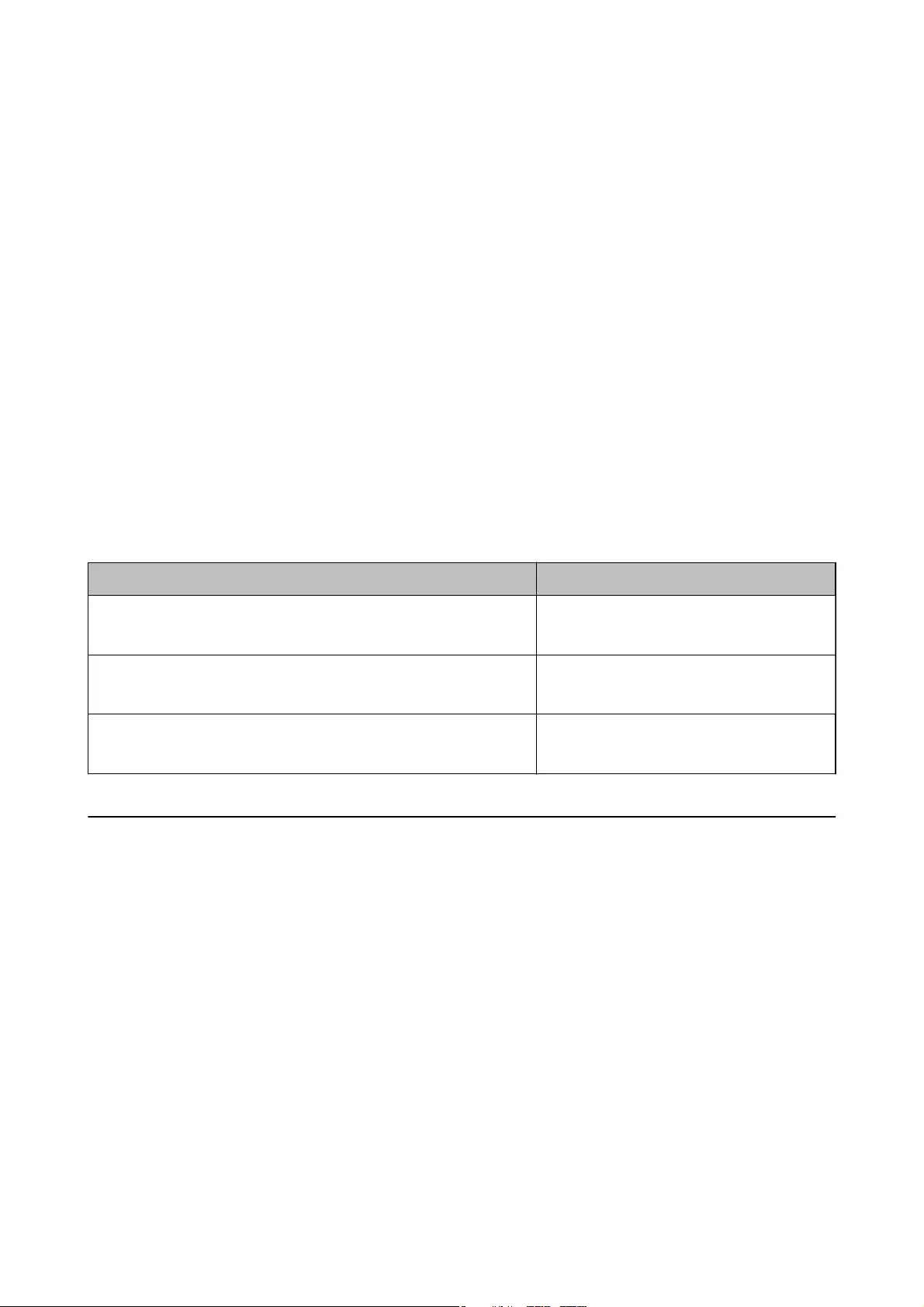
Setting a Resolution That Suits the Scanning Purpose
Advantages and Disadvantages of Increasing the Resolution
Resolution indicates the number of pixels (smallest area of an image) for each inch (25.4 mm), and is measured in
dpi (dots per inch). e advantage of increasing the resolution is that the details in the image become ne. e
disadvantage is that the le size becomes large.
❏File size becomes large
(When you double the resolution, the le size becomes about four times larger.)
❏Scanning, saving, and reading the image takes a long time
❏Sending and receiving emails or faxes takes a long time
❏e image becomes too large to t the display or print on the paper
List of Recommended Resolutions to Suit Your Purpose
See the table and set the appropriate resolution for the purpose of your scanned image.
Purpose Resolution (Reference)
Displaying on the screen
Sending by email
Up to 200 dpi
Using Optical Character Recognition (OCR)
Creating a text searchable PDF
200 to 300 dpi
Printing using a printer
Sending by fax
200 to 300 dpi
Scanning Using Document Capture Pro (Windows)
is application allows you to perform various tasks such as saving the image to your computer, sending it by
email, printing, and uploading to a server or a cloud service. You can also use a variety of methods to sort the
documents into separate les, such as detecting barcodes or characters on the pages. You can also register scanning
settings for a job to simplify scanning operations. See the help for details on Document Capture Pro.
1. Place the original.
2. Start Document Capture Pro.
❏Win d ow s 1 0
Click the start button, and then select All apps > Epson Soware > Document Capture Pro.
❏Windows 8.1/Windows 8
Enter the application name in the search charm, and then select the displayed icon.
❏Windows 7/Windows Vista/Windows XP
Click the start button, and then select All Programs or Programs > Epson Soware > Document Capture
Pro.
User's Guide
Basic Scanning
54
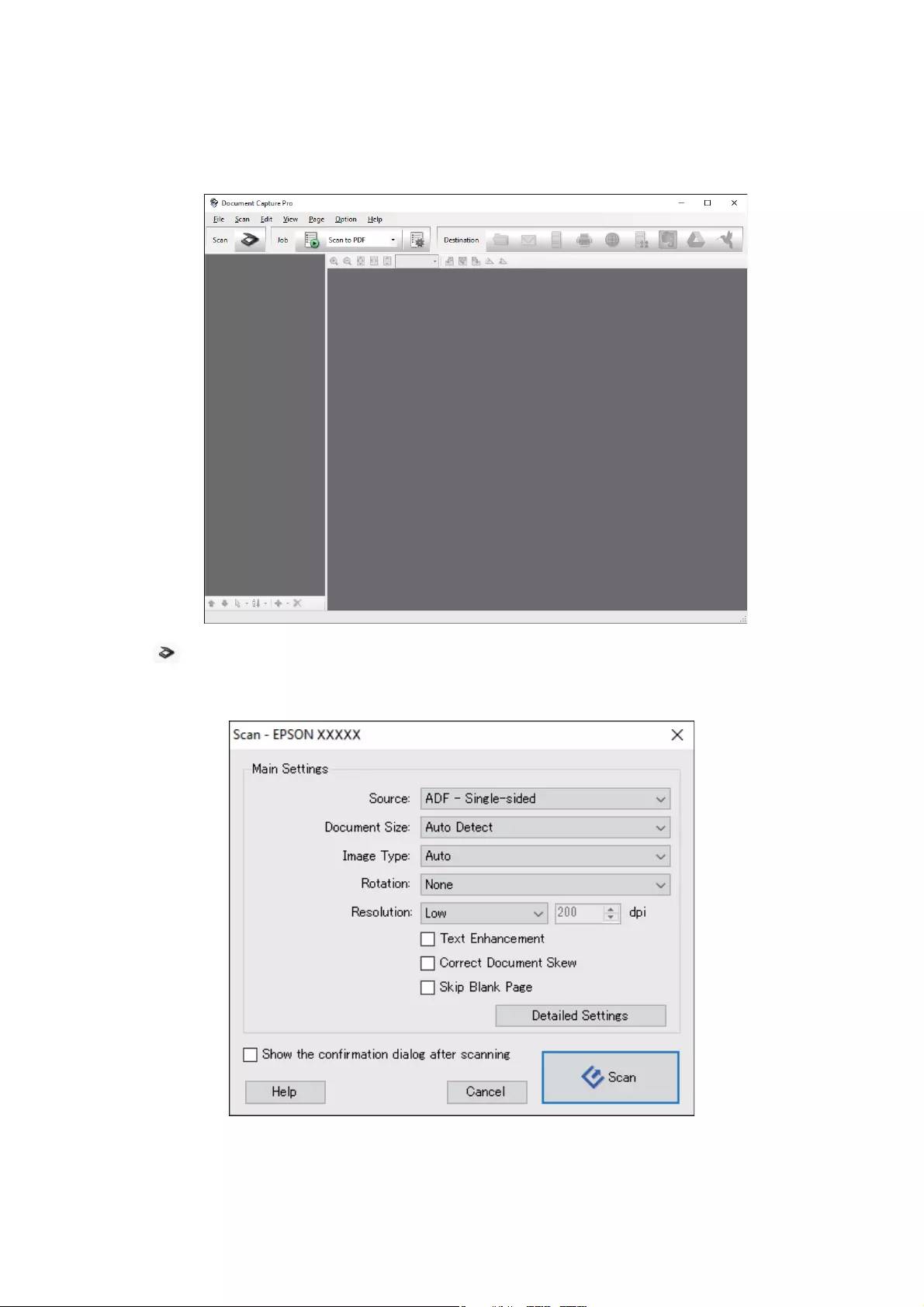
Note:
You may need to select the scanner you want to use from the scanners list.
3. Click .
e Scan window is displayed.
4. Make the following settings.
❏Source: Select the source where the original is placed.
User's Guide
Basic Scanning
55
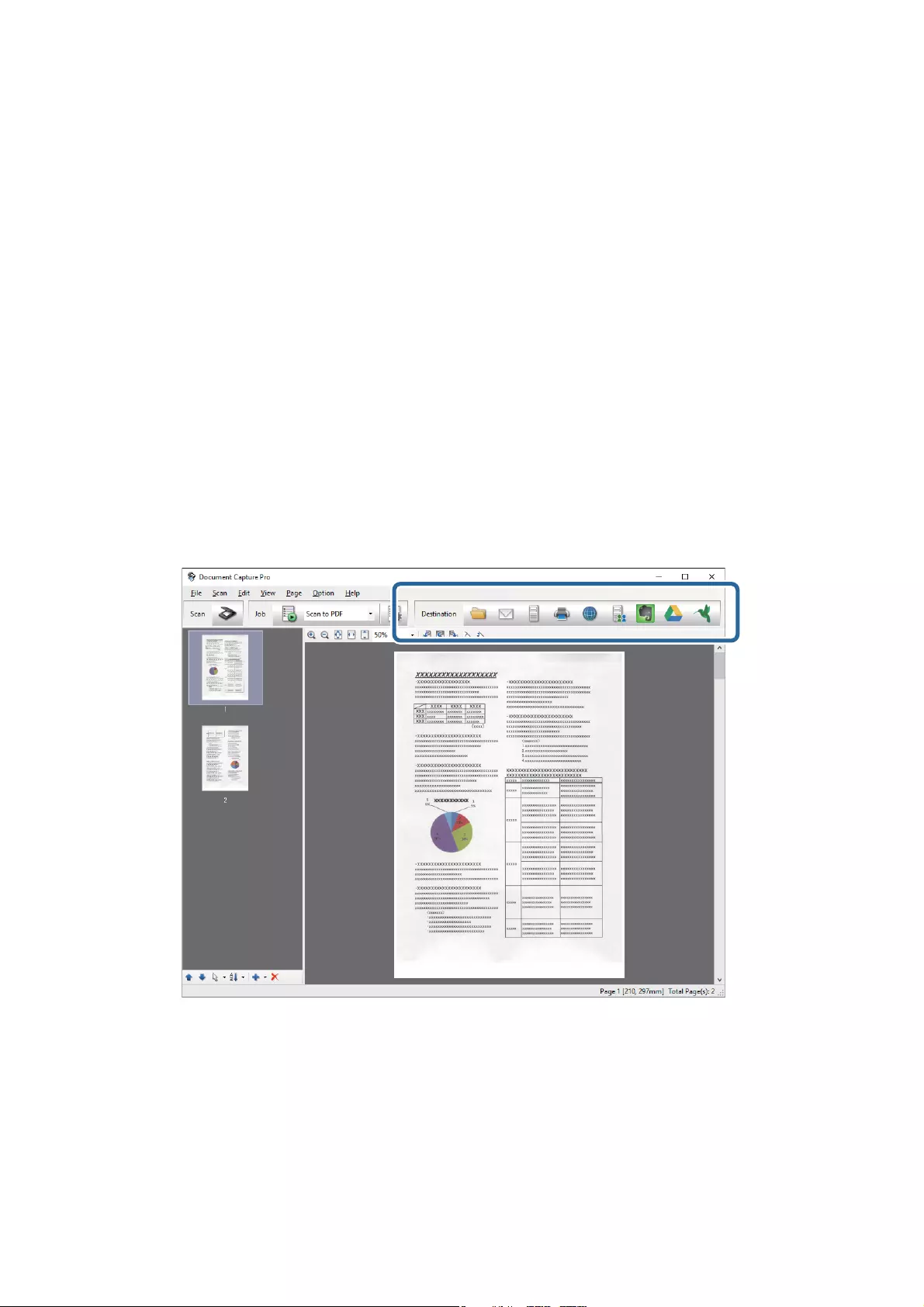
❏Document Size: Select the size of the original you placed.
❏Image Type: Select the color you want to use to save the scanned image.
❏Rotation: Select the rotation angle depending on the original you want to scan.
❏Resolution: Select the resolution.
Note:
You can also adjust the image using following items.
❏Text Enhancement: Select to make blurred letters in the original clear and sharp.
❏Correct Document Skew: Select to correct the slant of the original.
❏Skip Blank Page: Select to skip blank pages if there are any in the originals.
❏Detailed Settings button: Select to use Epson Scan 2 features to adjust scanned images.
5. Click Scan.
e scanned document is displayed in Document Capture Pro.
6. Check the scanned images, and edit them if necessary.
7. When you have nished checking the image, click one of the destination icons.
One of the following windows is displayed depending on the icon you selected; Batch Save, Transfer Settings,
or another window.
User's Guide
Basic Scanning
56

Note:
❏If you want to upload to a cloud service, you need to set up your account with the cloud service in advance.
❏If you want to use Evernote as the destination, download the Evernote application from the Evernote Corporation
Website and install it before using this feature.
❏On the Batch Save window or the Transfer Settings window, click File Name & Separation Settings, and then
select Apply job separation to sort the documents into separate les by using a variety of detection methods such as
barcodes or text in the scanned images.
8. Make settings for each item in the window, and then click Send or OK.
9. Follow the on-screen instructions.
e scanned image is saved to a folder, attached to an email, uploaded to a cloud service, and so on depending
on the function you selected.
Related Information
&“Placing Originals” on page 23
&“Document Capture Pro / Document Capture” on page 14
&“Setting a Resolution at Suits the Scanning Purpose” on page 54
Scanning Using Document Capture (Mac OS X)
is application allows you to perform various tasks such as saving the image to your computer, sending it by
email, printing, and uploading to a server or a cloud service. You can register scanning settings for a job to simplify
scanning operations. See the help for details on Document Capture.
Note:
Do not use the Fast User Switching function while using your scanner.
1. Place the original.
User's Guide
Basic Scanning
57
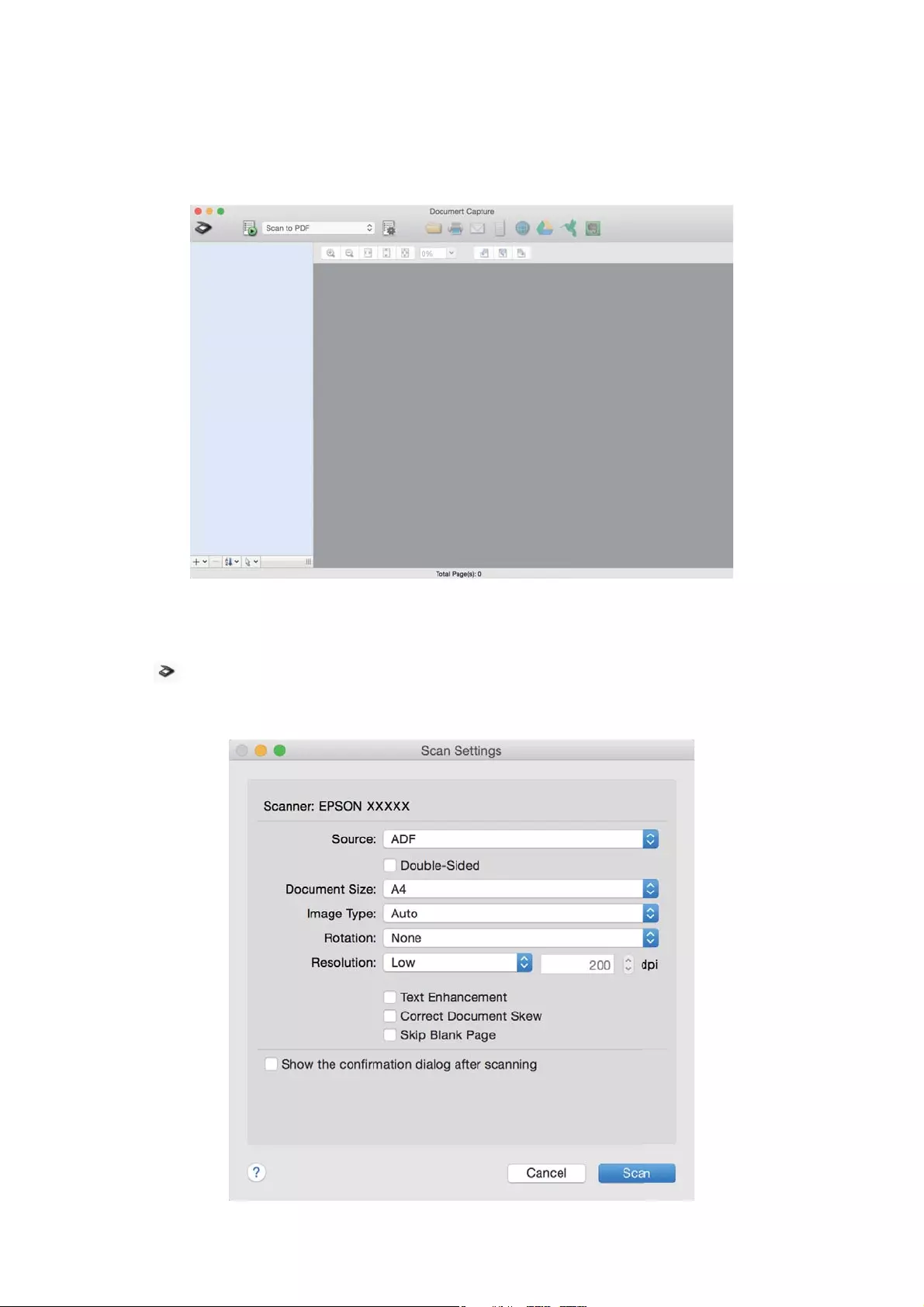
2. Start Document Capture.
Select Finder > Go > Applications > Epson Soware > Document Capture.
Note:
You may need to select the scanner you want to use from the scanners list.
3. Click .
e Scan Settings window is displayed.
User's Guide
Basic Scanning
58

4. Make the following settings.
❏Source: Select the source where the original is placed.
❏Document Size: Select the size of the original you placed.
❏Image Type: Select the color you want to use to save the scanned image.
❏Rotation: Select the rotation angle depending on the original you want to scan.
❏Resolution: Select the resolution.
Note:
You can also adjust the image using following items.
❏Text Enhancement: Select to make blurred letters in the original clear and sharp.
❏Correct Document Skew: Select to correct the slant of the original.
❏Skip Blank Page: Select to skip blank pages if there are any in the originals.
5. Click Scan.
e scanned document is displayed in Document Capture.
6. Check the scanned images, and edit them if necessary.
7. When you have nished checking the image, click one of the destination icons.
One of the transfer settings windows is displayed depending on the icon you selected.
Note:
❏If you want to upload to a cloud service, you need to set up your account with the cloud service in advance.
❏If you want to use Evernote as the destination, download the Evernote application from the Evernote Corporation
Website and install it before using this feature.
8. Make settings for each item in the window, and then click Send or OK.
9. Follow the on-screen instructions.
e scanned image is saved to a folder, attached to an email, uploaded to a cloud service, and so on depending
on the function you selected.
Related Information
&“Placing Originals” on page 23
&“Document Capture Pro / Document Capture” on page 14
&“Setting a Resolution at Suits the Scanning Purpose” on page 54
Scanning Using a Scanner Button
You can scan using the button on your scanner.
Note:
❏Make sure that Epson Scan 2 is installed on your computer and the scanner is connected to your computer correctly.
❏When Document Capture Pro (Windows) or Document Capture (Mac OS X) is installed on your computer, you can
assign the job to a button on the scanner and run the job by pressing it.
1. Place the original.
User's Guide
Basic Scanning
59

2. Press the
]
button.
Note:
When using Document Capture Pro (Windows) or Document Capture (Mac OS X), the product starts the job that was
assigned in the Job Settings window.
Related Information
&“Placing Originals” on page 23
&“Buttons” on page 12
&“Document Capture Pro / Document Capture” on page 14
&“Scanning Using Specied Scanning Settings (Job)” on page 75
User's Guide
Basic Scanning
60
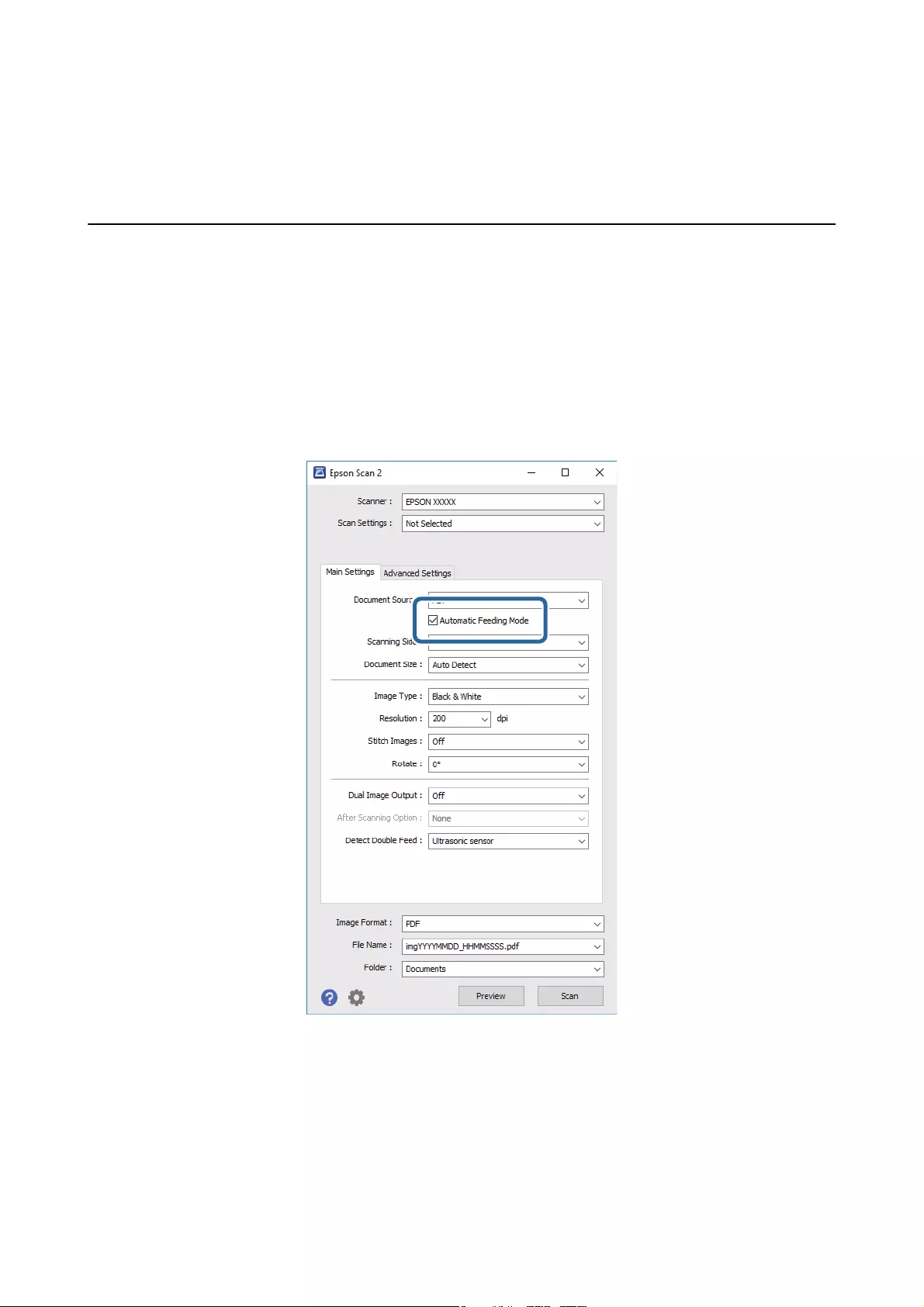
Advanced Scanning
Scanning Dierent Sizes or Types of Originals One by
One (Automatic Feeding Mode)
You can scan dierent sizes or types of originals one by one using Automatic Feeding Mode. In this mode, the
scanner starts scanning automatically when originals are loaded in the ADF.
1. Start Epson Scan 2.
2. Select Automatic Feeding Mode on the Main Settings tab.
3. Make other settings for scanning on the Epson Scan 2 main window.
4. Click Scan.
Automatic Feeding Mode starts.
User's Guide
Advanced Scanning
61
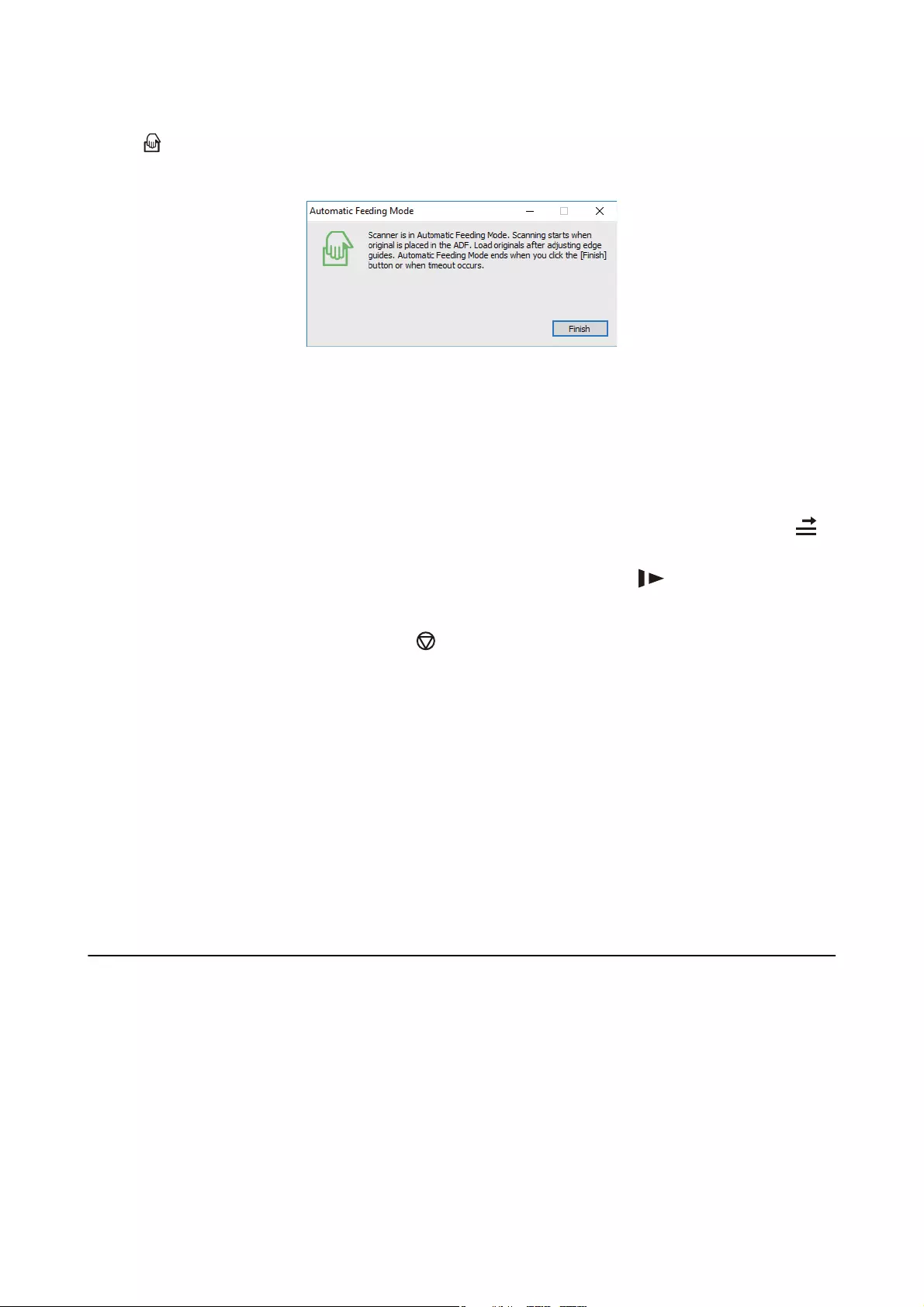
e light on the scanner turns on, and the Automatic Feeding Mode window is displayed on your
computer.
5. Adjust the edge guides, and then place the original in the ADF.
Scanning starts automatically.
6. Aer scanning stops, place the next original in the ADF.
Repeat this procedure until you have scanned all originals.
Note:
❏If you want to scan originals that are detected as double feeds, for example plastic cards or envelopes, press the
button before placing the original to skip double feed detection.
❏If you want to scan originals that are likely to jam, for example thin paper, press the button before placing the
original to slow down the scanning speed.
7. Aer you have scanned all originals, press the button on the scanner to close Automatic Feeding Mode.
Note:
❏You can also close Automatic Feeding Mode by pressing Finish on the Automatic Feeding Mode window displayed
on your computer.
❏You can make timeout settings to nish Automatic Feeding Mode.
Select Settings on the Document Source list to open the Document Source Settings window. Set Automatic Feeding
Mode Timeout (minutes) on the window.
e scanned image is saved to the folder you specied.
Related Information
&“Placing Originals” on page 23
Creating Scanned Images to Suit Your Needs
Image Adjustment Features
You can adjust scanned images using the features on the Advanced Settings tab in Epson Scan 2.
Except for a few features, you can check the adjustment results in the preview window.
User's Guide
Advanced Scanning
62
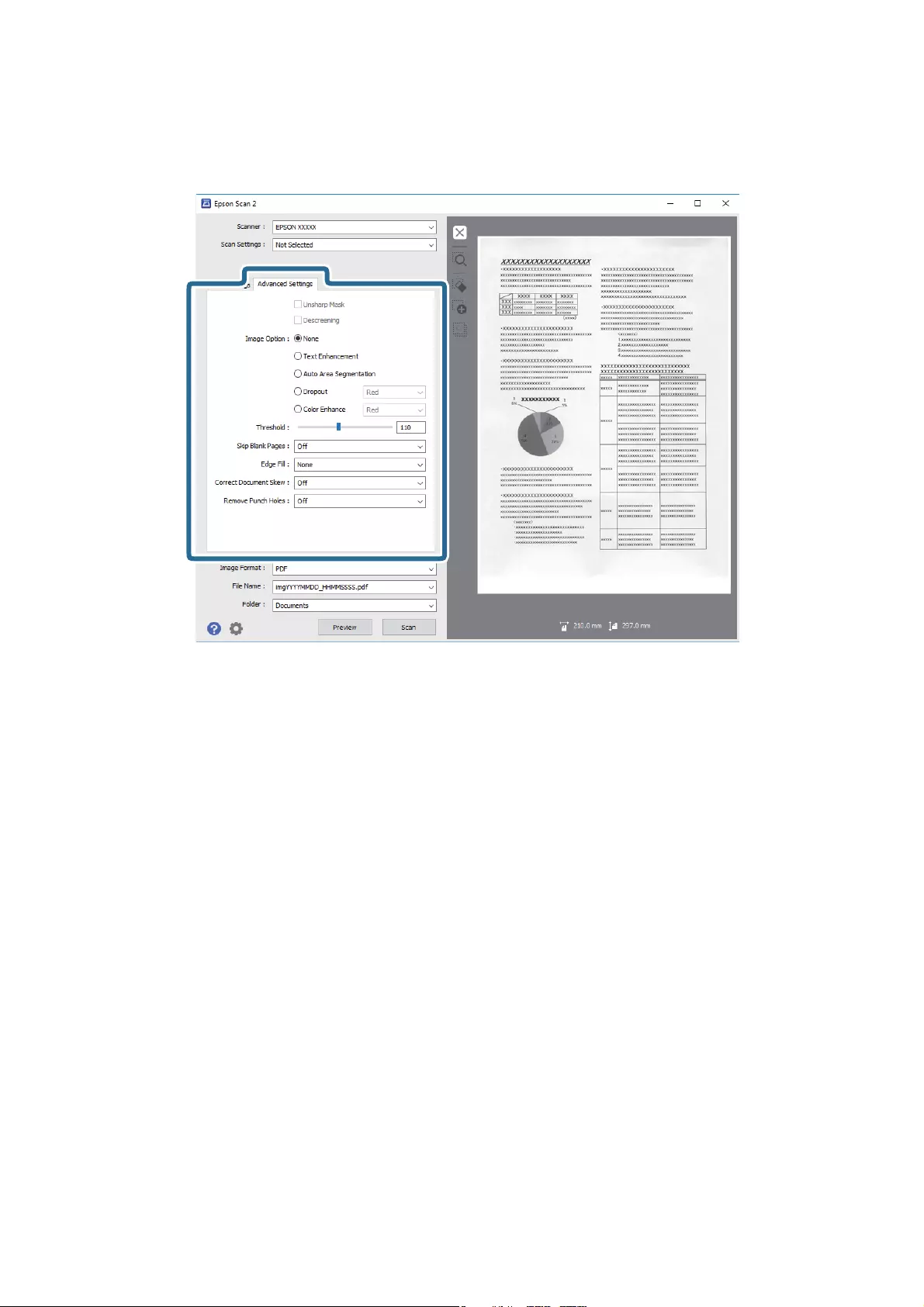
Note:
Some items may not be available depending on other settings you made.
Related Information
&“Unsharp Mask” on page 64
You can enhance and sharpen the outlines of the image.
&“Descreening” on page 64
You can remove moiré patterns (web-like shadows) that appear when scanning printed paper such as a
magazine.
&“Text Enhancement” on page 65
You can make blurred letters in the original clear and sharp. You can also reduce the oset or unevenness of the
background.
&“Auto Area Segmentation” on page 65
You can make letters clear and images smooth when performing black and white scanning for a document that
contains images.
&“Dropout” on page 65
You can remove the color specied from the scanned image, and then save it in grayscale or black and white. For
example, you can erase marks or notes you wrote in the margins with color pen when scanning.
&“Color Enhance” on page 66
You can enhance the color specied for the scanned image, and then save it in grayscale or black and white. For
example, you can enhance letters or lines that are in light colors.
&“Brightness” on page 66
You can adjust the brightness for the whole image.
&“Contrast” on page 66
You can adjust the contrast for the whole image. If you increase the contrast, the bright areas become brighter,
and the dark areas become darker. On the other hand, if you lower the contrast, the dierences between the
bright and dark areas of the image are less dened.
&“Gamma” on page 67
User's Guide
Advanced Scanning
63
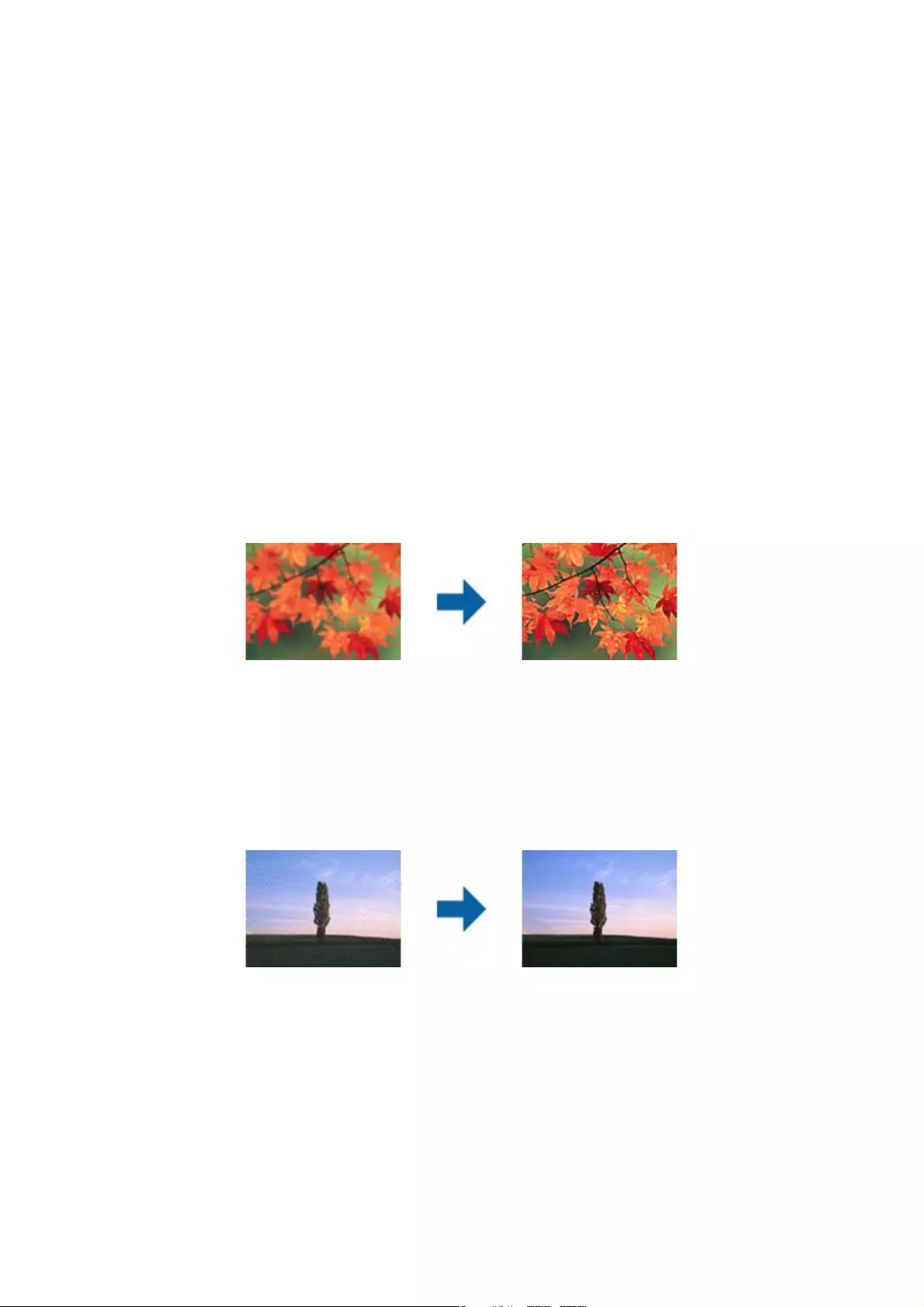
You can adjust the gamma (brightness of the intermediate range) for the whole image. If the image is too light or
too dark, you can adjust the brightness.
&“reshold” on page 67
You can adjust the border for monochrome binary (black and white). Increase the threshold, the black color area
becomes larger. Decrease the threshold, the white color area becomes larger.
&“Skip Blank Pages” on page 67
You can skip blank pages if there are any in the originals.
&“Edge Fill” on page 68
You can remove the shadow created around the scanned image.
&“Correct Document Skew” on page 68
You can correct the slant of the original.
&“Remove Punch Holes” on page 69
You can remove the shadows of holes on the scanned image when scanning originals with punched holes.
Unsharp Mask
You can enhance and sharpen the outlines of the image.
Note:
is feature is not available when selecting the Main Settings tab > Image Type > Black & White.
Descreening
You can remove moiré patterns (web-like shadows) that appear when scanning printed paper such as a magazine.
To check for moiré patterns, display the image at 100 % (1:1). If the displayed image is zoomed out, the image
appears rough and may look like it has moiré patterns.
Note:
❏To use this feature, set the Resolution on the Main Settings tab to 600 dpi or less.
❏is feature is not available when selecting the Main Settings tab > Image Type > Black & White.
❏e eect of this feature cannot be checked in the preview window.
❏is feature soens the sharpness of the scanned image.
User's Guide
Advanced Scanning
64
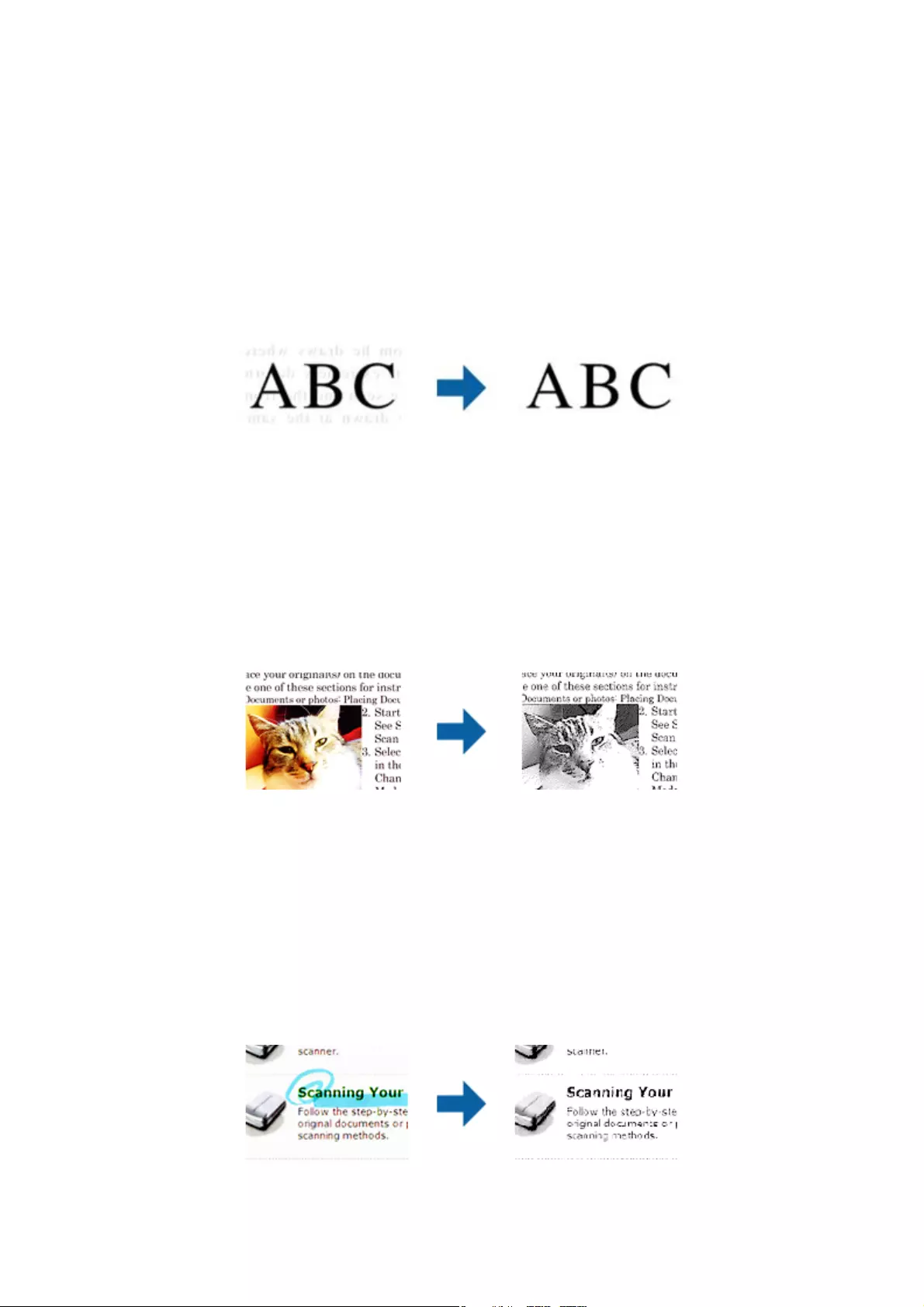
Image Option
You can select the eect for the scanned image.
Text Enhancement
You can make blurred letters in the original clear and sharp. You can also reduce the oset or unevenness of the
background.
You can select the level of the eect when selecting the Main Settings tab > Image Type > Color or Grayscale.
Note:
To use this feature, set the Resolution on the Main Settings tab to 600 dpi or less.
Auto Area Segmentation
You can make letters clear and images smooth when performing black and white scanning for a document that
contains images.
You can adjust the quality of the image part of the original from Brightness and Contrast.
Note:
❏You can only make settings for this feature when selecting the Main Settings tab > Image Type > Black & White.
❏To use this feature, set the Resolution on the Main Settings tab to 600 dpi or less.
Dropout
You can remove the color specied from the scanned image, and then save it in grayscale or black and white. For
example, you can erase marks or notes you wrote in the margins with color pen when scanning.
User's Guide
Advanced Scanning
65
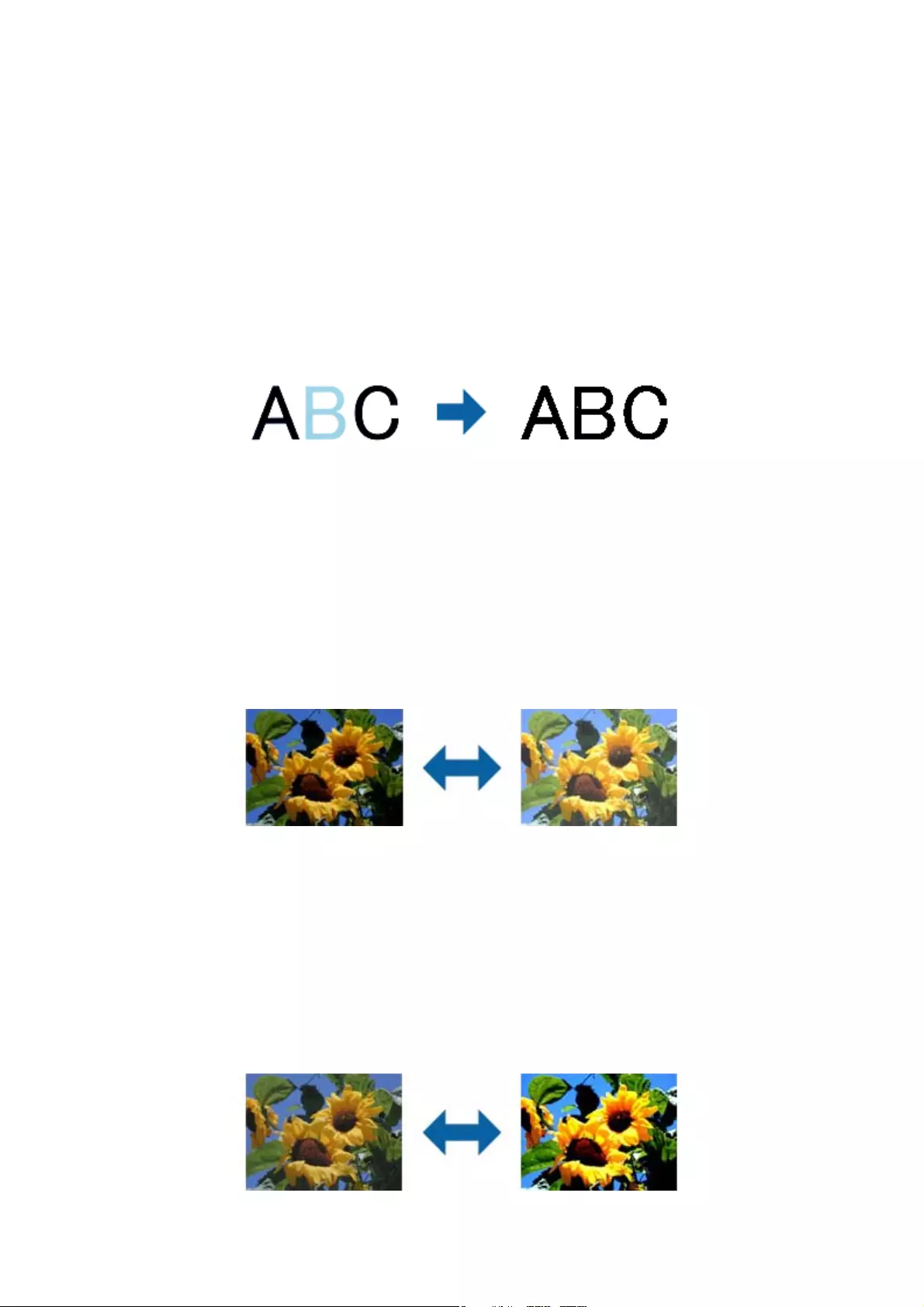
If you select Customize from the color list in Dropout, you can make settings for the color you want to remove
while checking the preview window (for Windows only).
Note:
is feature is not available when selecting the Main Settings tab > Image Type > Auto or Color.
Color Enhance
You can enhance the color specied for the scanned image, and then save it in grayscale or black and white. For
example, you can enhance letters or lines that are in light colors.
If you select Customize from the color list in Color Enhance, you can make settings for the color you want to
enhance while checking the preview window (for Windows only).
Note:
is feature is not available when selecting the Main Settings tab > Image Type > Auto or Color.
Brightness
You can adjust the brightness for the whole image.
Note:
is feature is not available depending on the settings on the Main Settings tab > Image Type or the settings on the
Advanced Settings tab.
Contrast
You can adjust the contrast for the whole image. If you increase the contrast, the bright areas become brighter, and
the dark areas become darker. On the other hand, if you lower the contrast, the dierences between the bright and
dark areas of the image are less dened.
User's Guide
Advanced Scanning
66
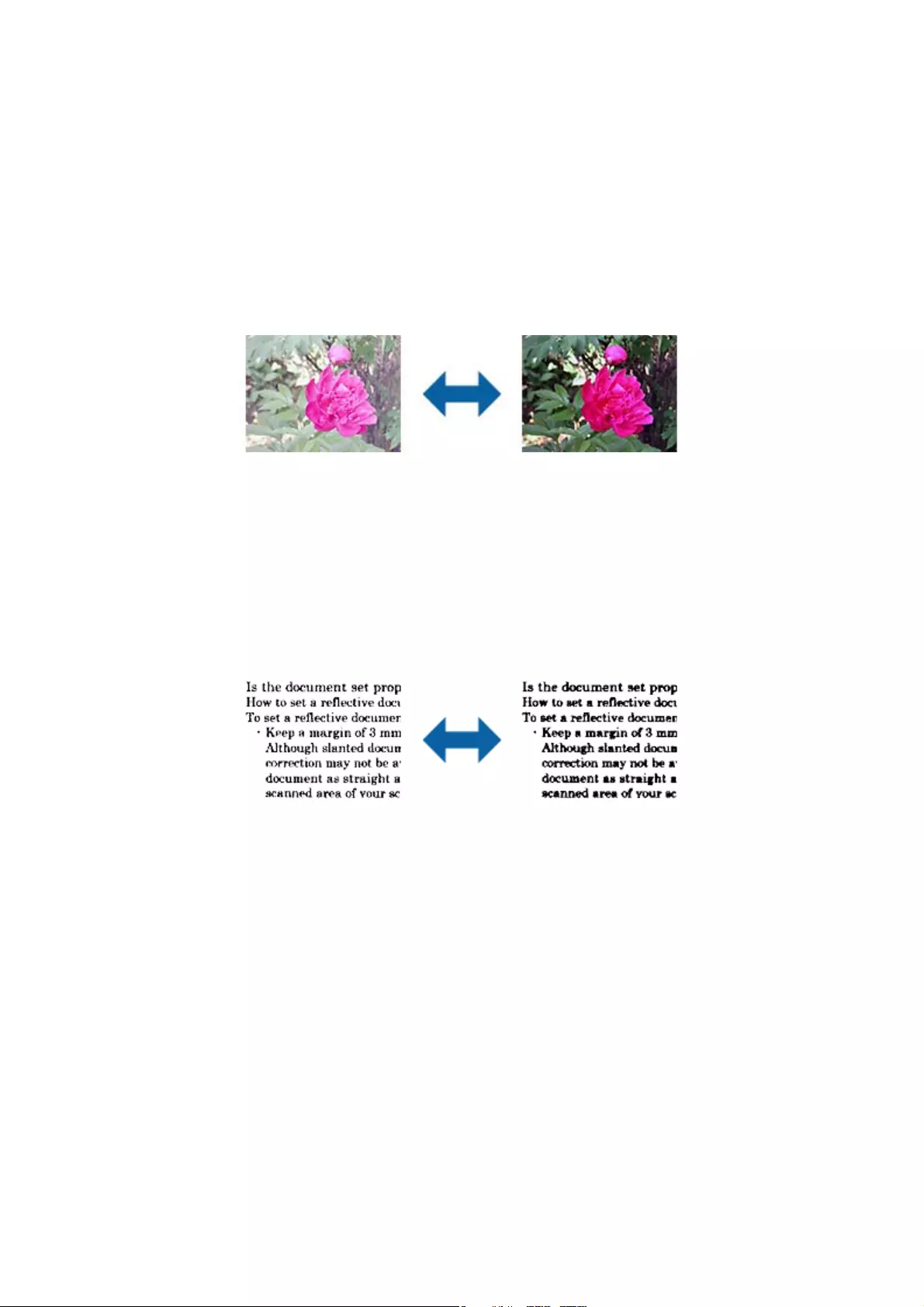
Note:
is feature is not available depending on the settings on the Main Settings tab > Image Type or the settings on the
Advanced Settings tab.
Gamma
You can adjust the gamma (brightness of the intermediate range) for the whole image. If the image is too light or
too dark, you can adjust the brightness.
Note:
is feature is not available depending on the settings on the Main Settings tab > Image Type or the settings on the
Advanced Settings tab.
Threshold
You can adjust the border for monochrome binary (black and white). Increase the threshold, the black color area
becomes larger. Decrease the threshold, the white color area becomes larger.
Note:
is feature may not be available depending on the settings on the Main Settings tab > Image Type or the settings on the
Advanced Settings tab.
Skip Blank Pages
You can skip blank pages if there are any in the originals.
You can select the amount of blank page detection. If you set this to a high level, you can skip any originals with
light colors or oset as blank pages.
If the result is not what you expected, select Skip Blank Pages > Settings, and then adjust User Dened Level.
Select again Skip Blank Pages > User Dened Level.
Note:
❏Some pages may be incorrectly skipped as blank pages.
❏is feature is not available when scanning double-sided originals that are stitched.
User's Guide
Advanced Scanning
67
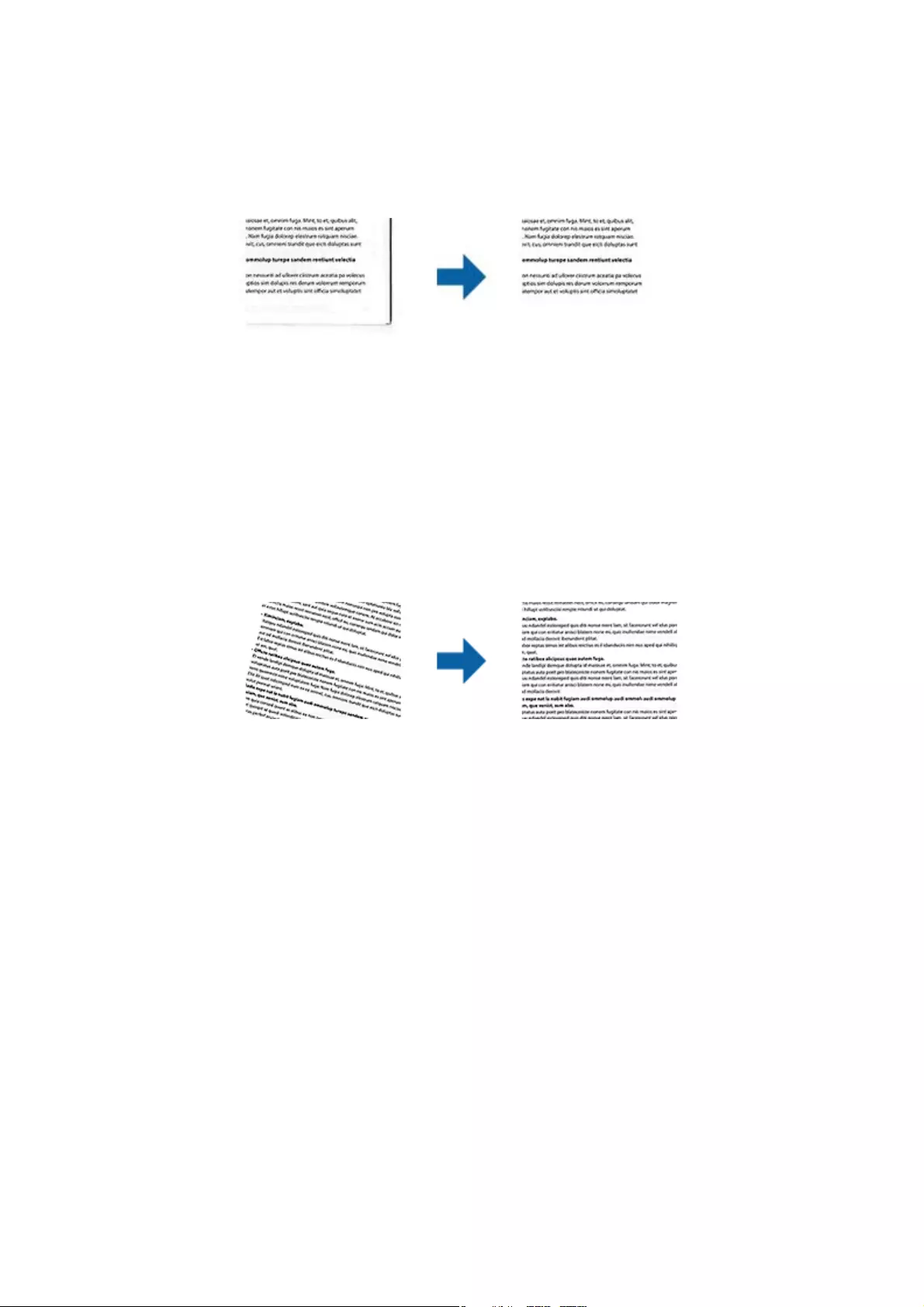
Edge Fill
You can remove the shadow created around the scanned image.
For double-sided scanning, the settings for the edge ll range are mirror-reversed for the back of the original.
If you select Settings, the Edge Fill Level screen is displayed, and you can adjust the edge ll ranges for the top,
bottom, le, and right.
Note:
e eect of this feature cannot be checked in the preview window.
Correct Document Skew
You can correct the slant of the original.
O
e slant of the original is not corrected.
Paper Skew
Corrects the slant of originals that are fed askew.
Contents Skew
Corrects the slant of the content of the original that was printed at an angle and so on.
Paper and Contents Skew
Corrects the slant of the original that is fed askew as well as the content of the original.
Note:
❏When using this feature, areas that are fed askew are corrected using white.
❏To use this feature, set the Resolution on the Main Settings tab to 600 dpi or less.
❏is feature may not be able to correct documents that have been over skewed.
❏e eect of this feature cannot be checked in the preview window.
User's Guide
Advanced Scanning
68
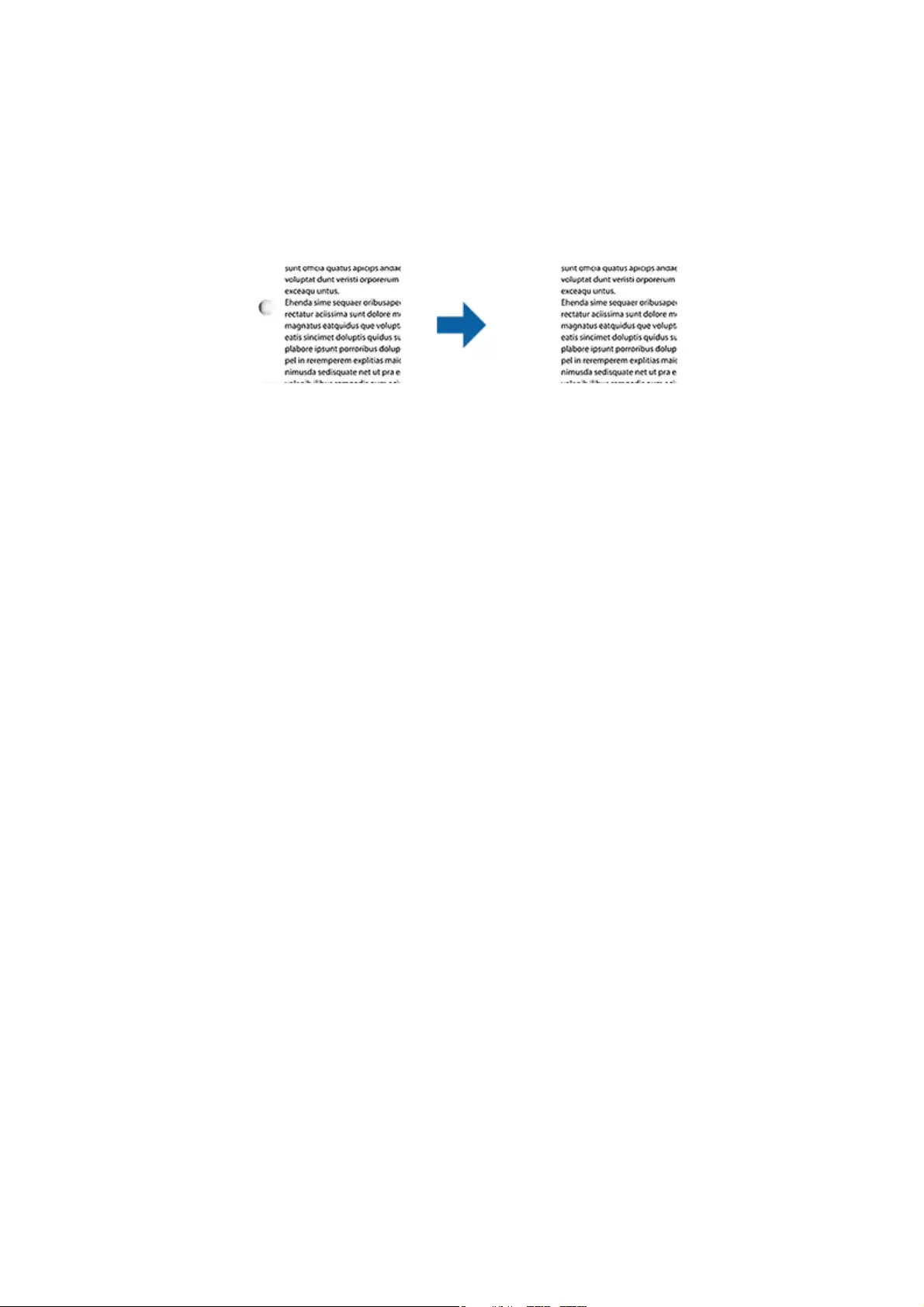
Remove Punch Holes
You can remove the shadows of holes on the scanned image when scanning originals with punched holes.
You can remove the shadows of round or square punch holes that are within a range of 20 mm (0.79 in.) from the
edges of the original.
Note:
❏is feature is only available when you are scanning white or light colored originals.
❏Depending on the scanned originals, the shadows of the punch holes may not be removed.
❏e eect of this feature cannot be checked in the preview window.
Editing Scanned Pages Using Epson Scan 2
You can edit pages of scanned images using the features on the Main Settings tab in Epson Scan 2.
Stitch Images
You can stitch the images on the front and rear when scanning both sides of the original. Select the layout for
stitching the images.
Note:
is feature is available when you have selected Double-Sided in Scanning Side.
Rotate
You can rotate the original clockwise and scan it. Select the rotation angle depending on the original you want to
scan.
Note:
If you select Auto and scan the original, the image is rotated by detecting the orientation of the text information. However,
this may take some time depending on the image size, and so on.
Auto is only available if the EPSON Scan OCR component (Windows) or EPSON Scan 2 OCR component (Mac OS X) is
installed.
Saving as a Searchable PDF
You can save the scanned image as a Searchable PDF. is is a PDF in which searchable text data is embedded.
User's Guide
Advanced Scanning
69

Note:
❏Text on the originals is recognized using Optical Character Recognition (OCR), and then embedded in the scanned
image.
❏is feature is only available when the EPSON Scan OCR component (Windows) or Epson Scan 2 OCR component (Mac
OS X) is installed.
1. Place the original.
2. Start Epson Scan 2.
3. Make settings for each item on the Main Settings tab.
4. Click Preview.
5. Place the ejected original again when using the ADF.
6. Check the preview, and make other settings on the Advanced Settings tab if necessary.
7. Select Searchable PDF from the Image Format list.
8. Select Options from the Image Format list to open the Image Format Options window.
9. Select the Text tab on the Image Format Options window.
10. Check that the language of the original is selected in the Text L anguage list.
11. Click OK to close the Image Format Options window.
12. Check the save le name displayed in File Name.
13. Select the save folder for the scanned image from the Folder list.
14. Click Scan.
e scanned image is saved as a Searchable PDF.
Related Information
&“Scanning Using Epson Scan 2” on page 50
&“Placing Originals” on page 23
&“Text is Not Recognized Correctly when Saving as a Searchable PDF” on page 108
Saving as an Oce Format File (for Windows Only)
You can save the scanned image as a Microso® Oce format le using Document Capture Pro.
You can select the following formats.
❏Microso® Word (.docx)
❏Microso® Excel® (.xlsx)
❏Microso® PowerPoint® (.pptx)
Note:
is feature is only available when the EPSON Scan OCR component is installed.
User's Guide
Advanced Scanning
70
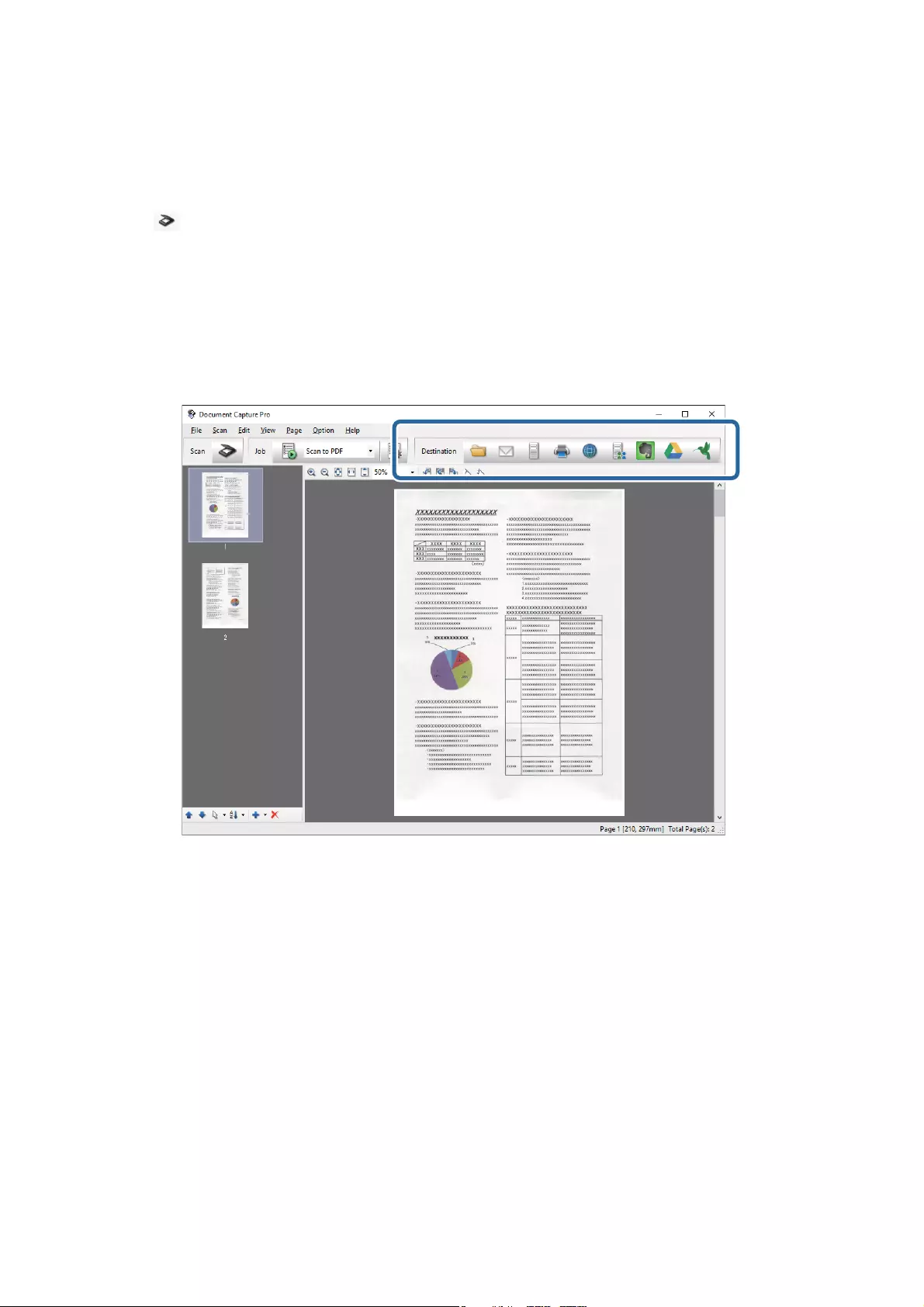
1. Place the original.
2. Start Document Capture Pro.
3. Click .
e Scan window is displayed.
4. Make the scanning settings, and then click Scan.
5. Check the scanned images, and edit them if necessary.
6. When you have nished checking the image, click one of the destination icons.
e Batch Save, Transfer Settings, or another window opens.
7. Select the Oce format le you want to save as from the File Type list.
8. Click Options to display the Detailed Settings window.
9. Make settings for each item, and then click OK to close the Detailed Settings window.
10. Make other settings if necessary, and then click Send or OK.
e scanned image is saved as an Oce format le.
Related Information
&“Scanning Using Document Capture Pro (Windows)” on page 54
&“Placing Originals” on page 23
User's Guide
Advanced Scanning
71
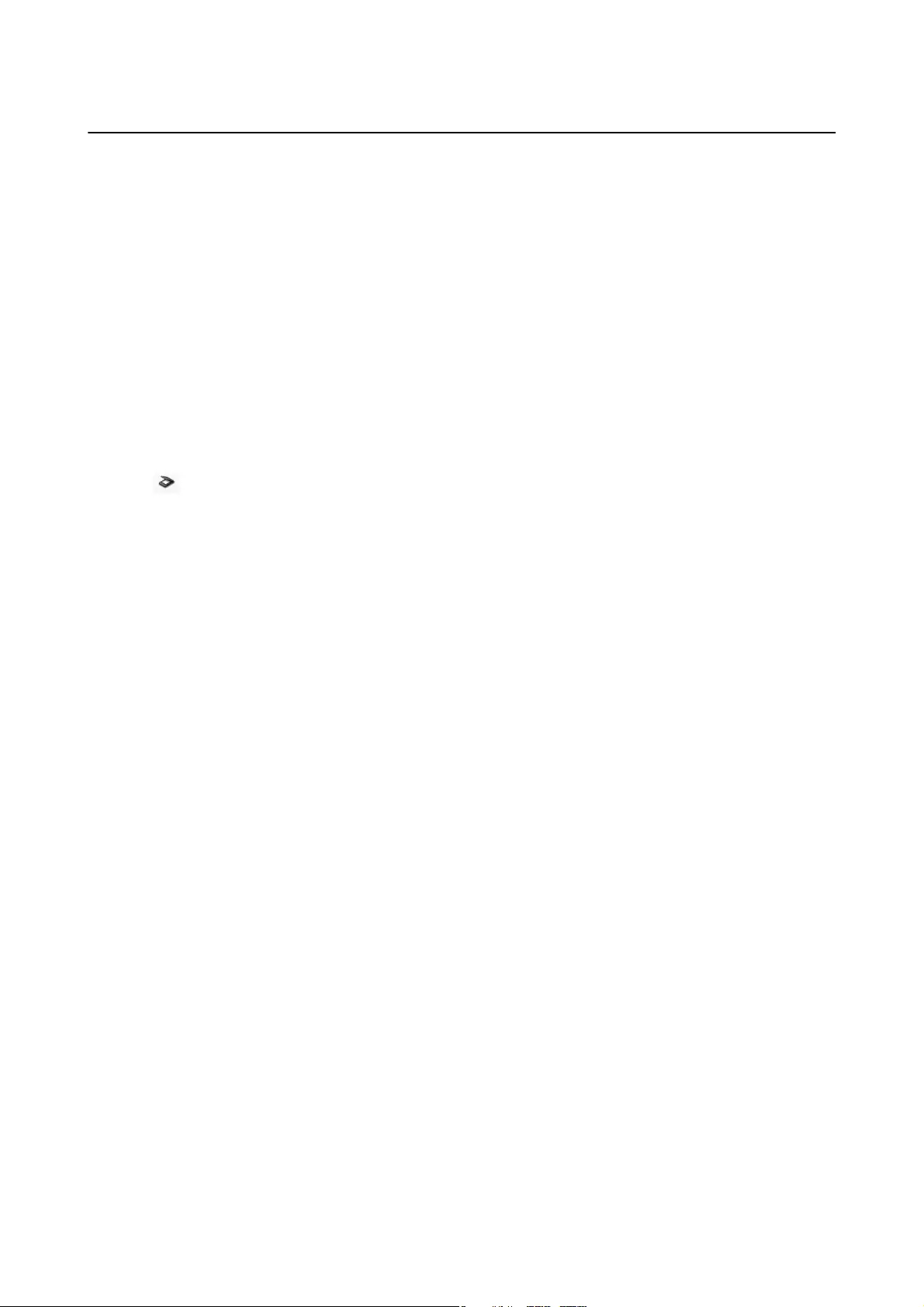
Various Types of Saving and Transferring
Sorting and Saving Scanned Images into a Separate Folder (for
Windows Only)
You can sort scanned images automatically and save them to a separate folder using Document Capture Pro.
To sort scanned images, you can use a variety of detection methods such as blank pages inserted between the
originals or barcodes on the originals.
1. Place the originals including indicators, such as blank pages, between the pages where you want to separate the
scanned images.
2. Start Document Capture Pro.
3. Click .
e Scan window is displayed.
4. Make the scanning settings, and then click Scan.
5. Check the scanned images, and edit them if necessary.
6. When you have nished checking the image, select the destination.
e Batch Save window or the Transfer Settings window is displayed.
7. Click File Name & Separation Settings.
8. Select Apply job separation, and then click Separation Settings.
9. Select the separation method and the method for specifying the folder name on the Job Separation Settings
window, and then click OK.
10. Make other settings on the File Name & Separation Settings window, and then click OK.
11. Make other settings on the Batch Save window or the Transfer Settings window, and then click OK or Send.
Scanned images are saved separately based on the separation method selected.
Related Information
&“Scanning Using Document Capture Pro (Windows)” on page 54
&“Placing Originals” on page 23
Scanning to a Cloud Service
You can upload scanned images to cloud services using Document Capture Pro (Windows) or Document Capture
(Mac OS X).
User's Guide
Advanced Scanning
72
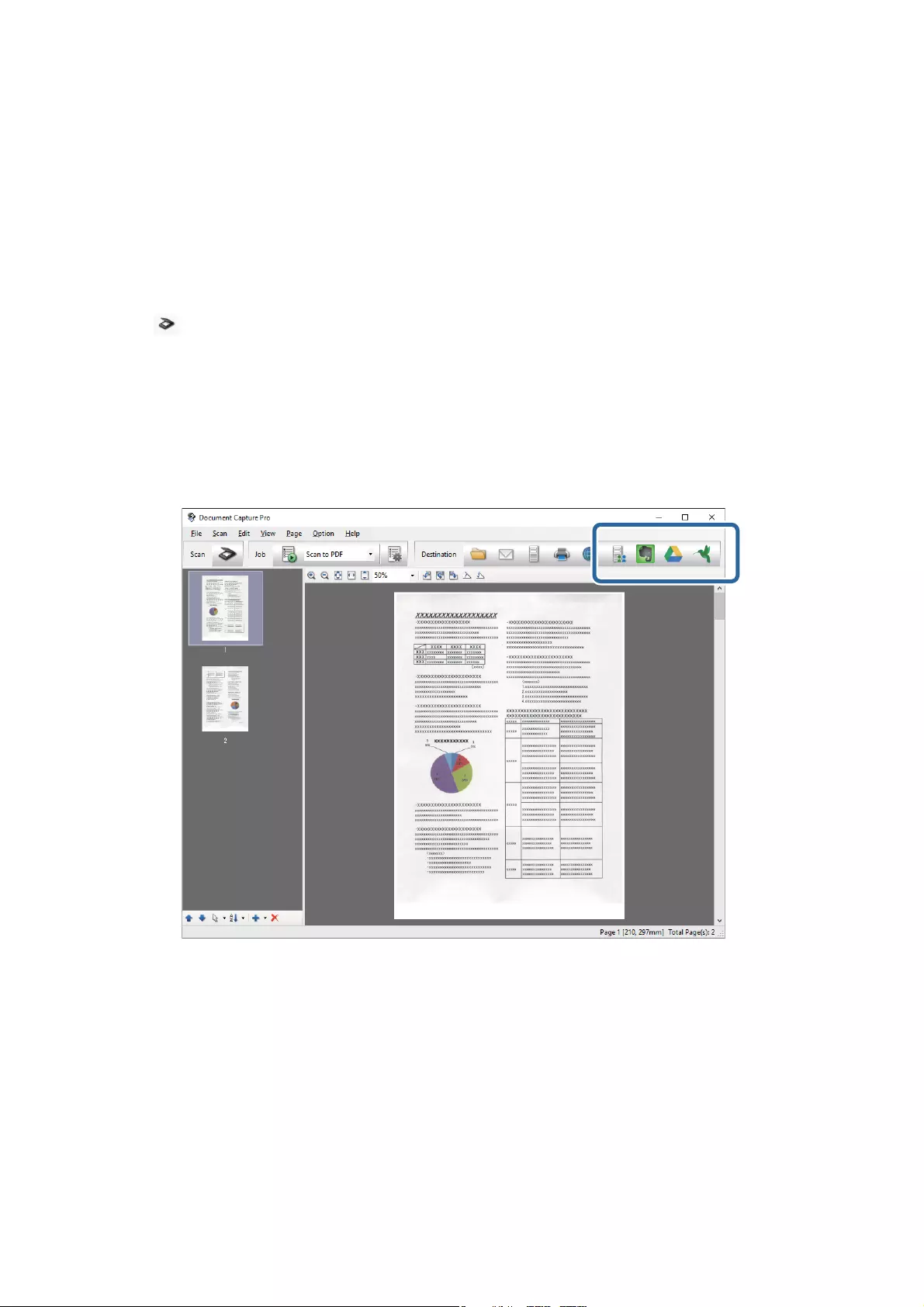
Note:
❏Create a cloud service account before using this function.
❏If you want to use Evernote as the destination, download the Evernote application from the Evernote Corporation
Website, and then install it before using this feature.
1. Place the original.
2. Start Document Capture Pro (Windows) or Document Capture (Mac OS X).
3. Click .
e Scan window is displayed.
4. Make the scanning settings, and then click Scan.
5. Check the scanned images, and edit them if necessary.
6. When you have nished checking the image, click the destination icon.
e Transfer Settings window is displayed.
7. Make settings for each item, and then click Send.
e scanned Image is sent to the selected cloud service.
Related Information
&“Scanning Using Document Capture Pro (Windows)” on page 54
&“Scanning Using Document Capture (Mac OS X)” on page 57
&“Placing Originals” on page 23
User's Guide
Advanced Scanning
73
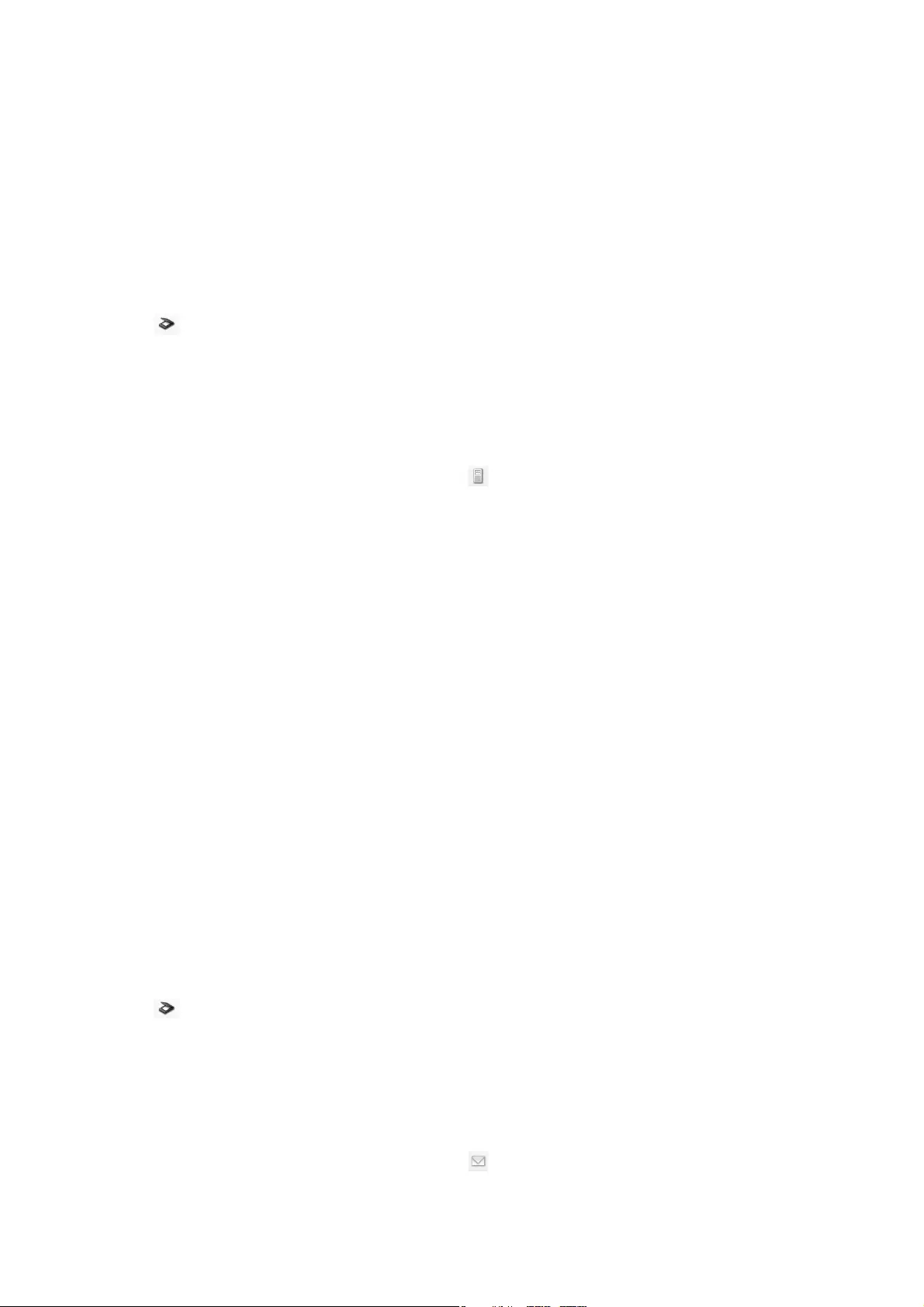
Uploading to an FTP Server
You can upload scanned images to an FTP server using Document Capture Pro (Windows) or Document Capture
(Mac OS X).
1. Place the original.
2. Start Document Capture Pro (Windows) or Document Capture (Mac OS X).
3. Click .
e Scan window is displayed.
4. Make the scanning settings, and then click Scan.
5. Check the scanned images, and edit them if necessary.
6. When you have nished checking the image, click the icon.
e Transfer Settings window is displayed.
7. Make settings for each item, and then click Send.
Note:
Contact your network administrator for the settings of your FTP server.
e scanned image is sent to your FTP server.
Related Information
&“Scanning Using Document Capture Pro (Windows)” on page 54
&“Scanning Using Document Capture (Mac OS X)” on page 57
&“Placing Originals” on page 23
Attaching Scanned Images to an Email
You can attach scanned images directly to an email using Document Capture Pro (Windows) or Document
Capture (Mac OS X).
1. Place the original.
2. Start Document Capture Pro (Windows) or Document Capture (Mac OS X).
3. Click .
e Scan window is displayed.
4. Make the scanning settings, and then click Scan.
5. Check the scanned images, and edit them if necessary.
6. When you have nished checking the image, click the icon.
e Batch Save window is displayed.
User's Guide
Advanced Scanning
74

7. Make settings for each item, and then click OK.
e email client on your computer starts automatically, and the scanned image is attached to an email.
Related Information
&“Scanning Using Document Capture Pro (Windows)” on page 54
&“Scanning Using Document Capture (Mac OS X)” on page 57
&“Placing Originals” on page 23
Printing Scanned Images
You can print scanned images directly from an Epson printer connected to the computer.
Note:
Before using this feature, check the following.
❏e Epson printer is connected to the same computer to which the scanner is connected.
❏e printer driver is correctly installed on the computer.
1. Place the original.
2. Start Document Capture Pro (Windows) or Document Capture (Mac OS X).
3. Click .
e Scan window is displayed.
4. Make the scanning settings, and then click Scan.
5. Check the scanned images, and edit them if necessary.
6. When you have nished checking the image, click the icon.
e Print Settings window opens.
7. Make settings for each item, and then click OK.
e scanned image is printed from the printer.
Related Information
&“Scanning Using Document Capture Pro (Windows)” on page 54
&“Scanning Using Document Capture (Mac OS X)” on page 57
&“Placing Originals” on page 23
Scanning Using Specied Scanning Settings (Job)
You can create a "Job" which is a set of specied scanning settings such as the sorting method, saving format,
destination, and so on.
You can set the job in Document Capture Pro (Windows) or Document Capture (Mac OS X).
User's Guide
Advanced Scanning
75
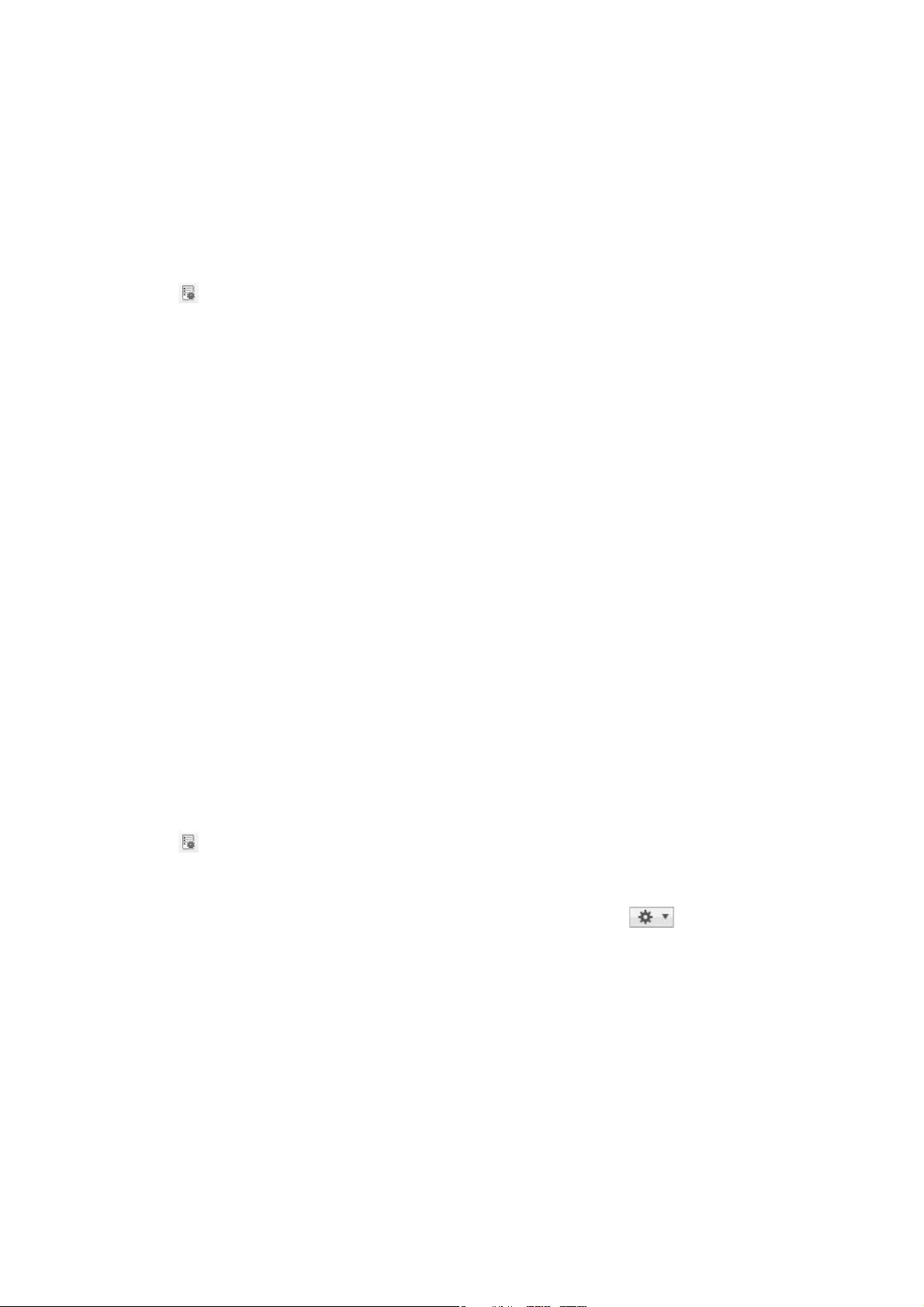
You can also assign the job to a button on the scanner, and run the job by pressing it.
Setting a Job
1. Start Document Capture Pro (Windows) or Document Capture (Mac OS X).
2. Click the (Manage Job) icon on the main window.
e Job Management window is displayed.
3. On the Job Management window, click Add (Windows) or the + icon (Mac OS X).
e Job Settings window opens.
4. Make the job settings on the Job Settings window.
❏Job Name: Enter a name for the job.
❏Scan tab: Set scanning settings on the tab.
❏Output tab: Set the output format of the scanned image on the tab.
❏Destination: Select the destination of the scanned image.
5. Click OK to close the Job Settings window.
6. Click OK on the Job Management window.
e job is set in the Document Capture Pro or Document Capture.
Assigning a Job to the Scanner Button
You can assign a job to the scanner’s button, and run the job by pressing the button.
1. Start Document Capture Pro (Windows) or Document Capture (Mac OS X).
2. Click the (Manage Job) icon on the main window.
e Job Management window is displayed.
3. Click Event Settings on the Job Management window (Windows), or click the icon at the bottom of
the screen (Mac OS X).
4. Click the job name to select the job you want to assign from the pull-down menu.
5. Click OK on the Job Management window.
e job is assigned to the scanner button.
Related Information
&“Buttons” on page 12
&“Scanning Using a Scanner Button” on page 59
&“Placing Originals” on page 23
User's Guide
Advanced Scanning
76
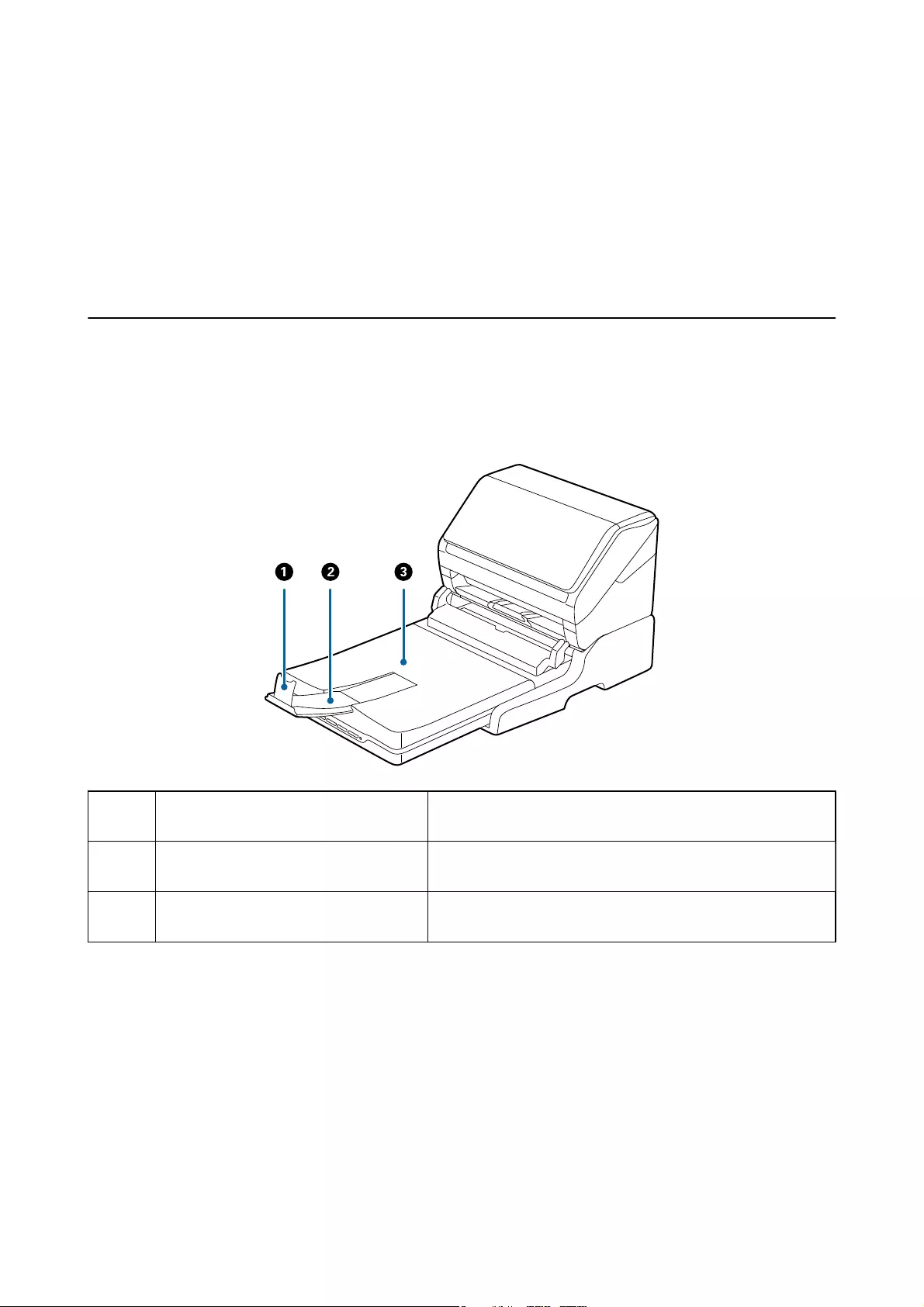
Using the Flatbed Scanner Dock
e optional Flatbed Scanner Dock allows you to scan from the scanner glass.
Note:
You need the applicable atbed scanner to use the Flatbed Scanner Dock.
Part Names and Functions of the Flatbed Scanner
Dock
Front
AStopper Prevents ejected originals from falling o the output tray
extension. Adjust it to the length of the originals.
BOutput tray extension Holds originals ejected from the sheet feed scanner. Pull out the
output tray extension to the length of the originals.
CDocument cover/Output tray Blocks external light while scanning with the atbed scanner.
Holds originals ejected from the sheet feed scanner.
User's Guide
Using the Flatbed Scanner Dock
77
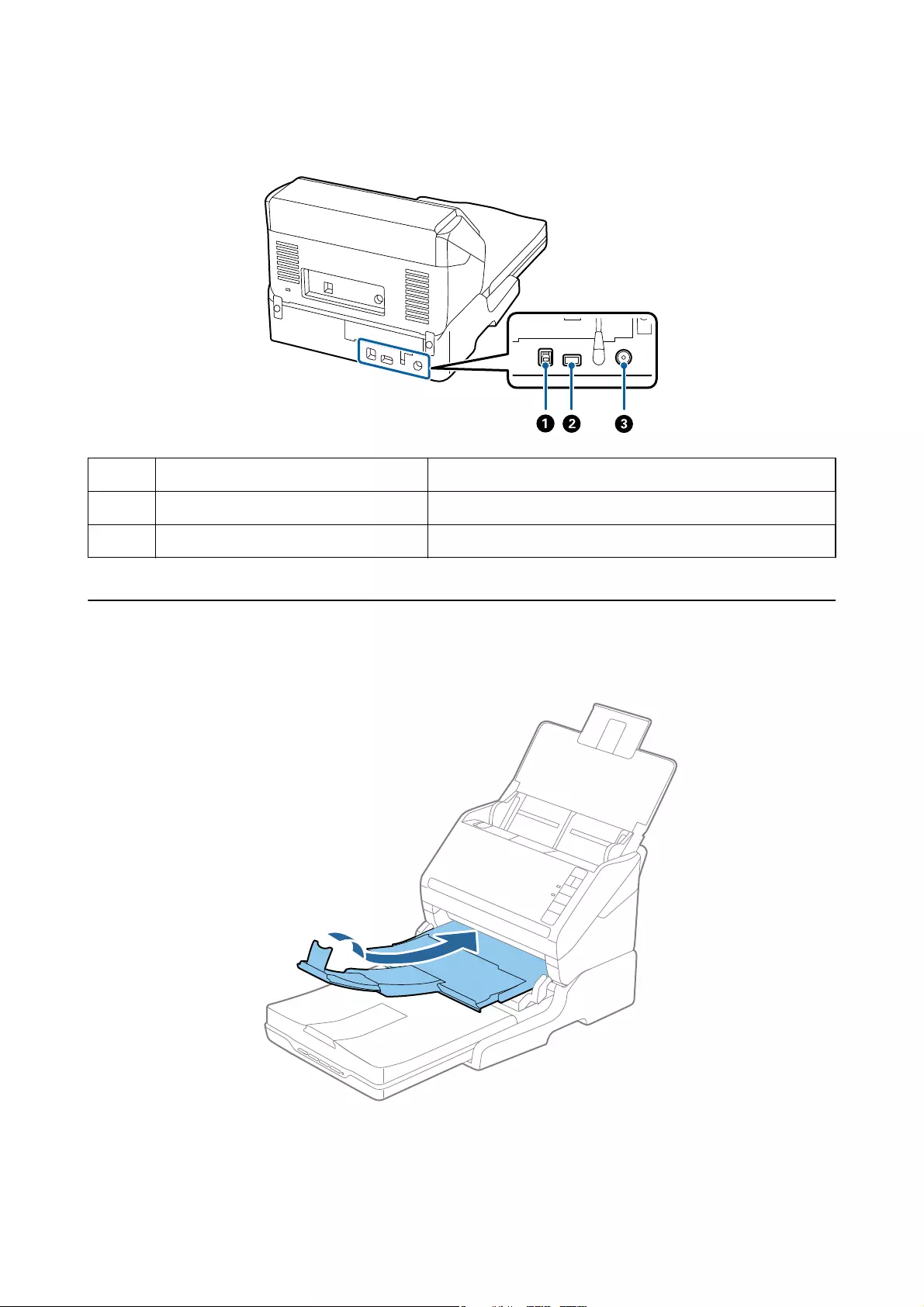
Back
AUSB port 1 Connects a USB cable to connect to a computer.
BUSB port 2 Connects a USB cable to connect to the sheet feed scanner.
CDC inlet Connects the AC adapter.
Scanning from the Scanner Glass
1. Close the output tray.
User's Guide
Using the Flatbed Scanner Dock
78
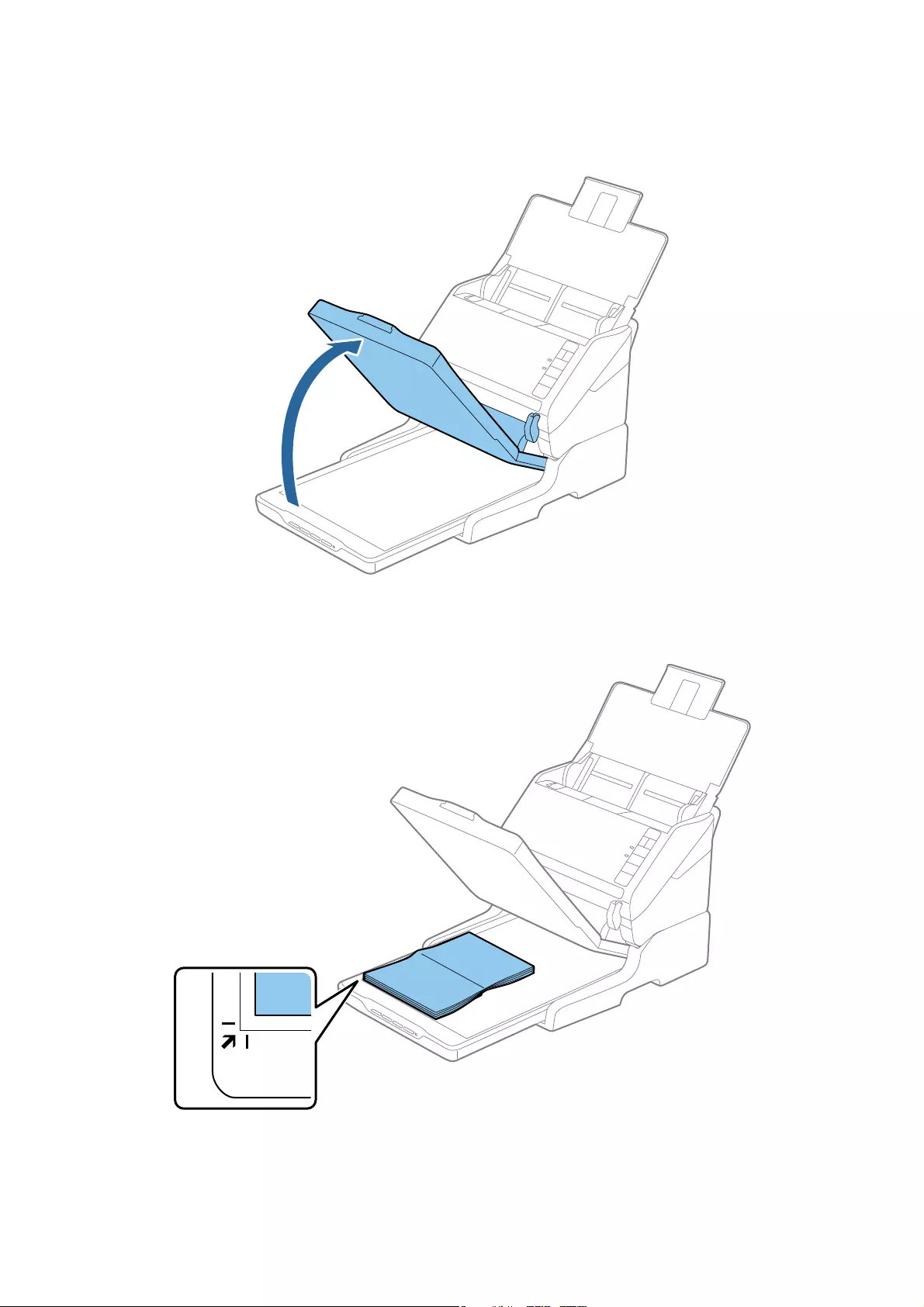
2. Open the document cover.
3. Place your document or photo face down on the scanner glass making sure the upper corner of the side you
want to scan is against the corner of the scanner next to the arrow mark.
User's Guide
Using the Flatbed Scanner Dock
79
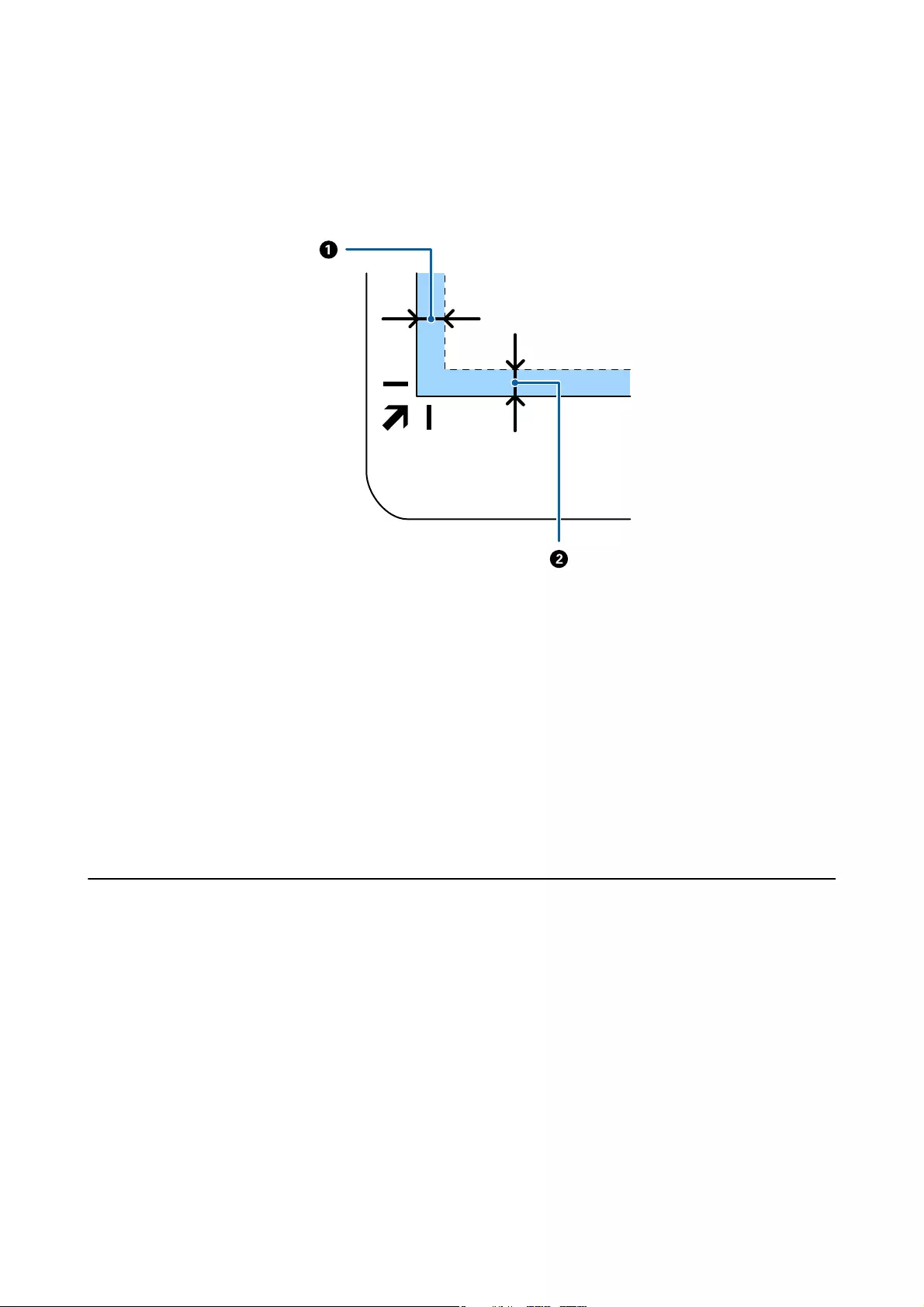
Note:
❏If you are scanning multiple photos at once, position each photo at least 20 mm (0.8 inch) apart from the others.
❏You can avoid cropping by moving the document about 2.5 mm (0.1 inch) away from the top and side edges
indicated by
A
and
B
in the following gure.
4. Close the document cover gently so that your original does not move.
Note:
❏Always keep the scanner glass clean.
❏Do not leave originals on the scanner glass for an extended period of time as they may stick.
5. Start Epson Scan 2.
6. Select Scanner Glass from the Document Source list.
7. Set the other items as necessary.
8. Click Scan.
Notes on Using the Flatbed Scanner Dock
Place the Flatbed Scanner Dock on a horizontal and stable surface.
Notes on Scanning from the ADF
Depending on the length of the originals, operations for the input tray, the output tray, and the stopper vary when
scanning from the ADF using the Flatbed Scanner Dock. Do one of the following.
Note:
See the explanation for placing originals regarding other operations except for the input tray, the output tray, and the stopper.
Originals shorter than A5 (210 mm)
Open the input tray. Slide out the output tray, extend the output tray extension, and then raise the stopper.
User's Guide
Using the Flatbed Scanner Dock
80
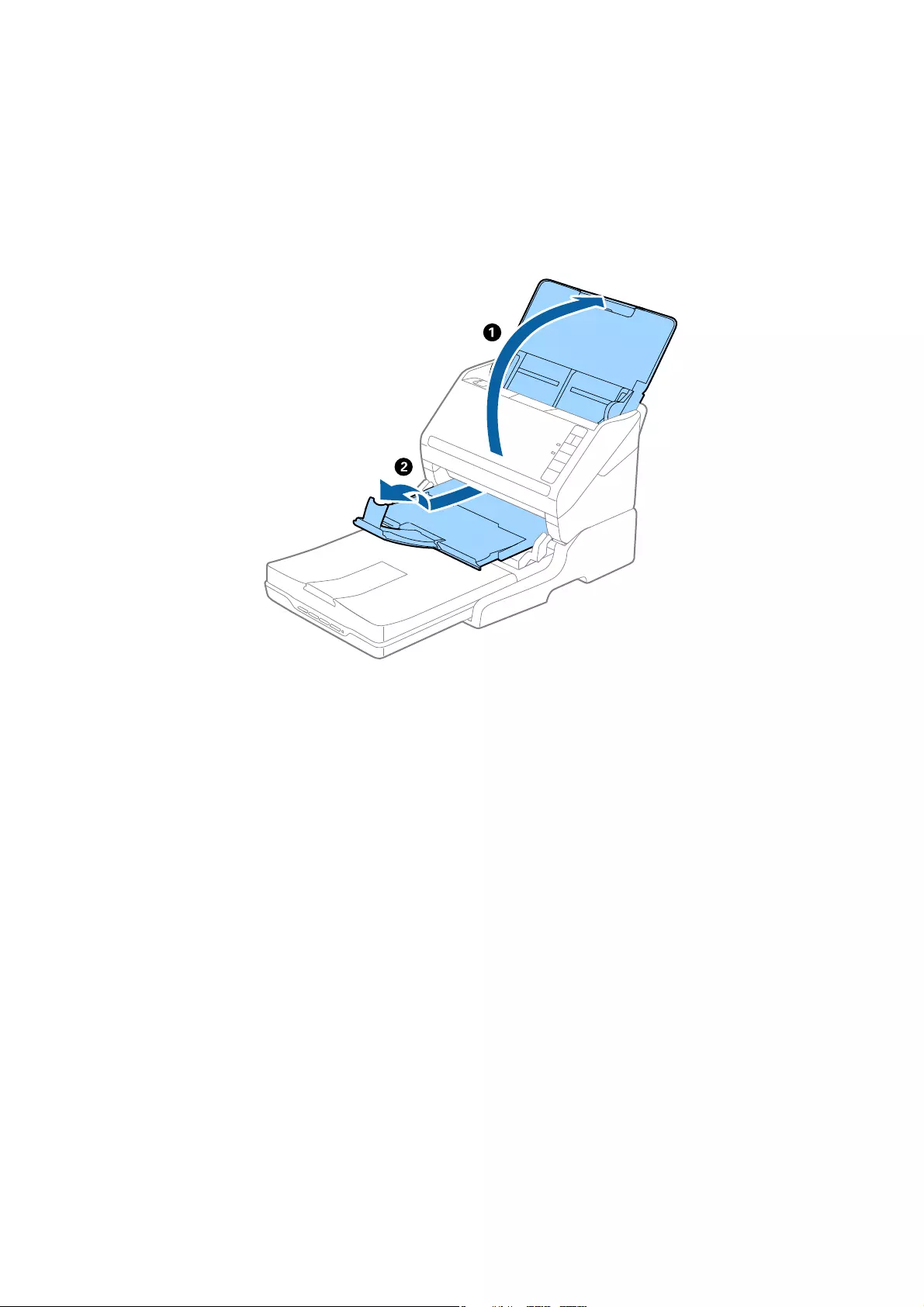
Note:
❏Make sure you pull out and extend the output tray extensions so that they are a little bit longer than the length of the
original, and raise the stopper so that the ejected originals can be stacked comfortably on the output tray.
❏e stopper can move forward and backward on the central output extension so that you can easily adjust the stopper
position to the best position for the originals being scanned.
Originals of A5 (210 mm) or longer up to A4 (297 mm)
Open and extend the input tray, and then raise the stopper of the Flatbed Scanner Dock.
User's Guide
Using the Flatbed Scanner Dock
81
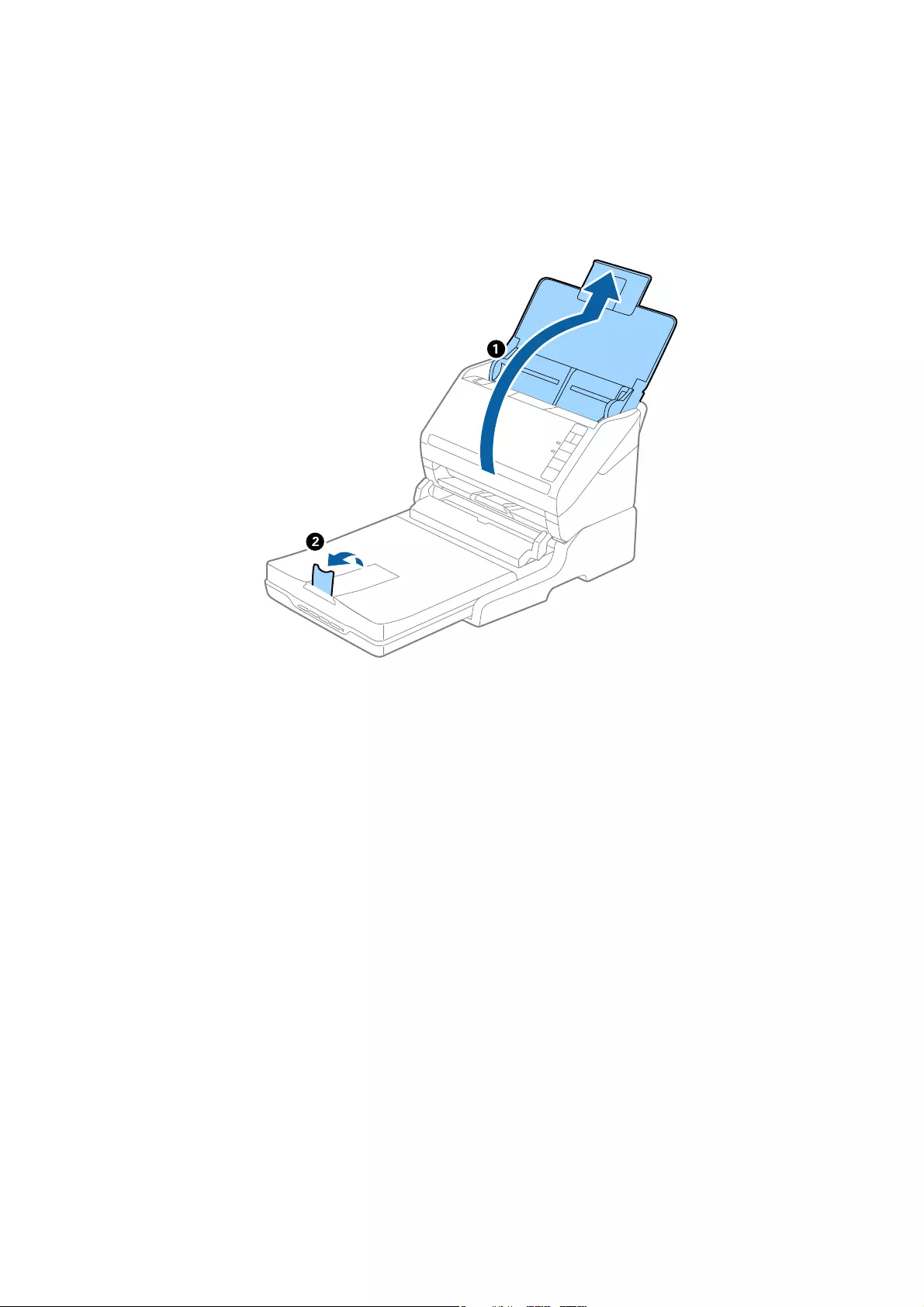
Note:
❏Make sure you raise and slide the stopper so that it is a little bit longer than the length of the original. is allows the
ejected originals to be stacked comfortably on the output tray.
❏e stopper can move forward and backward on the central output extension so that you can easily adjust the stopper
position to the best position for the originals being scanned.
Originals longer than A4 (297 mm) to Legal (355.6 mm)
Open and extend the input tray, slide out the output tray extension of the Flatbed Scanner Dock, and then raise the
stopper.
User's Guide
Using the Flatbed Scanner Dock
82
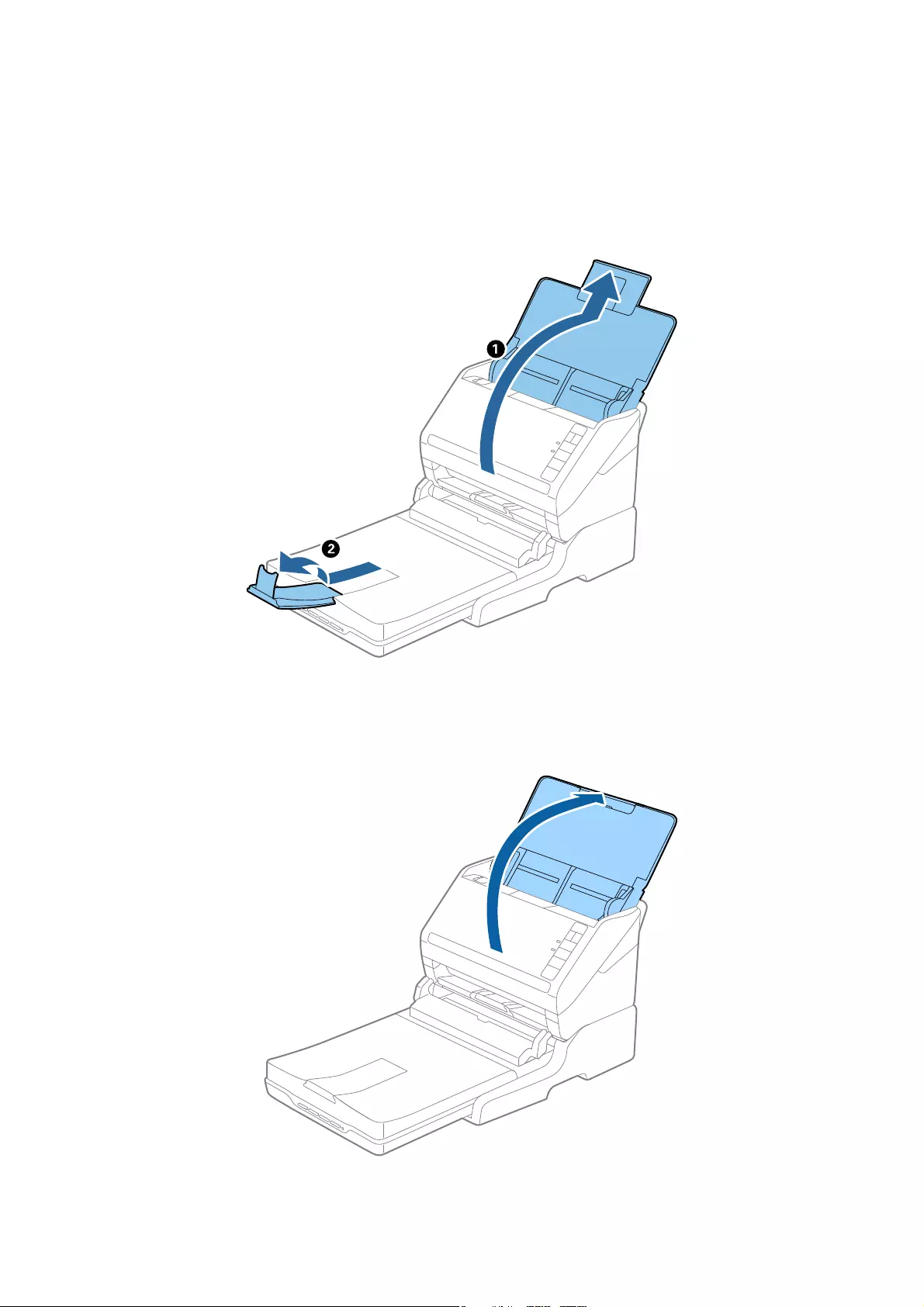
Note:
❏Make sure you pull out and extend the output tray extensions so that they are a little bit longer than the length of the
original, and raise the stopper so that the ejected originals can be stacked comfortably on the output tray.
❏e stopper can move forward and backward on the central output extension so that you can easily adjust the stopper
position to the best position for the originals being scanned.
Originals longer than Legal (355.6 mm)
Open the input tray.
User's Guide
Using the Flatbed Scanner Dock
83
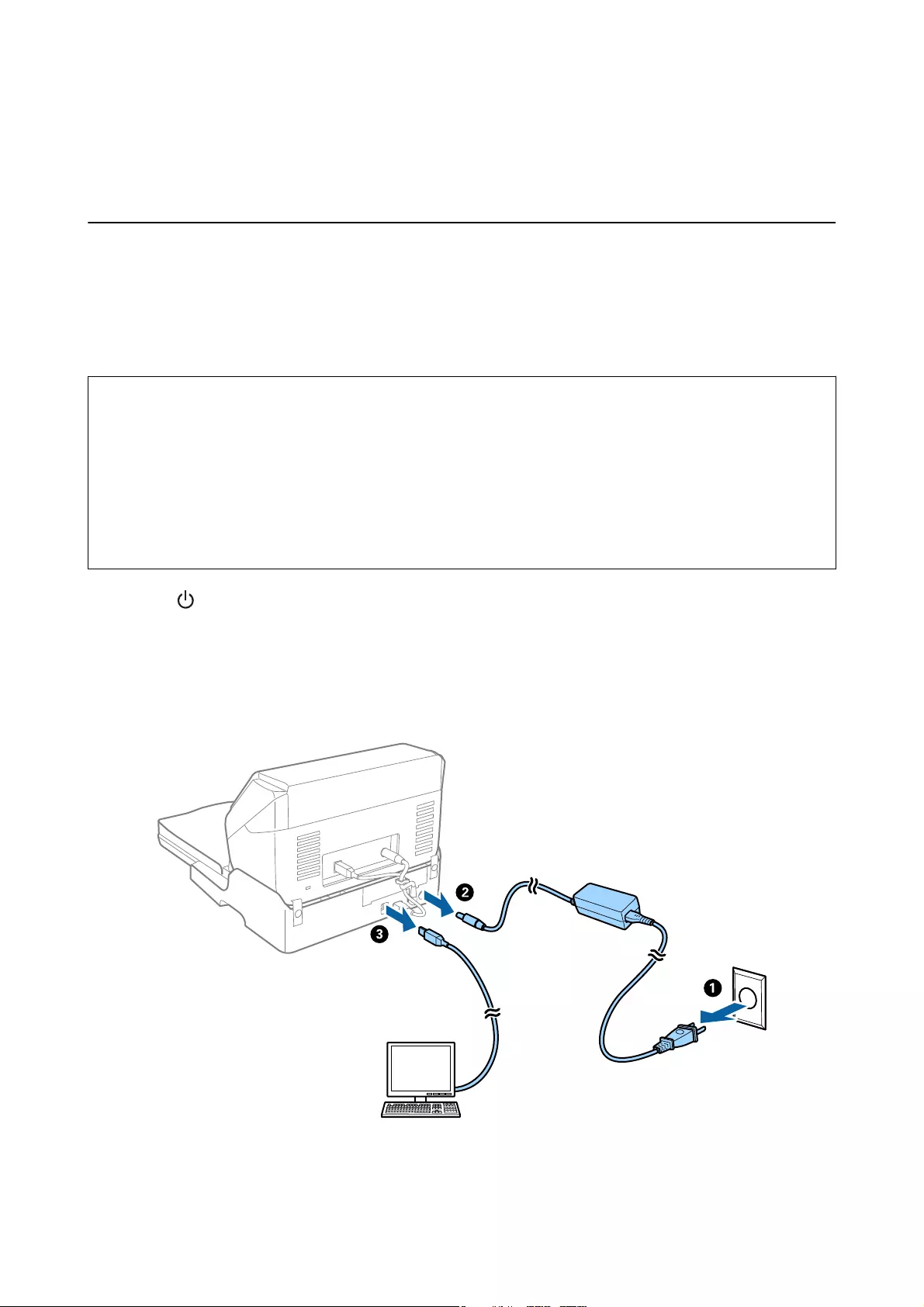
Related Information
&“Placing Originals” on page 23
Maintenance
Cleaning the Flatbed Scanner Dock
To keep your Flatbed Scanner Dock in optimum condition, follow the steps below to clean it periodically.
c
Important:
❏Never use alcohol, thinner, or corrosive solvent to clean the Flatbed Scanner Dock. ese chemicals can damage
the Flatbed Scanner Dock components and the case.
❏Be careful not to spill liquid into the scanner mechanism or electronic components. is could permanently
damage the mechanism and circuitry.
❏Do not spray lubricants onto the Flatbed Scanner Dock.
❏Never open the Flatbed Scanner Dock case.
1. Press the button to turn o the sheet feed scanner.
Note:
ere is no power button on the atbed scanner.
2. Unplug the AC adapter, and then disconnect the USB cable that is connected to the computer from the Flatbed
Scanner Dock.
3. Wipe o any dirt on the outer case with a so cloth.
If the case is very dirty, dampen a so cloth with water and wring it out thoroughly, and then wipe o any
remaining stains. Next, use a so dry cloth to wipe the case.
User's Guide
Using the Flatbed Scanner Dock
84
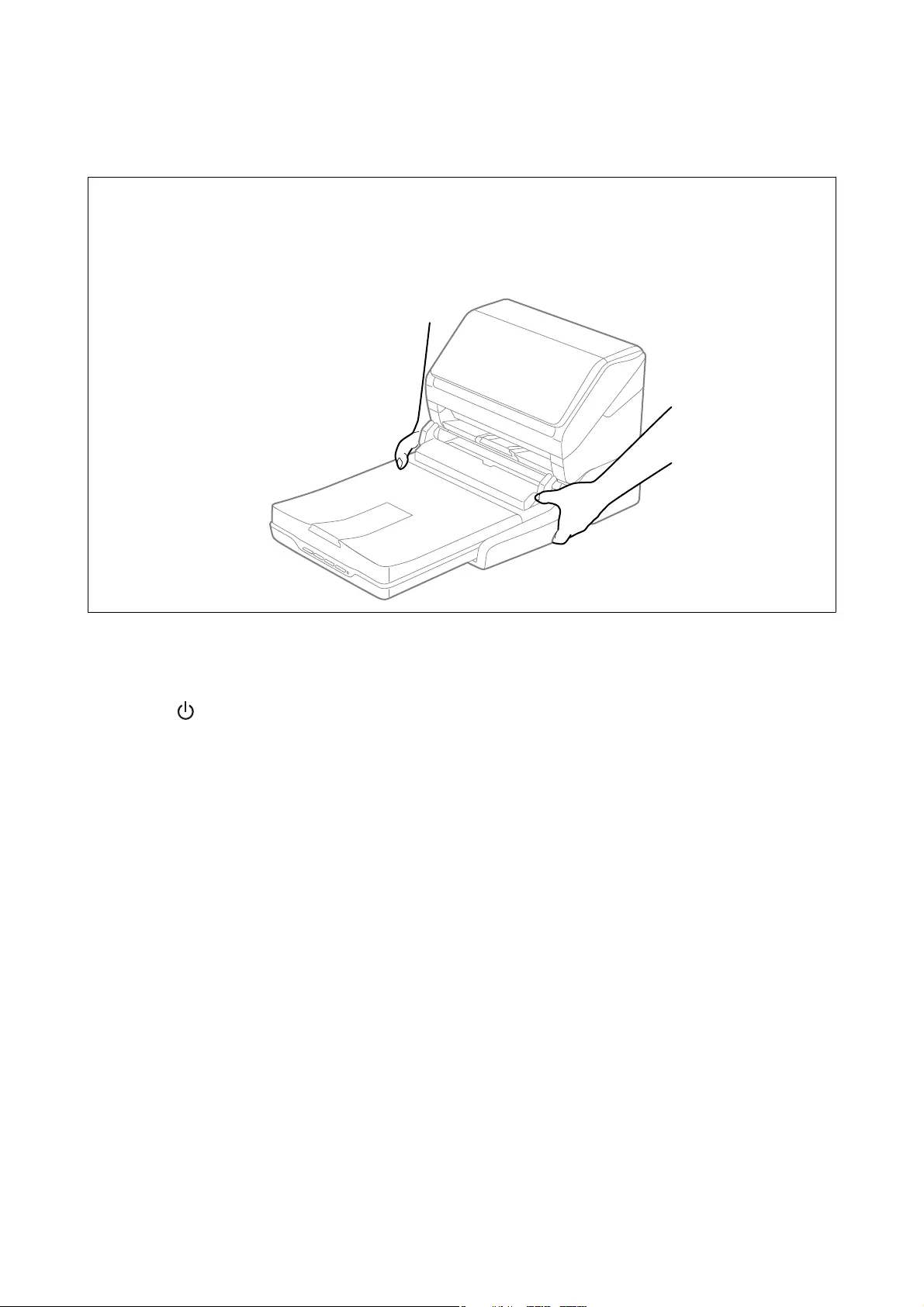
Transferring and Transporting the Flatbed Scanner Dock
!
Caution:
When liing the Flatbed Scanner Dock, place your hands in the positions shown below. If you li the Flatbed
Scanner Dock by holding it in other positions, the Flatbed Scanner Dock may fall or you may trap your ngers when
placing the Flatbed Scanner Dock.
Transporting the Flatbed Scanner Dock a Short Distance
1. Press the button to turn o the sheet feed scanner.
Note:
ere is no power button on the atbed scanner.
User's Guide
Using the Flatbed Scanner Dock
85
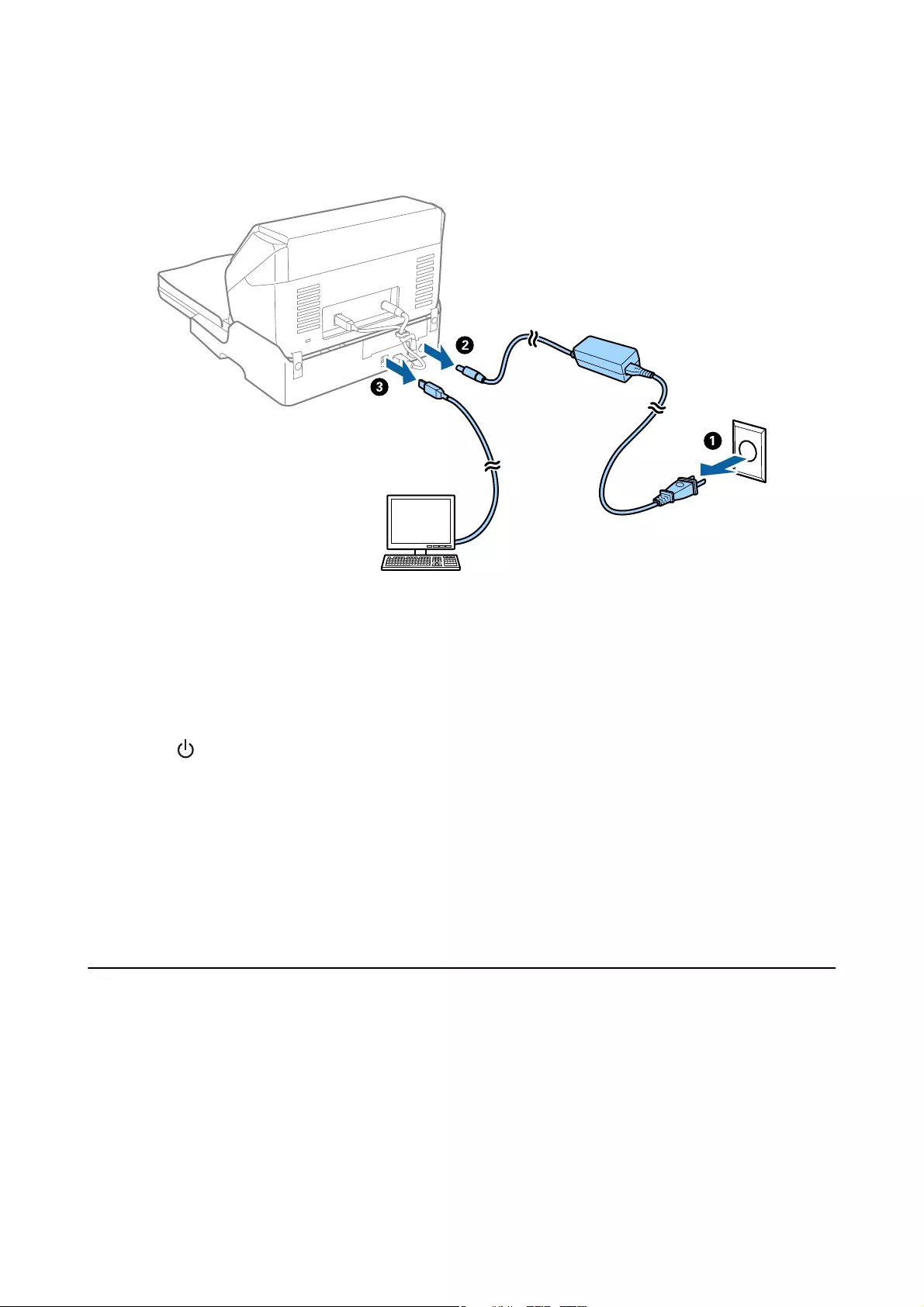
2. Unplug the AC adapter, and then disconnect the USB cable that is connected to the computer from the Flatbed
Scanner Dock.
3. Do not subject the Flatbed Scanner Dock to vibrations and keep it level while carrying.
Transporting the Flatbed Scanner Dock
Make sure you have the Setup guide with you before you begin the following procedure.
1. Press the button to turn o the sheet feed scanner.
Note:
ere is no power button on the atbed scanner.
2. Perform the setup procedure by reversing the procedure described in the setup guide supplied with the Flatbed
Scanner Dock to separate the sheet feed scanner, the atbed scanner, and the Flatbed Scanner Dock.
3. Attach the packing materials that came with the Flatbed Scanner Dock, and then repack it in its original box
or a similar box that ts the Flatbed Scanner Dock snugly.
Troubleshooting for the Flatbed Scanner Dock
Uneven Colors, Dirt, Spots, and so on Appear when Scanning from
the Scanner Glass
❏Clean the scanner glass.
❏Remove any trash or dirt that adheres to the original.
User's Guide
Using the Flatbed Scanner Dock
86
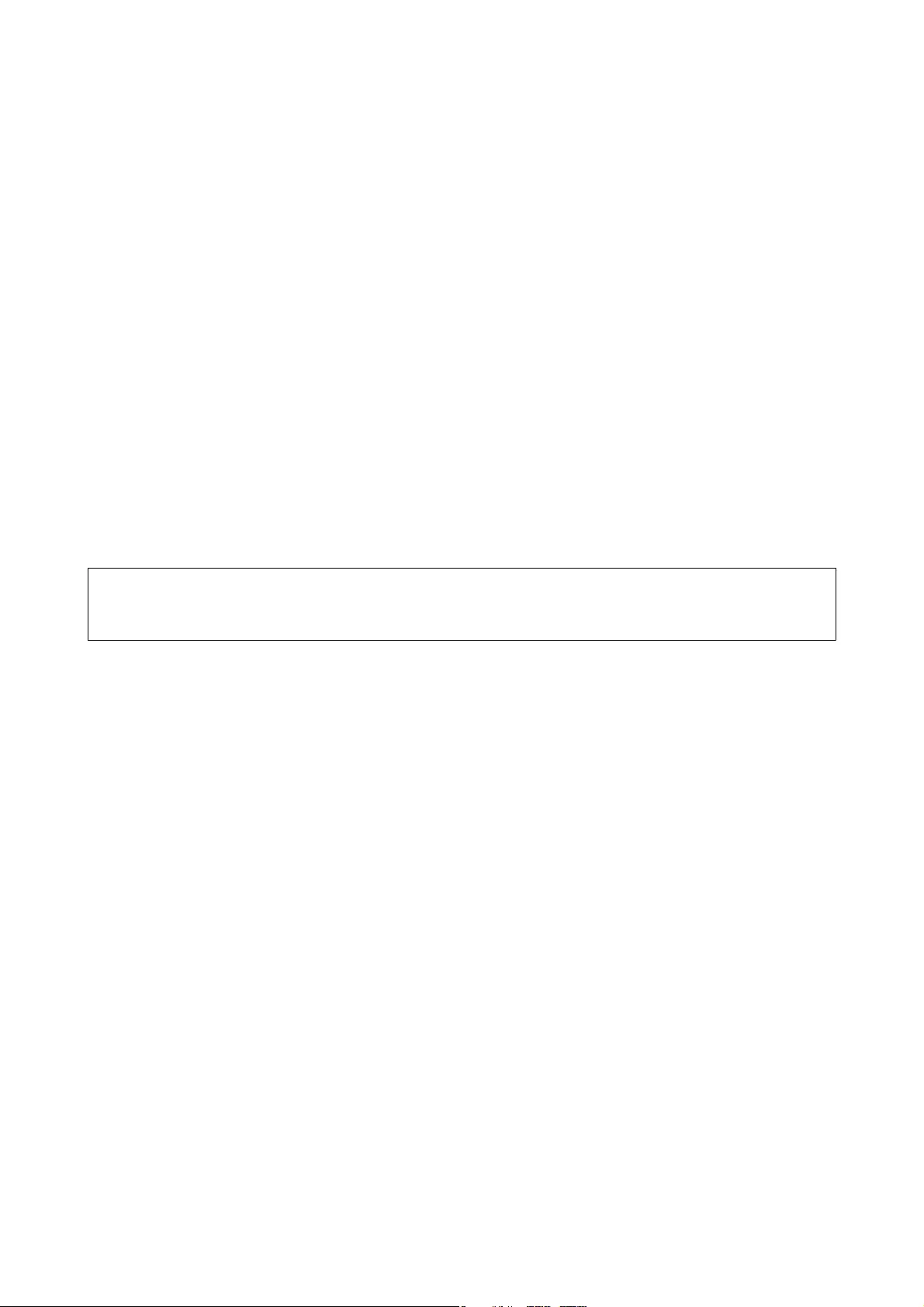
❏Do not press with too much force on the original or the document cover. If you press with too much force,
blurring, smudges, and spots may occur.
Related Information
&“Cleaning the Flatbed Scanner Dock” on page 84
Cannot Scan the Correct Area on the Scanner Glass
❏Make sure the original is placed correctly against the alignment marks.
❏If the edge of the scanned image is missing, move the original slightly away from the edge of the scanner glass.
Binding Margins of a Booklet are Distorted or Blurred
When scanning a booklet on the scanner glass, characters may appear distorted or blurred on the binding margin.
If this problem occurs, text is not recognized correctly when you save the scanned image as a Searchable PDF.
To decrease distortion or blurring on the binding margin, gently press down the document cover and hold it down
while scanning to atten the booklet. Make sure you do not move the booklet while scanning.
c
Important:
Do not press the document cover with too much force. Otherwise, the booklet or the scanner may be damaged.
Oset Appears in the Background of Images
Images on the back of the original may appear in the scanned image.
❏In Epson Scan 2, select the Advanced Settings tab, and then adjust the Brightness.
is feature may not be available depending on the settings on the Main Settings tab > Image Type or other
settings on the Advanced Settings tab.
❏In Epson Scan 2, select the Advanced Settings tab, and then Image Option > Text Enhancement.
❏When scanning from the scanner glass, place black paper or a desk pad over the original.
Related Information
&“Brightness” on page 66
You can adjust the brightness for the whole image.
&“Text Enhancement” on page 65
You can make blurred letters in the original clear and sharp. You can also reduce the oset or unevenness of the
background.
User's Guide
Using the Flatbed Scanner Dock
87
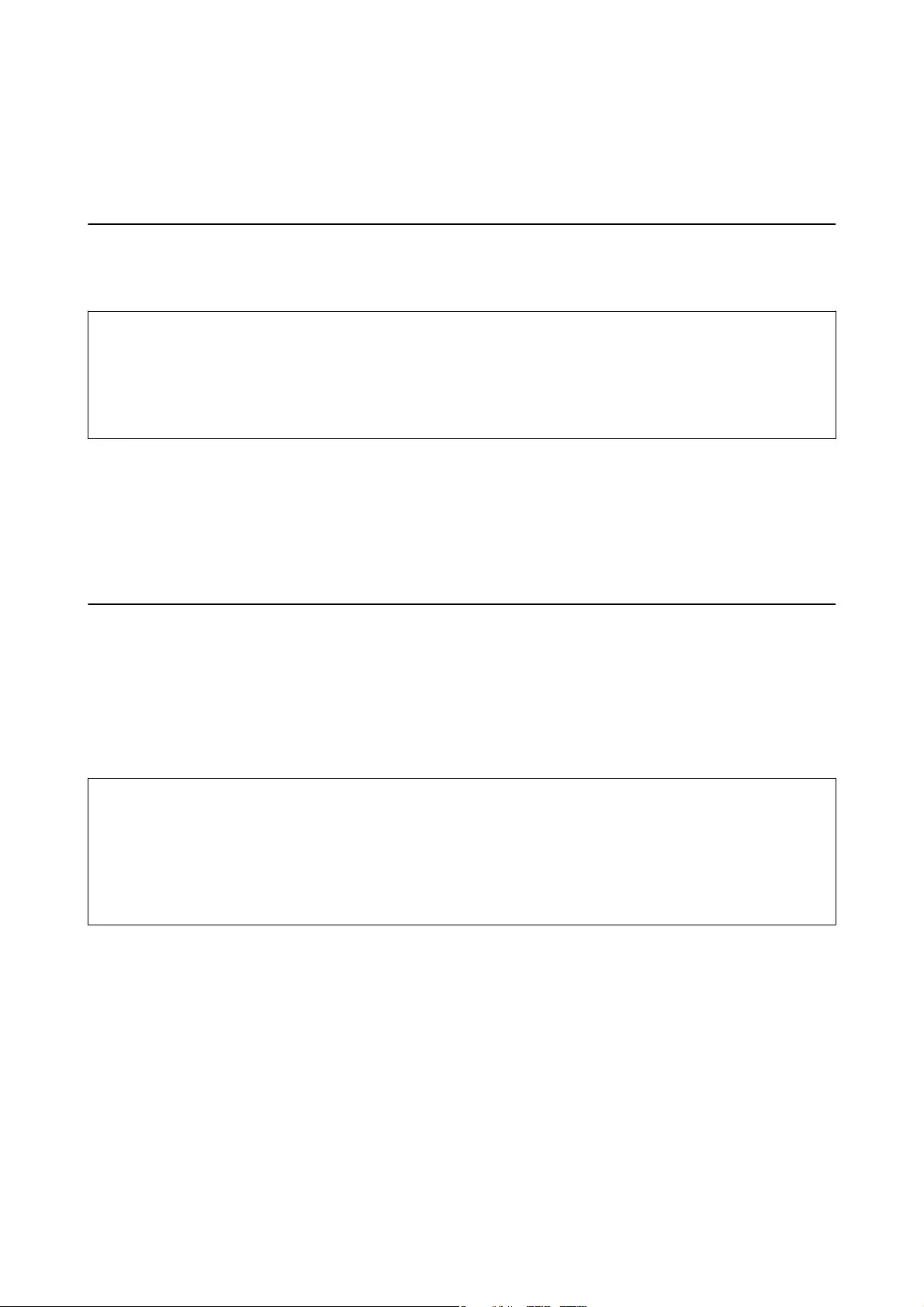
Maintenance
Cleaning Outside the Scanner
Wipe o any stains on the outer case with a dry cloth or a cloth dampened with mild detergent and water.
c
Important:
❏Never use alcohol, thinner, or any corrosive solvent to clean the scanner. Deformation or discoloration may occur.
❏Do not let water get inside the product. is could cause a malfunction to occur.
❏Never open the scanner case.
1. Press the
P
button to turn o the scanner.
2. Unplug the AC adapter from the scanner.
3. Clean the outer case with a cloth dampened with mild detergent and water.
Cleaning Inside the Scanner
Aer using the scanner for a while, paper and room dust on the roller or the glass part inside the scanner may
cause paper feed or scanned image quality problems. Clean the inside of the scanner every 5,000 scans. You can
check the latest number of scans in Epson Scan 2 Utility.
If a surface is stained with a hard-to-remove material, use a genuine Epson cleaning kit to remove stains. Use a
small amount of cleaner on the cleaning cloth to remove the stains.
c
Important:
❏Never use alcohol, thinner, or any corrosive solvent to clean the scanner. Deformation or discoloration may occur.
❏Never spray any liquid or lubricant on the scanner. Damage to equipment or circuits may cause abnormal
operations.
❏Never open the scanner case.
1. Press the
P
button to turn o the scanner.
2. Unplug the AC adapter from the scanner.
User's Guide
Maintenance
88
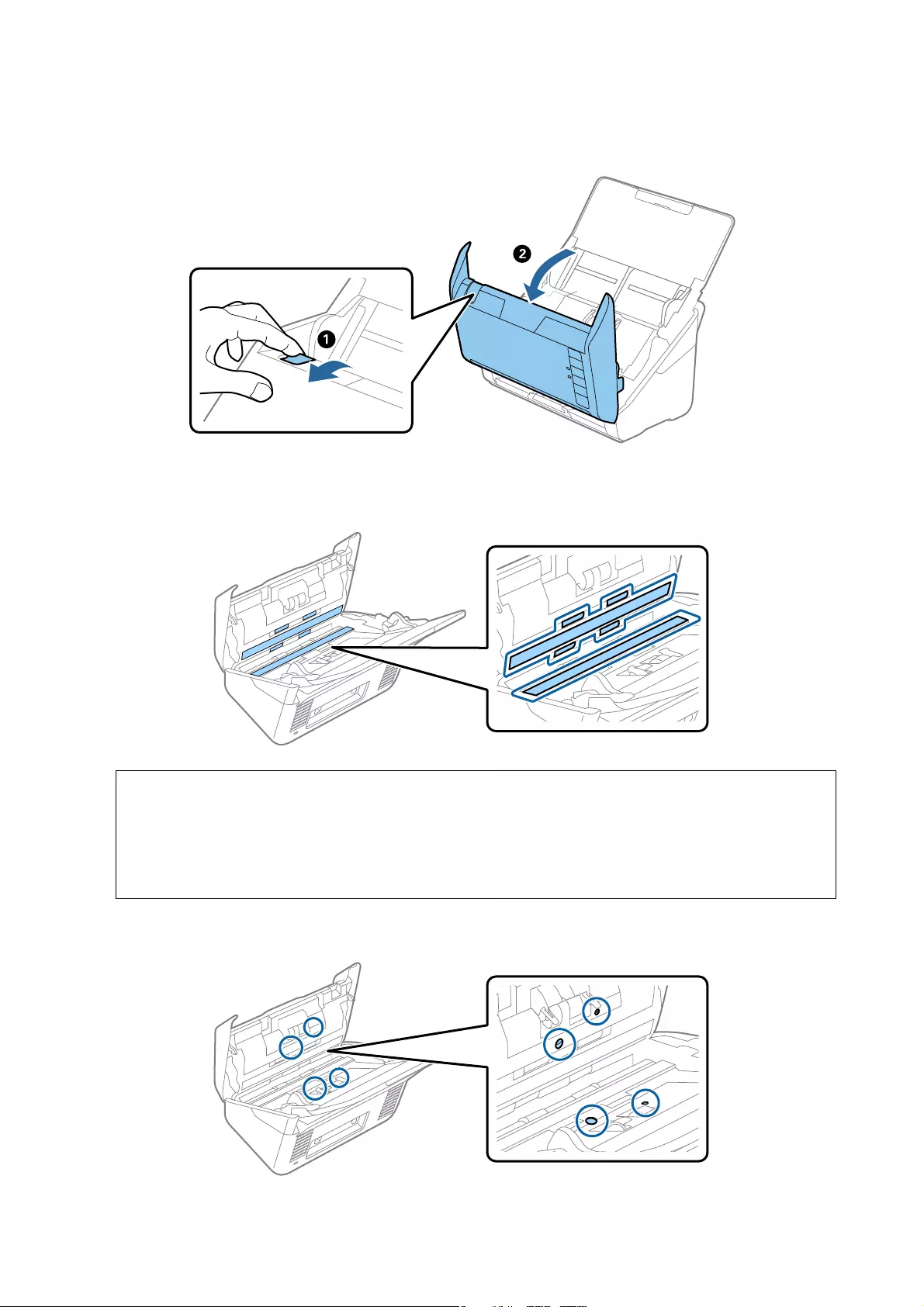
3. Pull the cover open lever and open the scanner cover.
4. Wipe o any stains on the plastic roller and glass surface at the bottom inside of the scanner cover using a so
cloth or a genuine Epson cleaning kit.
c
Important:
❏Do not place too much force on the glass surface.
❏Do not use a brush or a hard tool. Any scratches on the glass may aect the scan quality.
❏Do not spray cleaner directly onto the glass surface.
5. Wipe o any stains on the sensors with a cotton swab.
User's Guide
Maintenance
89
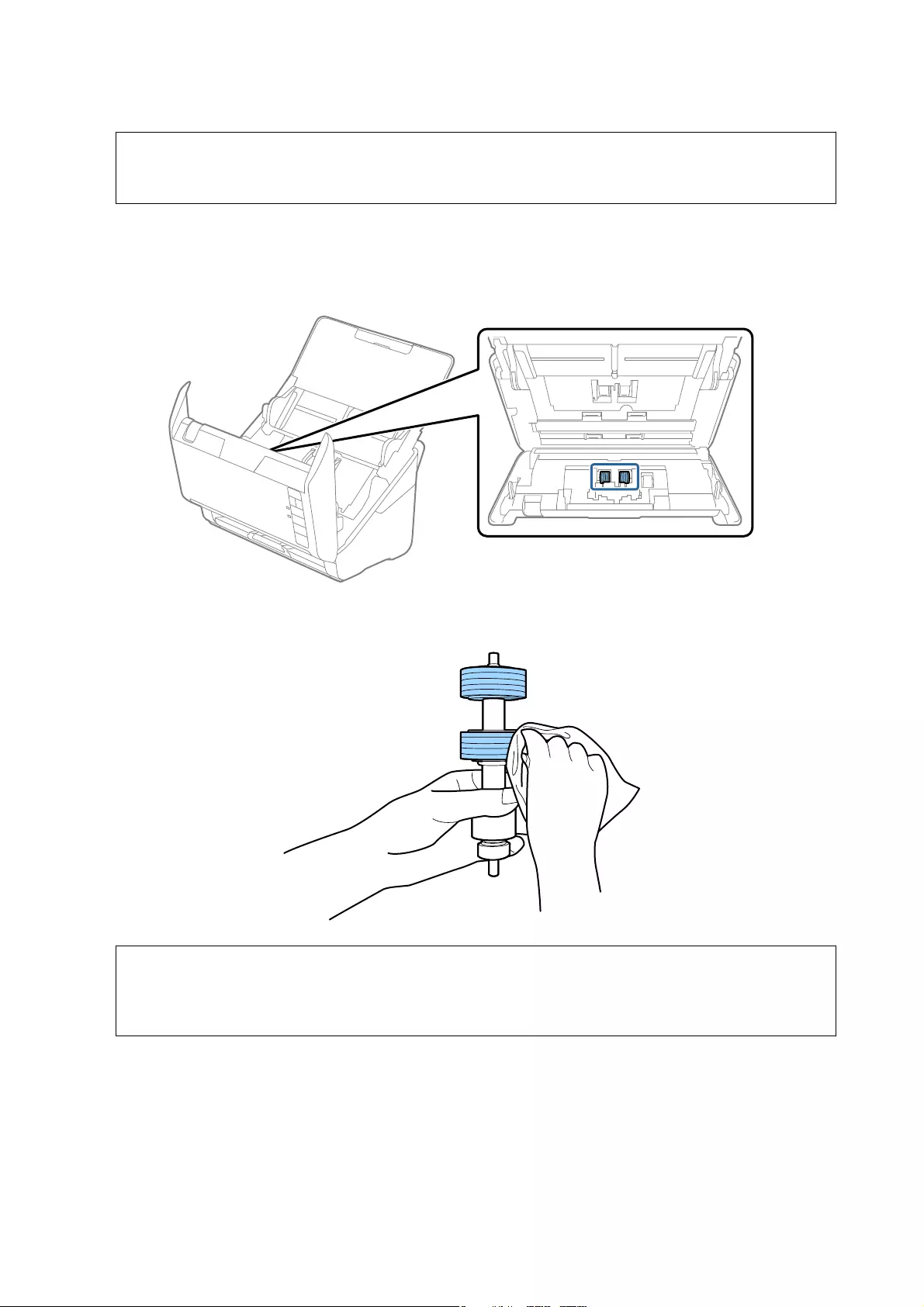
c
Important:
Do not use liquid such as a cleaner on a cotton swab.
6. Open the cover, and then remove the separation roller.
See “Replacing the Roller Assembly Kit” for more details.
7. Wipe o any dust or dirt on the separation roller using a genuine Epson cleaning kit or a so, moist cloth.
c
Important:
Use only a genuine Epson cleaning kit or a so, moist cloth to clean the roller. Using a dry cloth may damage
the surface of the roller.
User's Guide
Maintenance
90
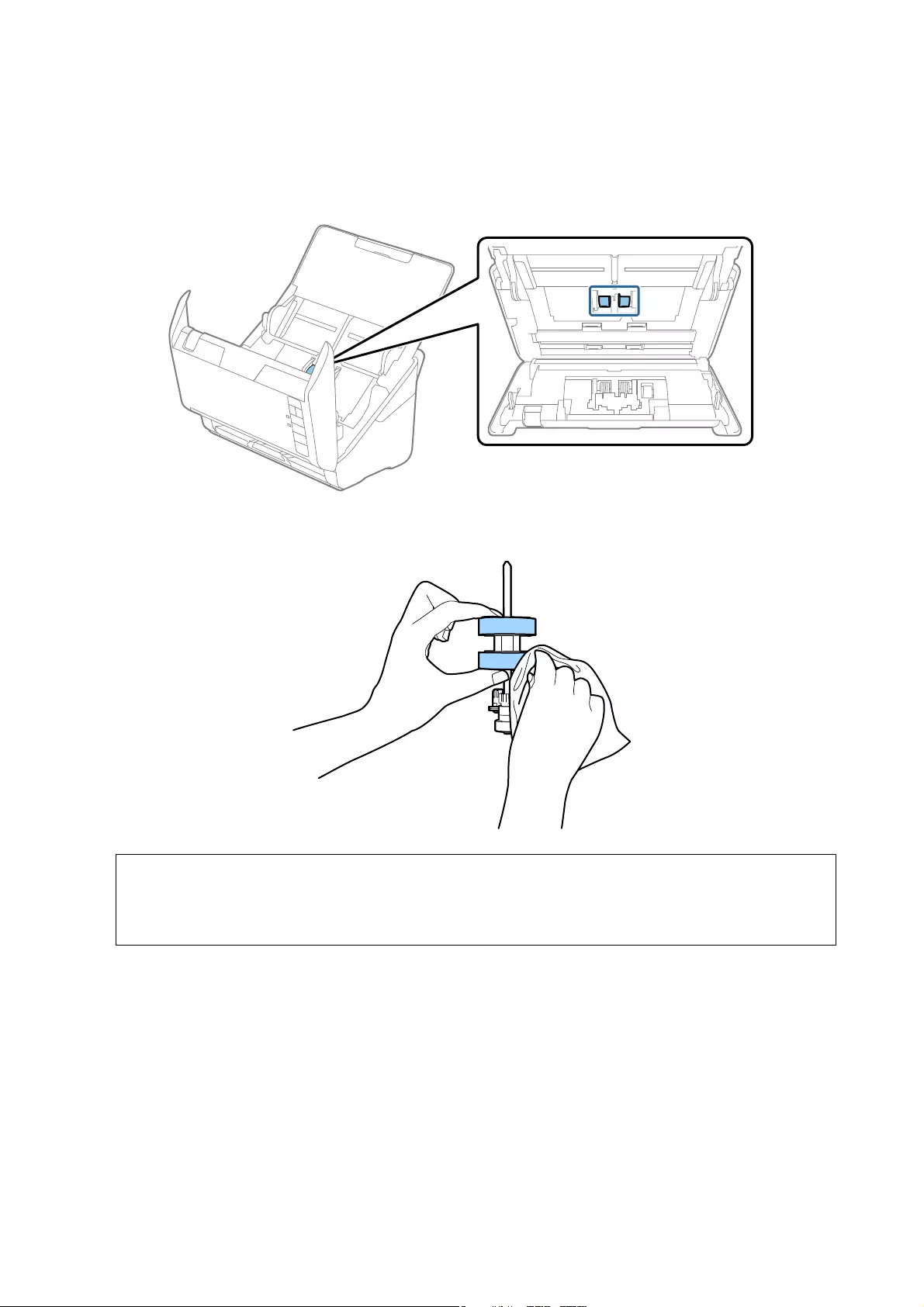
8. Open the cover, and then remove the pickup roller.
See “Replacing the Roller Assembly Kit” for more details.
9. Wipe o any dust or dirt on the pickup roller using a genuine Epson cleaning kit or a so, moist cloth.
c
Important:
Use only a genuine Epson cleaning kit or a so, moist cloth to clean the roller. Using a dry cloth may damage
the surface of the roller.
10. Plug in the AC adapter, and then turn on the scanner.
User's Guide
Maintenance
91
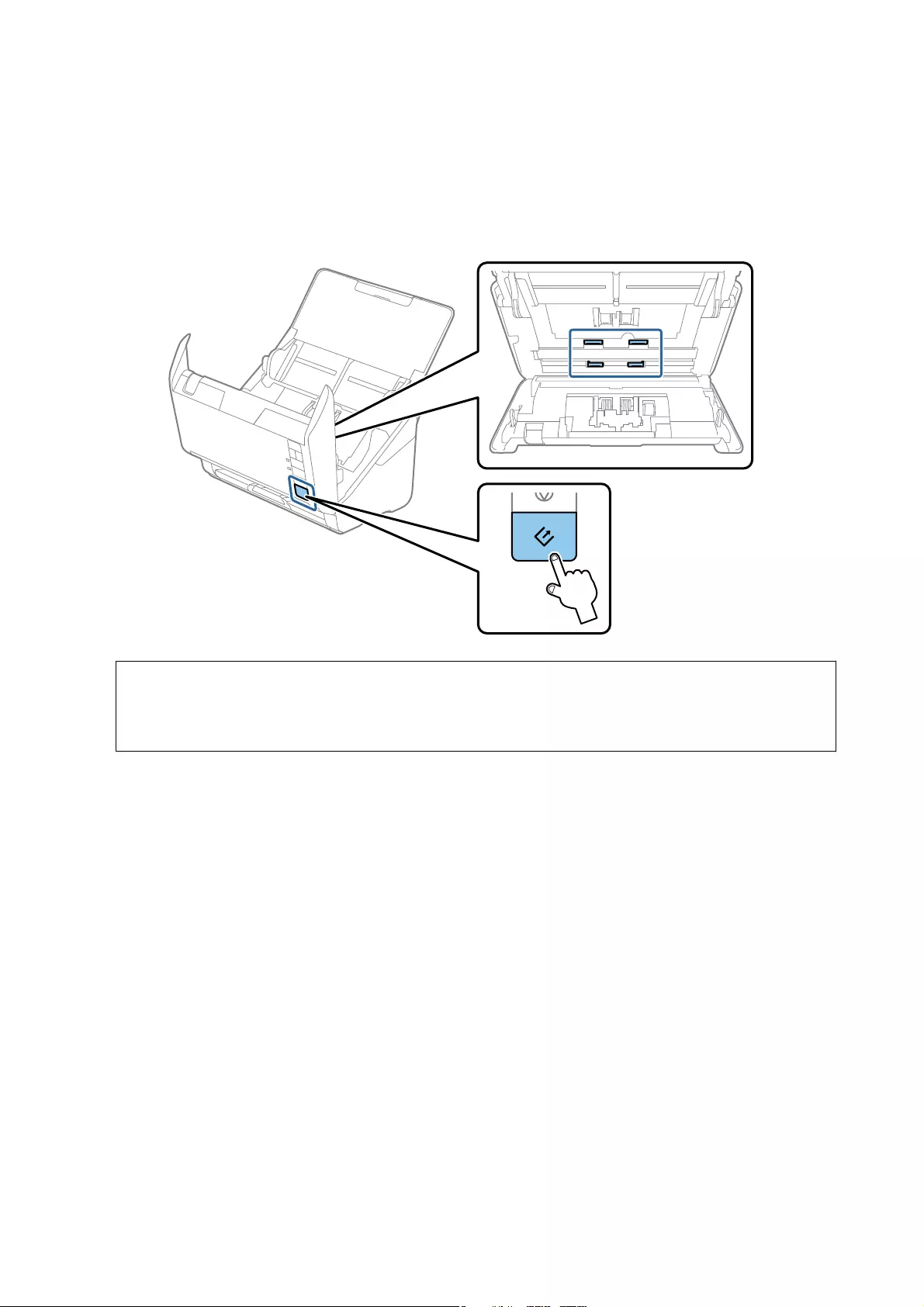
11. Hold down the
]
button for at least two seconds while opening the scanner cover. e rollers on the bottom
move momentarily, and then the scanner enters cleaning mode. e rollers rotate a bit each time you press
the
]
button. Press the
]
button several times to rotate the rollers. Use a genuine Epson cleaning kit or a so,
moist cloth to clean the rollers as they rotate. Repeat this step until the rollers are clean.
!
Caution:
Be careful not to get your hands or hair caught in the mechanism when operating the roller. is could cause an
injury.
12. Close the scanner cover.
e scanner exits cleaning mode.
Related Information
&“Cleaning Kit Codes” on page 17
&“Replacing the Roller Assembly Kit” on page 93
User's Guide
Maintenance
92
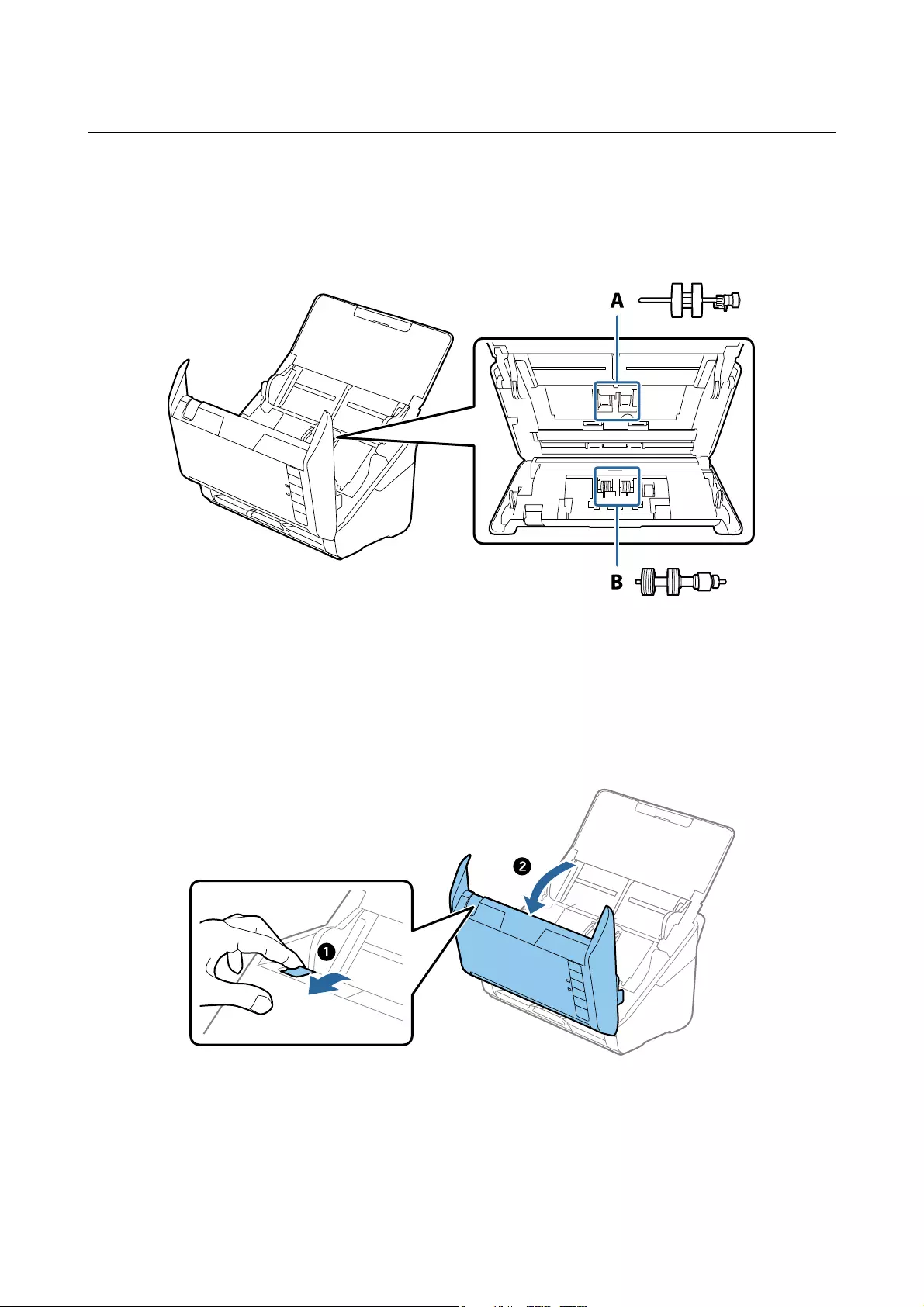
Replacing the Roller Assembly Kit
e roller assembly kit (the pickup roller and the separation roller) needs to be replaced when the number of scans
exceeds the Life Cycle of the rollers. When a replacement message is displayed on your computer, follow the steps
below to replace it.
A: pickup roller, B: separation roller
1. Press the
P
button to turn o the scanner.
2. Unplug the AC adapter from the scanner.
3. Pull the cover open lever and open the scanner cover.
User's Guide
Maintenance
93
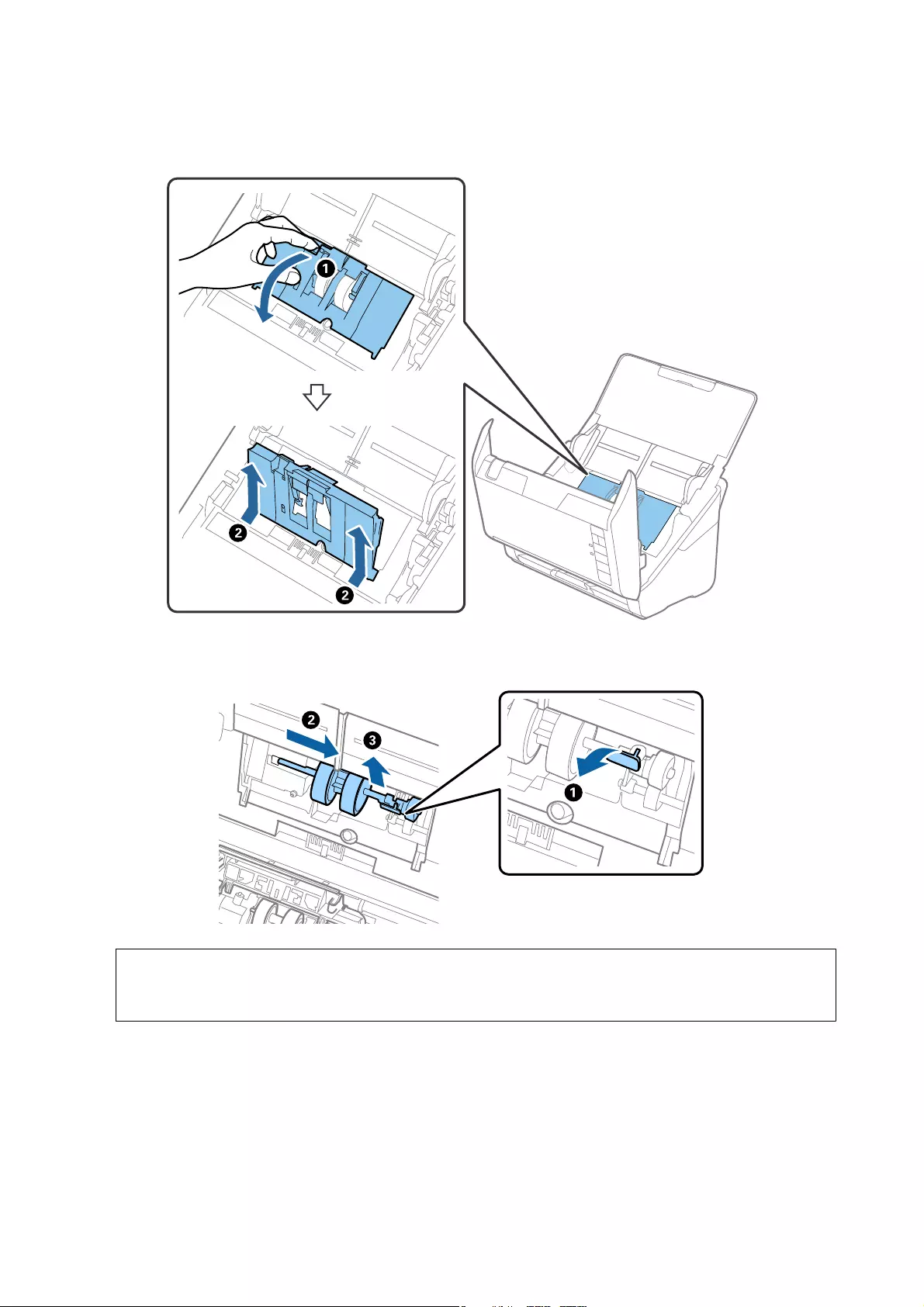
4. Open the cover of the pickup roller, and then slide and remove it.
5. Pull down the xture of the roller axis, and then slide and remove the installed pickup rollers.
c
Important:
Do not pull out the pickup roller forcibly. is could damage the inside of the scanner.
User's Guide
Maintenance
94
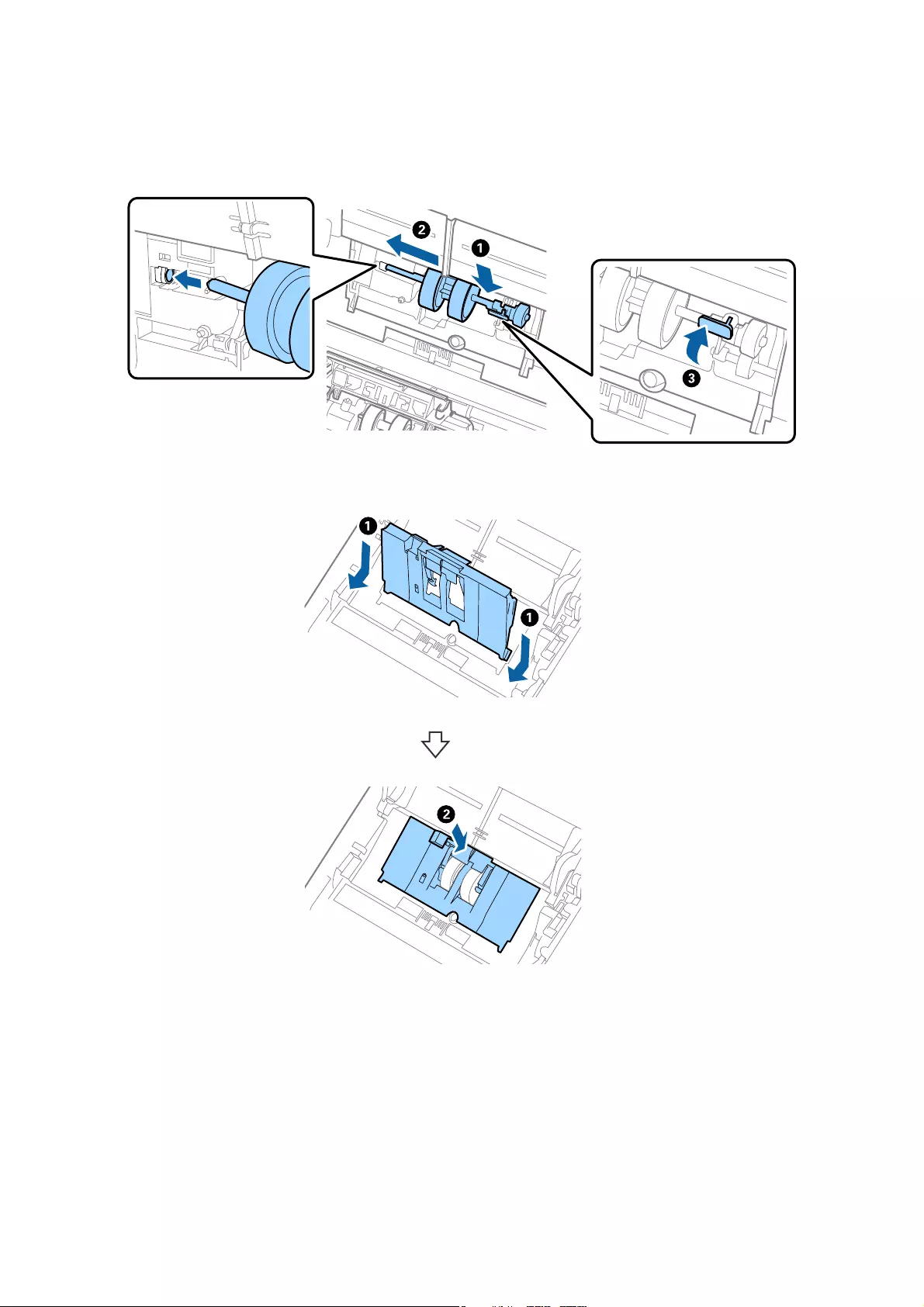
6. While holding down the xture, slide the new pickup roller to the le and insert it into the hole in the body.
Press the xture to secure it.
7. Put the edge of the cover of the pickup roller into the groove and slide it. Close the cover rmly.
User's Guide
Maintenance
95
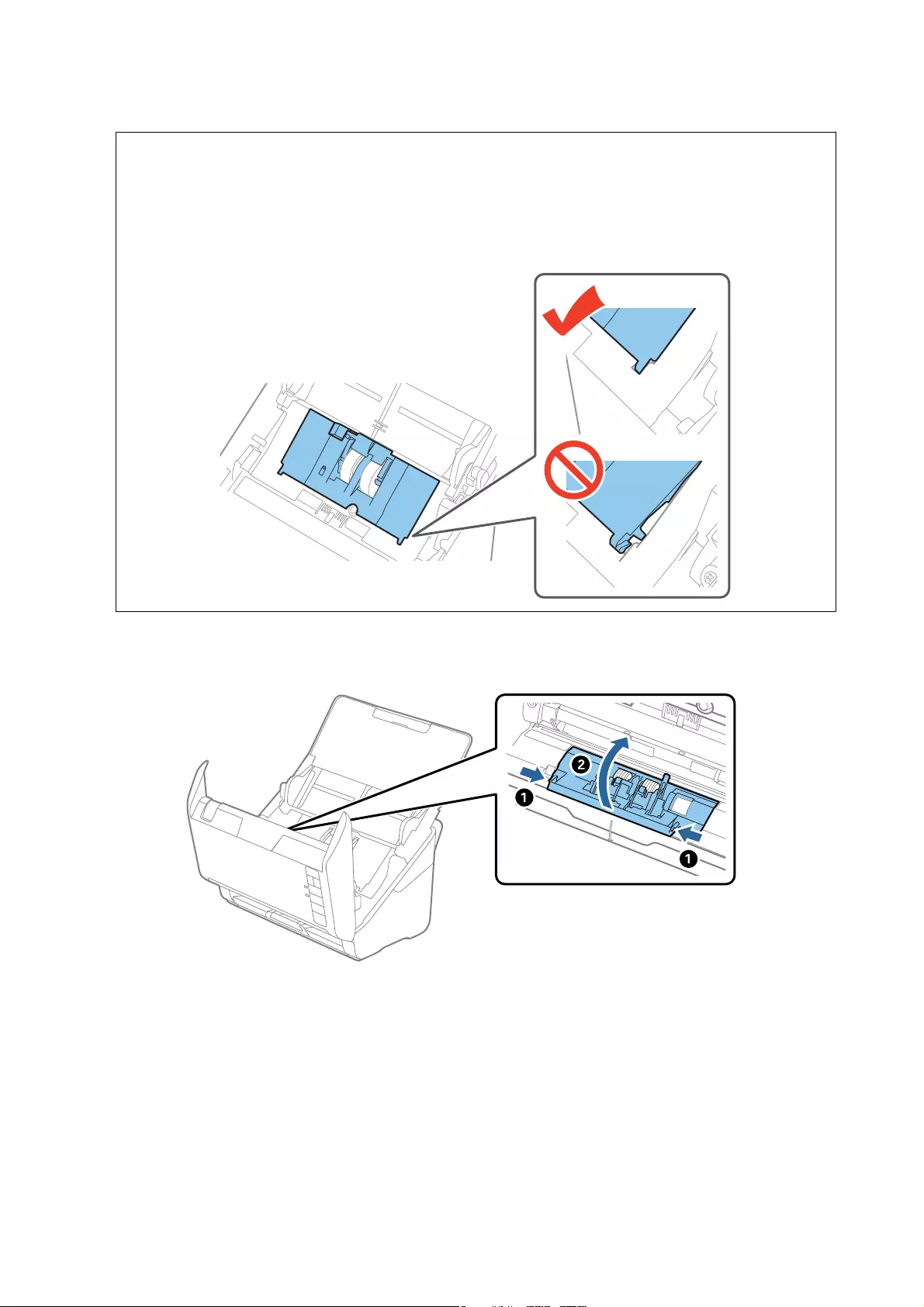
c
Important:
❏Make sure the pick up cover is closed correctly.
❏Make sure the pickup rollers are installed correctly if the cover is hard to close.
❏Do not install the cover while it is raised.
8. Push the hooks on both ends of the separation roller cover to open the cover.
User's Guide
Maintenance
96
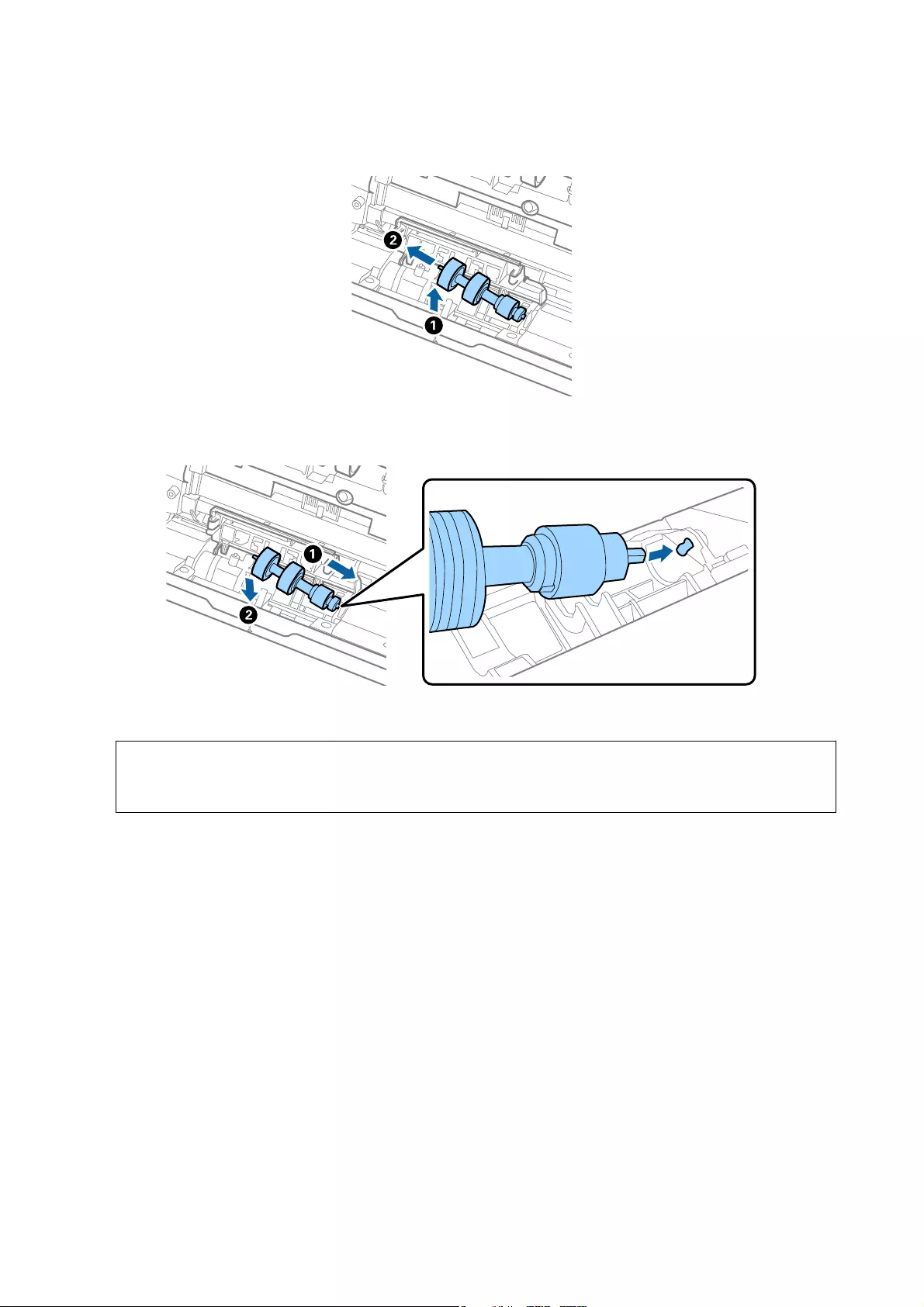
9. Li the le side of the separation roller, and then slide and remove the installed separation rollers.
10. Insert the new separation roller axis into the hole on the right side, and then lower the roller.
11. Close the separation roller cover.
c
Important:
Make sure the separation rollers are installed correctly if the cover is hard to close.
12. Close the scanner cover.
13. Plug in the AC adapter, and then turn on the scanner.
14. Reset the scan number using Epson Scan 2 Utility.
Note:
Dispose of the pickup roller and the separation roller following the rules and regulations of your local authority. Do not
disassemble them.
Related Information
&“Roller Assembly Kit Codes” on page 16
Resetting the Number of Scans
Reset the number of scans using Epson Scan 2 Utility aer replacing the Roller Assembly Kit.
User's Guide
Maintenance
97
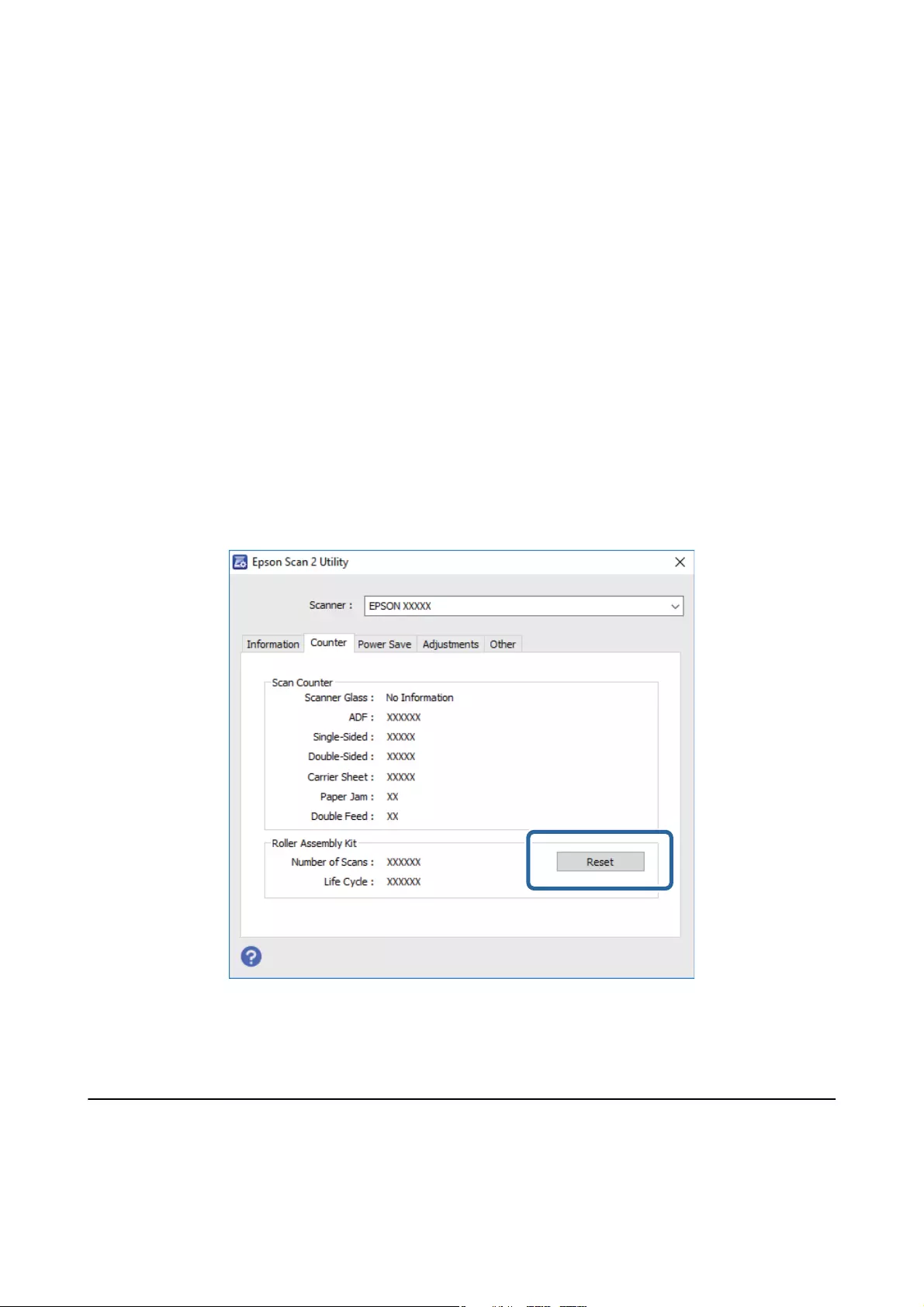
1. Turn on the scanner.
2. Start Epson Scan 2 Utility.
❏Win d ow s 1 0
Click the start button, and then select All apps > EPSON > Epson Scan 2 > Epson Scan 2 Utility.
❏Windows 8.1/Windows 8/Windows Server 2012 R2/Windows Server 2012
Start screen > Apps > Epson > Epson Scan 2 Utility.
❏Windows 7/Windows Vista/Windows XP/Windows Server 2008 R2/Windows Server 2008/Windows Server
2003 R2/Windows Server 2003
Click the start button, and then select All Programs (or Programs) > EPSON > Epson Scan 2 > Epson
Scan 2 Utility.
❏Mac OS X
Select Go > Applications > EPSON Soware > Epson Scan 2 Utility.
3. Click the Counter tab.
4. Click Reset for the roller assembly kit.
Related Information
&“Replacing the Roller Assembly Kit” on page 93
Energy Saving
You can save energy by using the sleep mode or auto power o mode when no operations are performed by the
scanner. You can set the time period before the scanner enters sleep mode and turns o automatically. Any
increase will aect the product’s energy eciency. Consider the environment before making any changes.
User's Guide
Maintenance
98
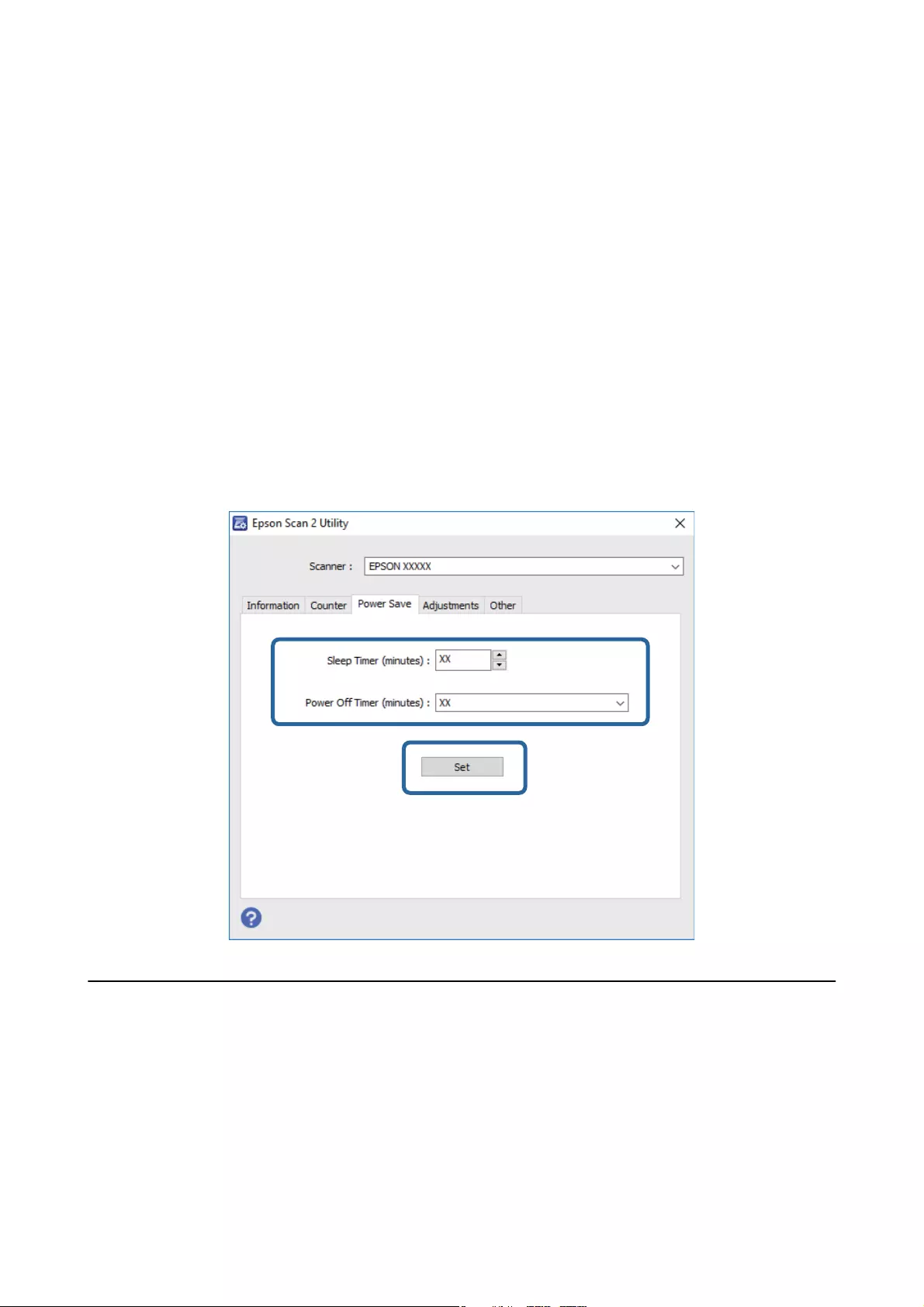
1. Start Epson Scan 2 Utility.
❏Win d ow s 1 0
Click the start button, and then select All apps > EPSON > Epson Scan 2 > Epson Scan 2 Utility.
❏Windows 8.1/Windows 8/Windows Server 2012 R2/Windows Server 2012
Start screen > Apps > Epson > Epson Scan 2 Utility.
❏Windows 7/Windows Vista/Windows XP/Windows Server 2008 R2/Windows Server 2008/Windows Server
2003 R2/Windows Server 2003
Click the start button, and then select All Programs (or Programs) > EPSON > Epson Scan 2 > Epson
Scan 2 Utility.
❏Mac OS X
Select Go > Applications > EPSON Soware > Epson Scan 2 Utility.
2. Click the Power Save tab.
3. Set the Sleep Timer (minutes) or Power O Timer (minutes), and then click Set.
Transporting the Scanner
When you need to transport the scanner to move or for repairs, follow the steps below to pack the scanner.
1. Press the
P
button to turn o the scanner.
2. Unplug the AC adapter from the scanner.
3. Remove the USB cable.
User's Guide
Maintenance
99
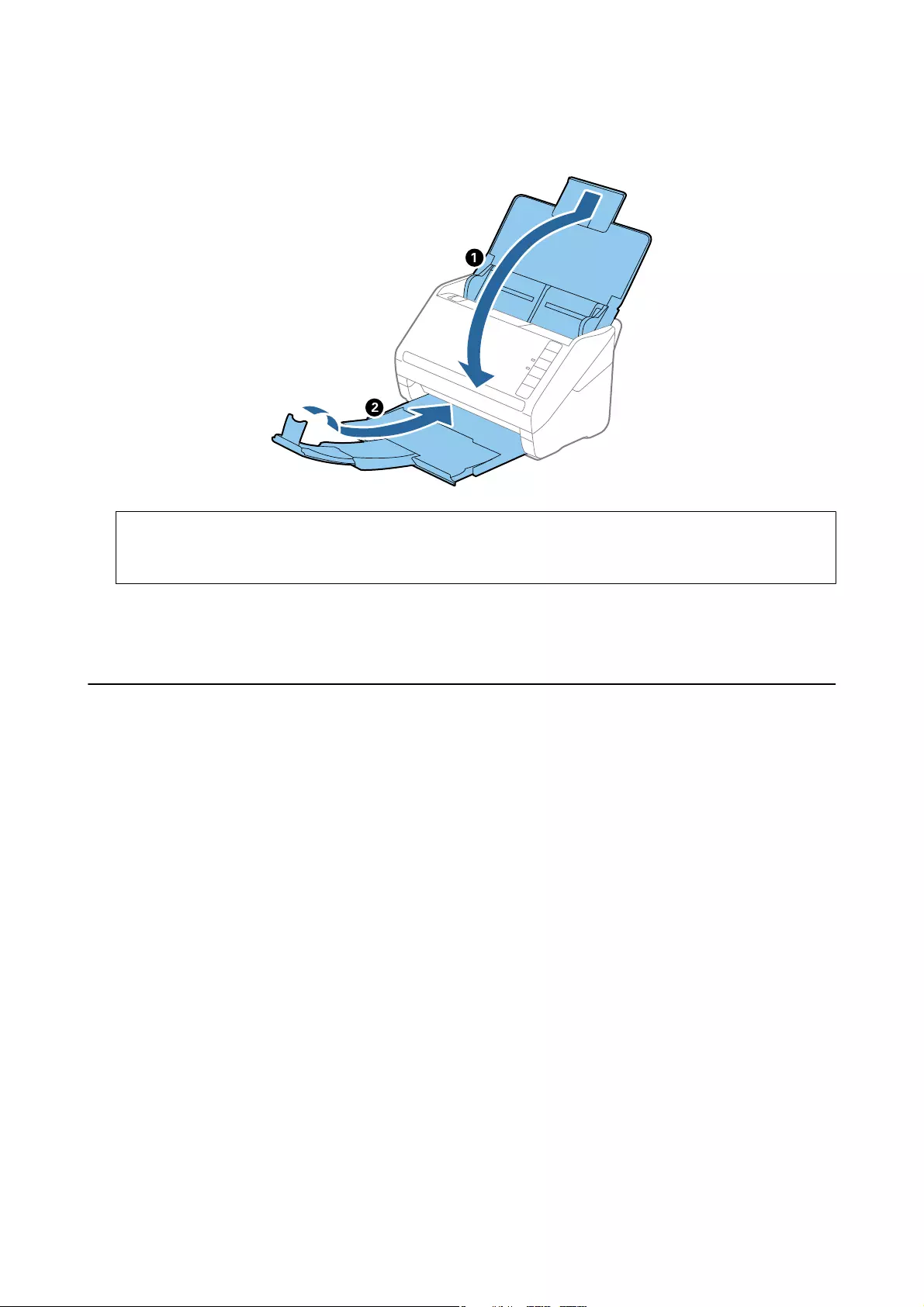
4. Close the input tray and output tray.
c
Important:
Make sure you close the output tray securely; otherwise it may be damaged during transport.
5. Attach the packing materials that came with the scanner, and then repack the scanner in its original box or a
sturdy box.
Updating Applications and Firmware
You may be able to clear certain problems and improve or add functions by updating the applications and the
rmware. Make sure you use the latest version of the applications and rmware.
1. Make sure that the scanner and the computer are connected, and the computer is connected to the internet.
2. Start EPSON Soware Updater, and update the applications or the rmware.
Note:
Windows Server operating systems are not supported.
❏Win d ow s 1 0
Click the start button, and select All apps > Epson Soware > EPSON Soware Updater.
❏Windows 8.1/Windows 8
Enter the application name in the search charm, and then select the displayed icon.
❏Windows 7/Windows Vista/Windows XP
Click the start button, and then select All Programs or Programs > Epson Soware > EPSON Soware
Updater.
❏Mac OS X
Select Finder > Go > Applications > Epson Soware > EPSON Soware Updater.
User's Guide
Maintenance
100
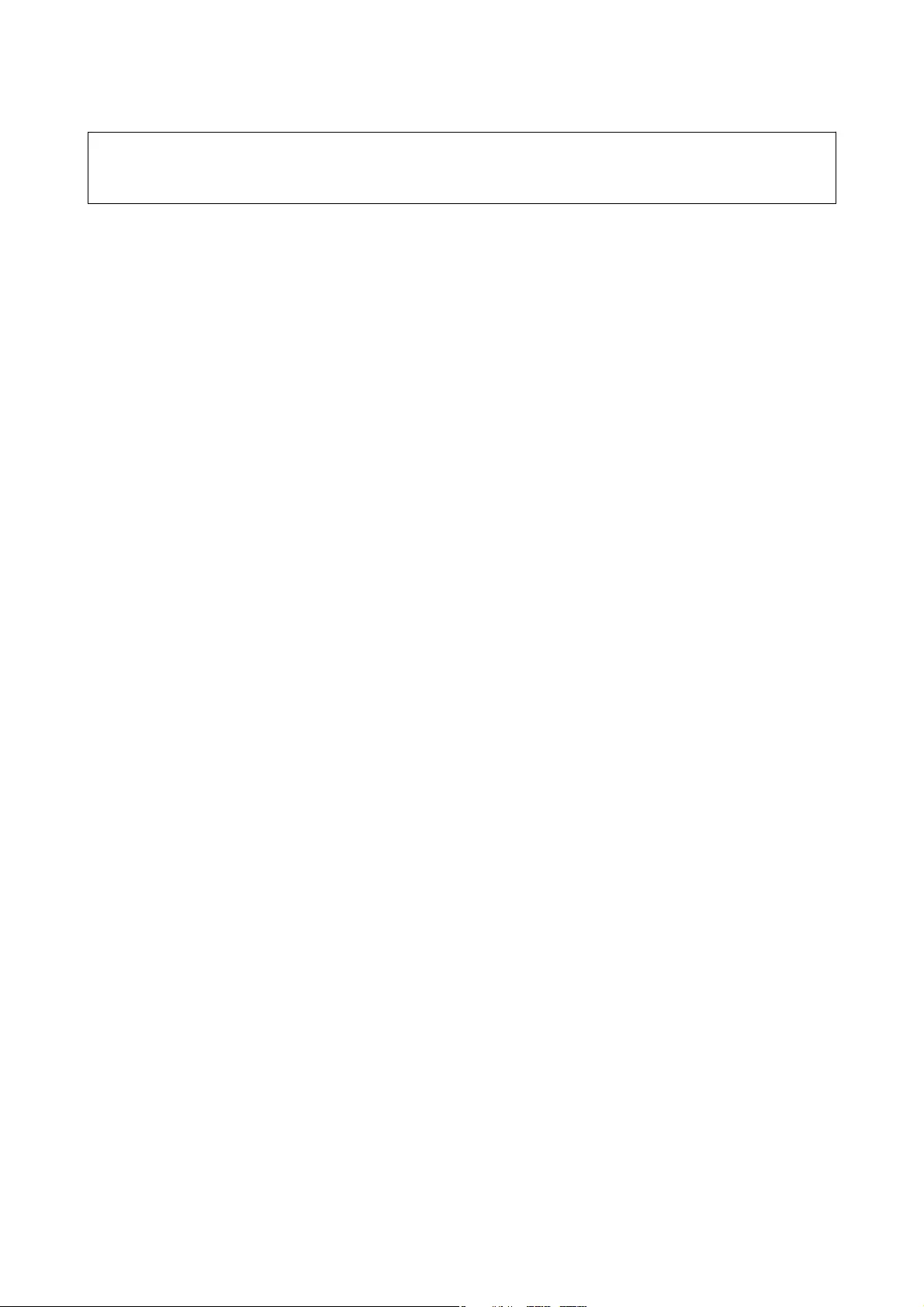
c
Important:
Do not turn o the computer or the scanner while updating.
Note:
If you cannot nd the application you want to update in the list, you cannot update using the EPSON Soware Updater.
Check for the latest versions of the applications on your local Epson website.
http://www.epson.com
User's Guide
Maintenance
101

Solving Problems
Scanner Problems
Scanner Lights Indicate an Error
Check the following if the scanner lights indicate an error.
❏Make sure there are no originals jammed in the scanner.
❏When feeding multiple originals, open the ADF cover and remove the originals. Next, close the ADF cover.
❏Make sure the scanner cover is closed.
❏Make sure the scanner is connected to your computer properly.
❏Make sure Epson Scan 2 is installed correctly.
❏If the rmware update fails and the scanner enters recovery mode, update the rmware again using a USB
connection.
❏Turn o the scanner and turn it on again. If this does not solve the problem, the scanner may be
malfunctioning, or the light source in the scanner unit may need to be replaced. Contact your dealer.
Related Information
&“Error Indicators” on page 14
&“e Original Jams in the Scanner Frequently” on page 105
The Scanner Does Not Turn On
❏Make sure the AC adapter is securely connected to the scanner and an electrical outlet.
❏Check that the electrical outlet is working. Plug another device into the electrical outlet and check that you can
turn the power on.
Problems Starting Scanning
Cannot Start Epson Scan 2
❏Make sure the scanner is connected to your computer properly.
❏Make sure the USB cable is securely connected to the scanner and the computer.
❏Use the USB cable that came with the scanner.
❏If you are using the scanner with the Network Interface Unit, make sure the network cable is securely
connected.
❏Make sure the scanner is turned on.
❏Wait until the status light stops ashing indicating that the scanner is ready to scan.
User's Guide
Solving Problems
102
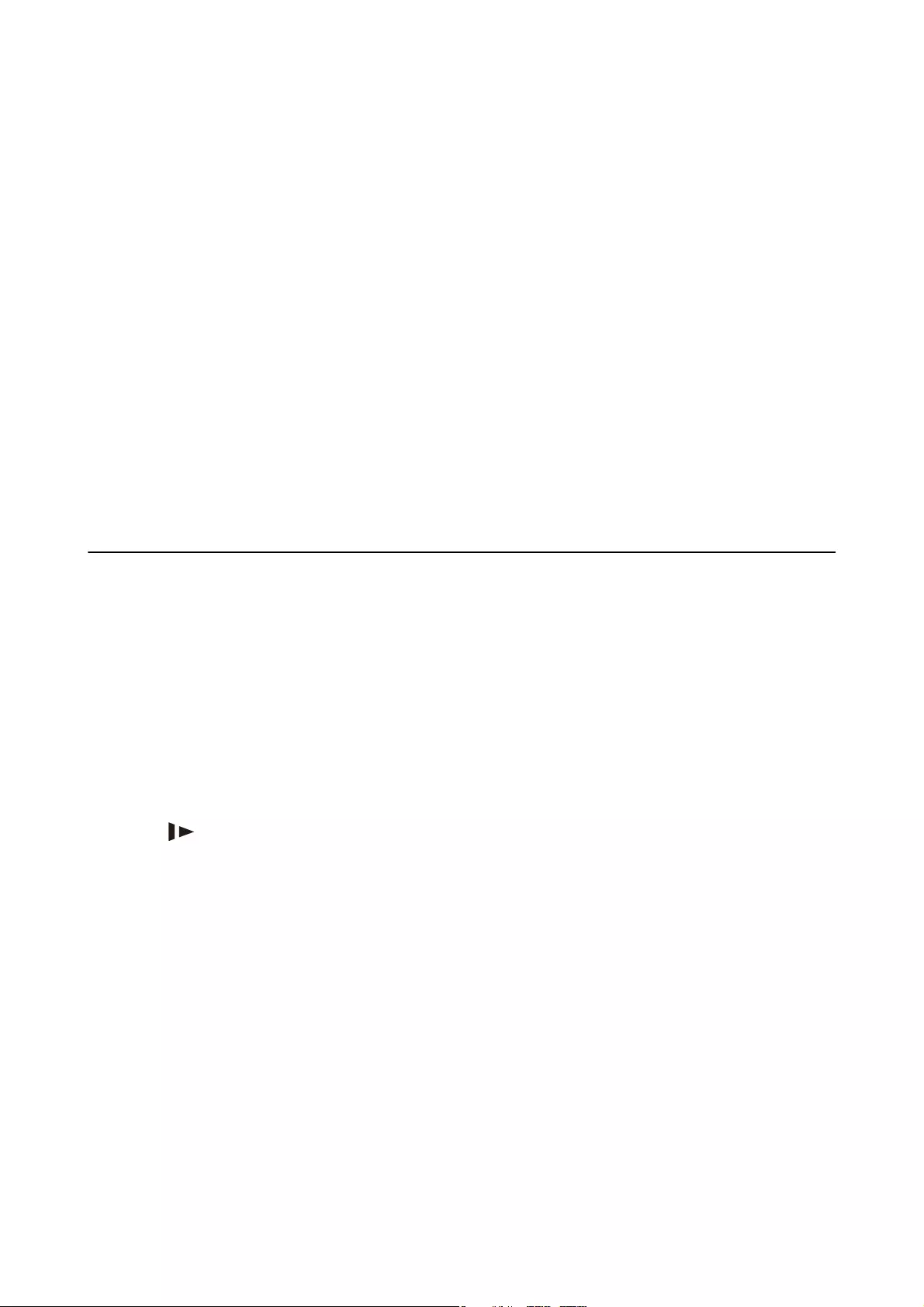
❏Connect the scanner directly to the computer’s USB port. e scanner may not work properly when connected
to the computer through one or more USB hubs.
❏If you are using any TWAIN-compliant applications, make sure that the correct scanner is selected as the
scanner or source setting.
Pressing a Scanner Button Does Not Start the Correct Application
❏Make sure the scanner is connected to your computer properly.
❏Make sure Epson Scan 2 and other applications are installed correctly.
❏Make sure Document Capture Pro (Windows) or Document Capture (Mac OS X) is installed correctly.
❏Check the correct setting is assigned to the scanner button in Document Capture Pro (Windows) or Document
Capture (Mac OS X).
Related Information
&“Scanning Using a Scanner Button” on page 59
Paper Feeding Problems
Multiple Originals Are Fed
If multiple originals are fed, open the scanner cover and remove the originals. Next, close the scanner cover.
If multiple originals are fed frequently, try the following.
❏If you load unsupported originals, the scanner may feed multiple originals at a time.
❏Clean the rollers inside the scanner.
❏Reduce the number of originals being placed at a time.
❏Press the button to slow down the scanning speed.
❏Use Automatic Feeding Mode in Epson Scan 2, and scan originals one by one.
Related Information
&“Cleaning Inside the Scanner” on page 88
&“Scanning Dierent Sizes or Types of Originals One by One (Automatic Feeding Mode)” on page 61
Removing Jammed Originals from the Scanner
If an original has jammed inside the scanner, follow these steps to remove it.
1. Remove all originals remaining in the input tray.
User's Guide
Solving Problems
103
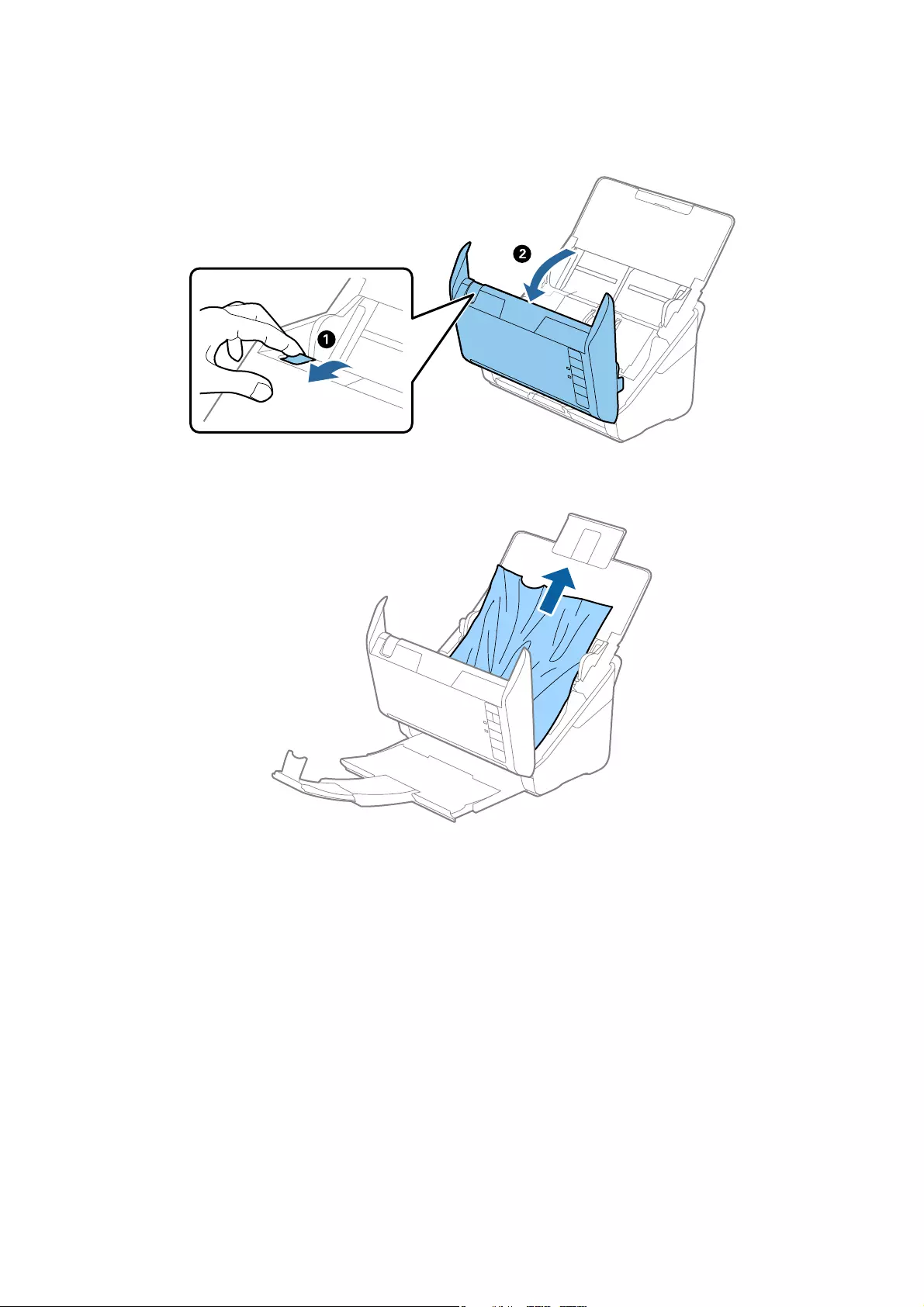
2. Pull the cover open lever and open the scanner cover.
3. Carefully remove any originals remaining inside the scanner.
User's Guide
Solving Problems
104
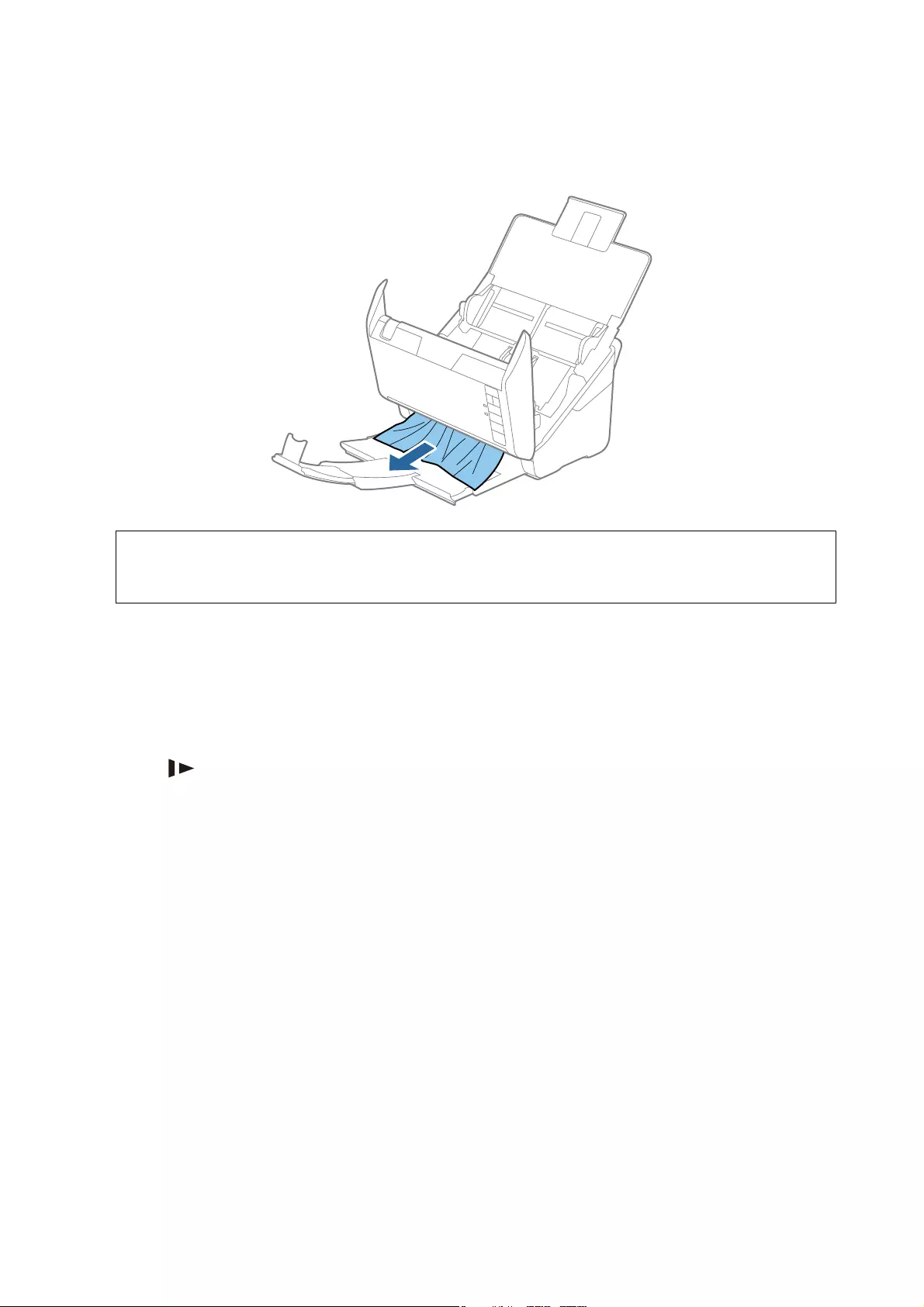
4. Carefully pull out any jammed originals from the output tray in the direction of the arrow if you cannot pull
originals straight up.
c
Important:
Make sure there is no paper inside the scanner.
5. Close the scanner cover.
The Original Jams in the Scanner Frequently
If the original jams in the scanner frequently, try the following.
❏Press the button to slow down the scanning speed.
❏Clean the rollers inside the scanner.
❏If the ejected originals get stuck in the output tray, store the output tray and do not use it.
Related Information
&“Cleaning Inside the Scanner” on page 88
The Originals Get Dirty
Clean the inside of the scanner.
Related Information
&“Cleaning Inside the Scanner” on page 88
User's Guide
Solving Problems
105

Scanning Speed Slows Down when Scanning Continuously
When scanning continuously using the ADF, scanning slows down to prevent the scanner mechanism from
overheating and being damaged. However, you can continue scanning.
To regain normal scanning speed, leave the scanner idle for at least 30 minutes. Scanning speed does not recover
even if the power is o.
Scanning Takes a Long Time
❏When the resolution is high, scanning may take some time.
❏Computers with USB 3.0 (SuperSpeed) or USB 2.0 (Hi-Speed) ports can scan faster than those with USB 1.1
ports. If you are using a USB 3.0 or USB 2.0 port with the scanner, make sure it meets the system requirements.
❏When using security soware, exclude the TWAIN.log le from monitoring, or set the TWAIN.log as a read-
only le. For more information on your security soware’s functions, see the help and so on supplied with the
soware. e TWAIN.log le is saved in the following locations.
❏Windows 10/Windows 8.1/ Windows 8/ Windows 7/ Windows Vista:
C:\Users\(user name)\AppData\Local\Temp
❏Win d ow s X P:
C:\Documents and Settings\(user name)\Local Settings\Temp
Scanned Image Problems
Straight Lines Appear when Scanning from ADF
❏Clean the ADF.
Straight lines may appear in the image when trash or dirt gets into the ADF.
❏Remove any trash or dirt that adheres to the original.
Related Information
&“Cleaning Inside the Scanner” on page 88
The Image Quality is Rough
❏If the resolution is low, try increasing the resolution and then scanning.
❏In Epson Scan 2, adjust the image using items on the Advanced Settings tab, and then scan.
Related Information
&“Setting a Resolution at Suits the Scanning Purpose” on page 54
&“Image Adjustment Features” on page 62
User's Guide
Solving Problems
106

Expanding or Contracting the Scanned Image
When expanding or contracting the scanned image, you can adjust the expansion ratio by using the Adjustments
feature in Epson Scan 2 Utility. is feature is only available for Windows.
Note:
Epson Scan 2 Utility is an application that comes with Epson Scan 2.
1. Start Epson Scan 2 Utility.
❏Win d ow s 1 0
Click the start button, and then select All apps > EPSON > Epson Scan 2 > Epson Scan 2 Utility.
❏Windows 8.1/Windows 8/Windows Server 2012 R2/Windows Server 2012
Enter the application name in the search charm, and then select the displayed icon.
❏Windows 7/Windows Vista/Windows XP/Windows Server 2008 R2/Windows Server 2008/Windows Server
2003 R2/Windows Server 2003
Click the start button, and then select All Programs or Programs > EPSON > Epson Scan 2 > Epson Scan
2 Utility.
2. Select the Adjustments tab.
3. Use Expansion/Contraction to adjust the expansion ratio for scanned images.
4. Click Set to apply the settings to the scanner.
Oset Appears in the Background of Images
Images on the back of the original may appear in the scanned image.
❏In Epson Scan 2, select the Advanced Settings tab, and then adjust the Brightness.
is feature may not be available depending on the settings on the Main Settings tab > Image Type or other
settings on the Advanced Settings tab.
❏In Epson Scan 2, select the Advanced Settings tab, and then Image Option > Text Enhancement.
Related Information
&“Brightness” on page 66
You can adjust the brightness for the whole image.
&“Text Enhancement” on page 65
You can make blurred letters in the original clear and sharp. You can also reduce the oset or unevenness of the
background.
Text is Blurred
❏In Epson Scan 2, select the Advanced Settings tab, and then Image Option > Text Enhancement.
❏In Epson Scan 2, when Image Type on the Main Settings tab is set to Black & White, adjust the reshold on
the Advanced Settings tab. When you increase the reshold, black becomes stronger.
❏If the resolution is low, try increasing the resolution and then scanning.
User's Guide
Solving Problems
107
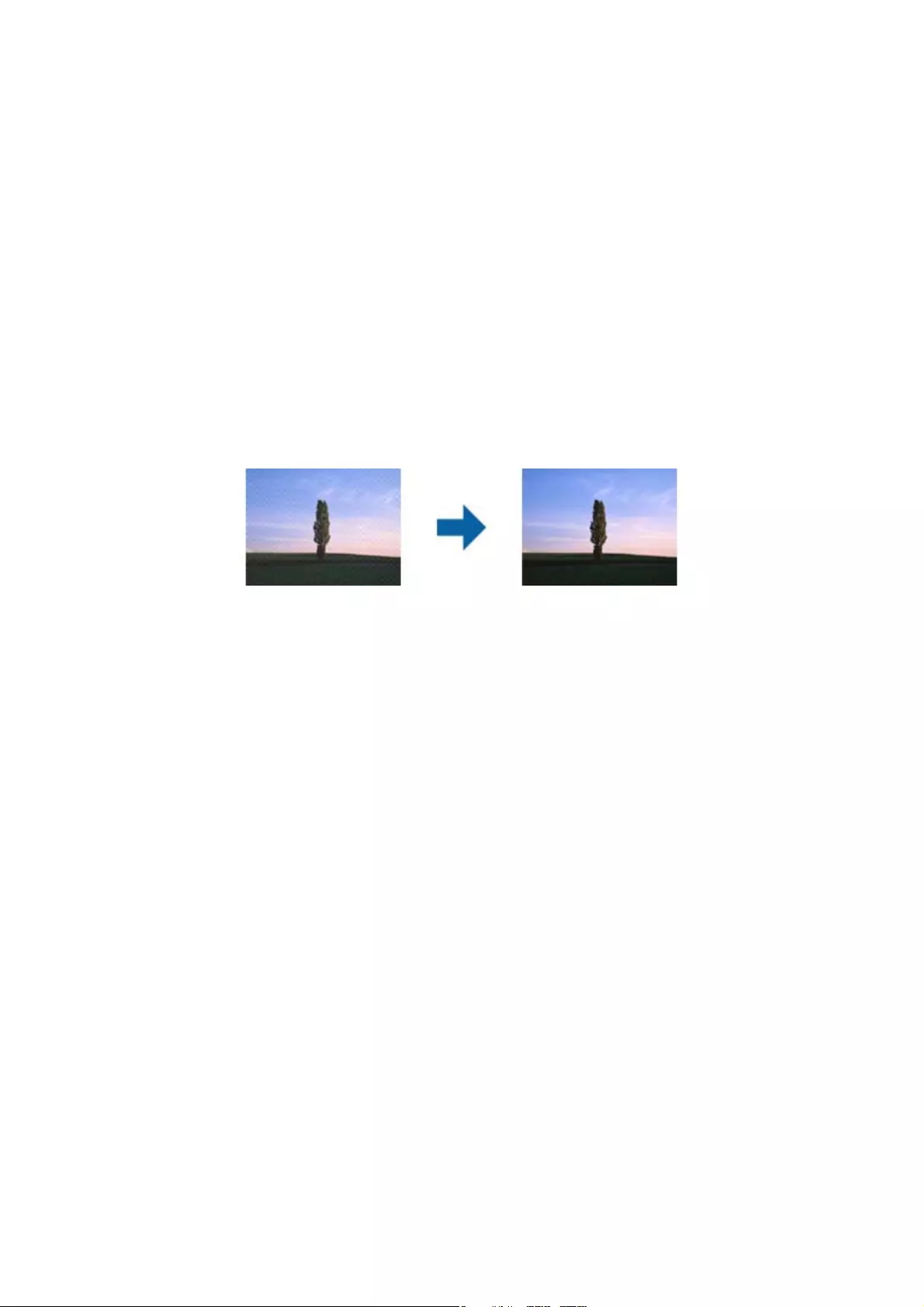
Related Information
&“Text Enhancement” on page 65
You can make blurred letters in the original clear and sharp. You can also reduce the oset or unevenness of the
background.
&“reshold” on page 67
You can adjust the border for monochrome binary (black and white). Increase the threshold, the black color area
becomes larger. Decrease the threshold, the white color area becomes larger.
&“Setting a Resolution at Suits the Scanning Purpose” on page 54
Moiré Patterns (Web-Like Shadows) Appear
If the original is a printed document, moiré patterns (web-like shadows) may appear in the scanned image.
❏On the Advanced Settings tab in Epson Scan 2, select Descreening.
❏Change the resolution, and then scan again.
Related Information
&“Descreening” on page 64
You can remove moiré patterns (web-like shadows) that appear when scanning printed paper such as a
magazine.
&“Setting a Resolution at Suits the Scanning Purpose” on page 54
The Edge of the Original is Not Scanned when Automatically
Detecting the Size of the Original
❏In Epson Scan 2, select the Main Settings tab, and then select Document Size > Settings. On the Document
Size Settings window, adjust Crop Margins for Size "Auto".
❏Depending on the original, the area of the original may not be detected correctly when using the Auto Detect
feature. Select the appropriate size of the original from the Document Size list.
Note:
If the size of the original you want to scan is not on the list, select Customize, and then create the size manually.
Text is Not Recognized Correctly when Saving as a Searchable PDF
❏On the Image Format Options window in Epson Scan 2, check that Text Language is set correctly on the Text
tab.
❏Check that the original is placed straight.
User's Guide
Solving Problems
108

❏Use an original with clear text. Text recognition may decline for the following types of originals.
❏Originals that have been copied a number of times
❏Originals received by fax (at low resolutions)
❏Originals on which the letter spacing or line spacing is too small
❏Originals with ruled lines or underlining over the text
❏Originals with hand-written text
❏Originals with creases or wrinkles
❏In Epson Scan 2, when Image Type on the Main Settings tab is set to Black & White, adjust the reshold on
the Advanced Settings tab. When you increase the reshold, the black color area becomes larger.
❏In Epson Scan 2, select the Advanced Settings tab, and then Image Option > Text Enhancement.
Related Information
&“Saving as a Searchable PDF” on page 69
&“Text Enhancement” on page 65
You can make blurred letters in the original clear and sharp. You can also reduce the oset or unevenness of the
background.
&“reshold” on page 67
You can adjust the border for monochrome binary (black and white). Increase the threshold, the black color area
becomes larger. Decrease the threshold, the white color area becomes larger.
Cannot Solve Problems in the Scanned Image
If you have tried all of the solutions and have not solved the problem, initialize the Epson Scan 2 settings using
Epson Scan 2 Utility.
Note:
Epson Scan 2 Utility is an application that comes with Epson Scan 2.
1. Start Epson Scan 2 Utility.
❏Win d ow s 1 0
Click the start button, and then select All apps > EPSON > Epson Scan 2 Utility.
❏Windows 8.1/Windows 8/Windows Server 2012 R2/Windows Server 2012
Enter the application name in the search charm, and then select the displayed icon.
❏Windows 7/Windows Vista/Windows XP/Windows Server 2008 R2/Windows Server 2008/Windows Server
2003 R2/Windows Server 2003
Click the start button, and then select All Programs or Programs > EPSON > Epson Scan 2 > Epson Scan
2 Utility.
❏Mac OS X
Select Go > Applications > Epson Soware > Epson Scan 2 Utility.
2. Select the Other tab.
3. Click Reset.
Note:
If initialization does not solve the problem, uninstall and re-install Epson Scan 2.
User's Guide
Solving Problems
109

Uninstalling and Installing Applications
Uninstalling Your Applications
You may need to uninstall and then reinstall your applications to solve certain problems or if you upgrade your
operating system. Log on to your computer as an administrator. Enter the administrator password if the computer
prompts you.
Uninstalling Your Applications for Windows
1. Quit all running applications.
2. Disconnect the scanner from your computer.
3. Open the Control Panel:
❏Win d ow s 1 0
Right-click the start button or press and hold it, and then select Control Panel.
❏Windows 8.1/Windows 8/Windows Server 2012 R2/Windows Server 2012
Select Desktop > Settings > Control Panel.
❏Windows 7/Windows Vista/Windows XP/Windows Server 2008 R2/Windows Server 2008/Windows Server
2003 R2/Windows Server 2003
Click the start button and select Control Panel.
4. Open Uninstall a program (or Add or Remove Programs):
❏Windows 10/Windows 8.1/Windows 8/Windows 7/Windows Vista/Windows Server 2012 R2/Windows
Server 2012/Windows Server 2008 R2/Windows Server 2008
Select Uninstall a program in Programs.
❏Windows XP/Windows Server 2003 R2/Windows Server 2003
Click Add or Remove Programs.
5. Select the application you want to uninstall.
6. Uninstall the applications:
❏Windows 10/Windows 8.1/Windows 8/Windows 7/Windows Vista/Windows Server 2012 R2/Windows
Server 2012/Windows Server 2008 R2/Windows Server 2008
Click Uninstall/Change or Uninstall.
❏Windows XP/Windows Server 2003 R2/Windows Server 2003
Click Change/Remove or Remove.
Note:
If the User Account Control window is displayed, click Continue.
7. Follow the on-screen instructions.
Note:
A message may be displayed prompting you to restart your computer. If it is displayed, make sure I want to restart my
computer now is selected, and then click Finish.
User's Guide
Solving Problems
110
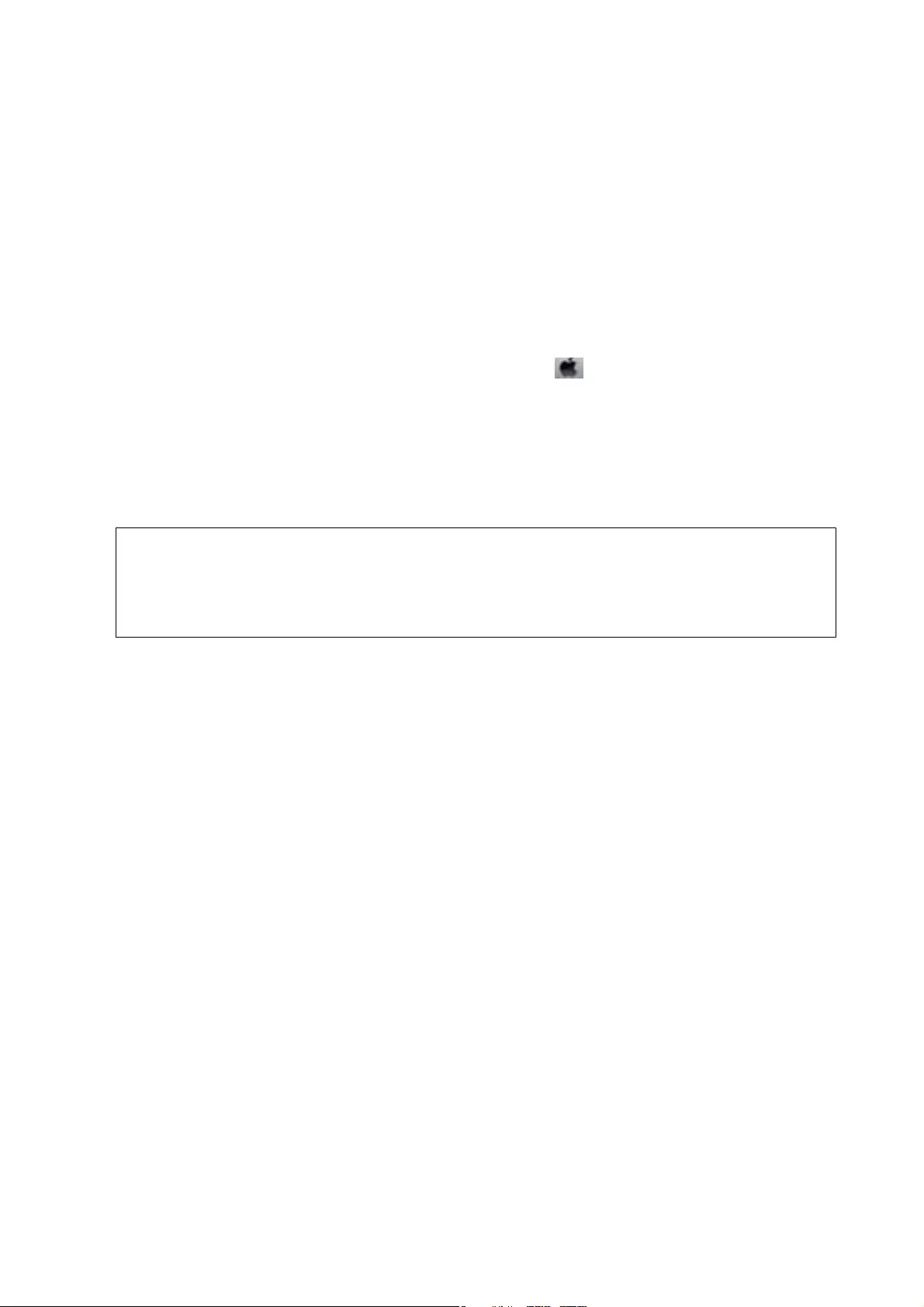
Uninstalling Your Applications for Mac OS X
Note:
Make sure you installed EPSON Soware Updater.
1. Download the Uninstaller using EPSON Soware Updater.
Once you have downloaded the Uninstaller, you do not need to download it again each time you uninstall the
application.
2. Disconnect the scanner from your computer.
3. To uninstall the scanner driver, select System Preferences from the menu > Printers & Scanners (or
Print & Scan, Print & Fax), and then remove the scanner from the enabled scanner list.
4. Quit all running applications.
5. Select Finder > Go > Applications > Epson Soware > Uninstaller.
6. Select the application you want to uninstall, and then click Uninstall.
c
Important:
e Uninstaller removes all drivers for Epson scanners on the computer. If you use multiple Epson scanners and
you only want to delete some of the drivers, delete all of them rst, and then install the necessary scanner
drivers again.
Note:
If you cannot nd the application you want to uninstall in the application list, you cannot uninstall using the
Uninstaller. In this situation, select Finder > Go > Applications > Epson Soware, select the application you want to
uninstall, and then drag it to the trash icon.
Installing Your Applications
Follow the steps below to install the necessary applications.
Note:
❏Log on to your computer as an administrator. Enter the administrator password if the computer prompts you.
❏When reinstalling applications, you need to uninstall them rst.
1. Quit all running applications.
2. When installing Epson Scan 2, disconnect the scanner and the computer temporarily.
Note:
Do not connect the scanner and the computer until you are instructed to do so.
3. Install the application by following the instructions on the Website below.
http://epson.sn
Note:
For Windows, you can also use the soware disc that came with the scanner.
User's Guide
Solving Problems
111
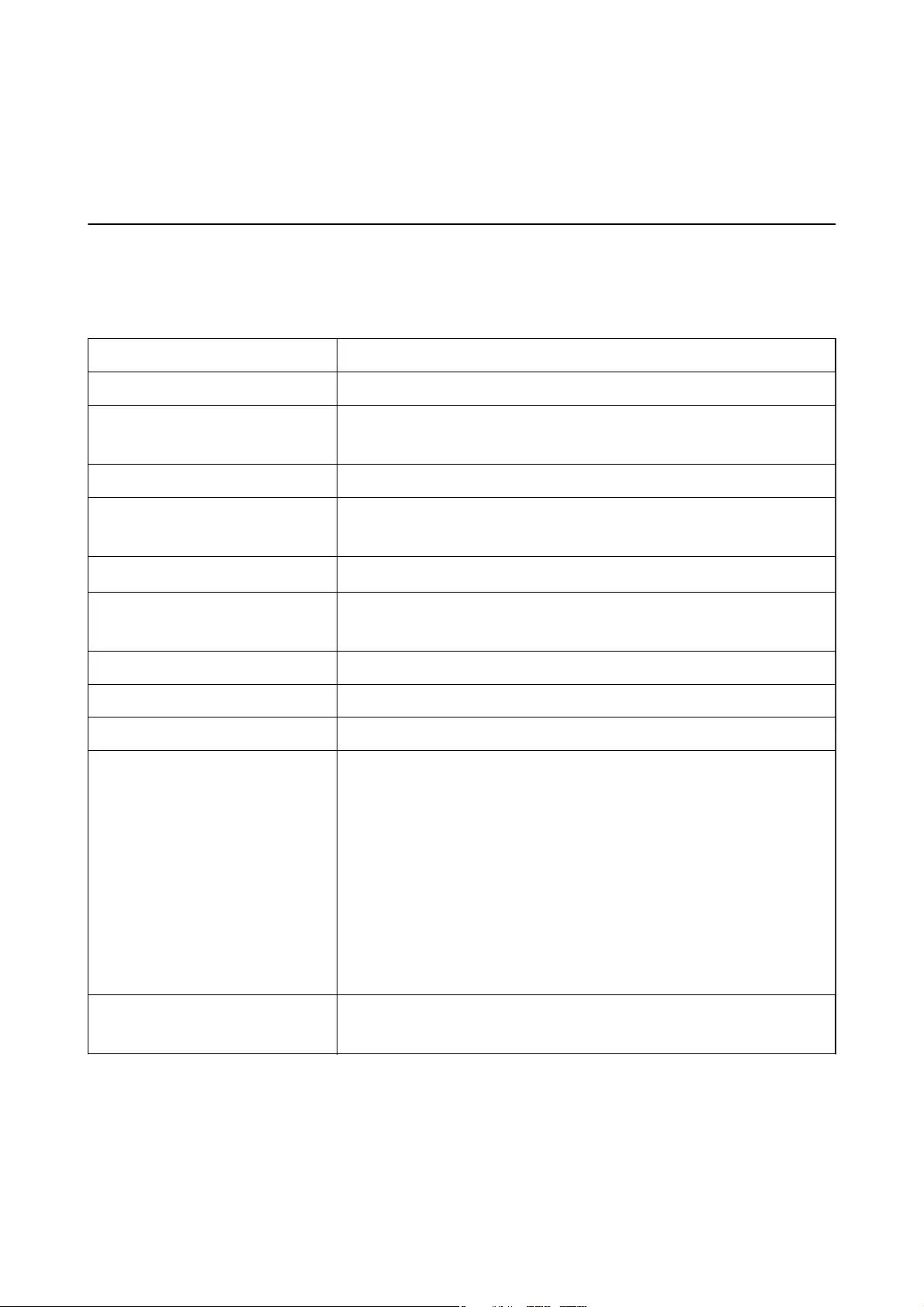
Technical Specications
General Scanner Specications
Note:
Specications are subject to change without notice.
Scanner type Sheet Feed, one pass duplex color scanner
Photoelectric device CIS
Eective pixels 5,100×9,300 at 600 dpi
2,550×64,500 at 300 dpi
Light source RGB LED
Scanning resolution 600 dpi (main scan)
600 dpi (sub scan)
Output resolution 50 to 1200 dpi (in 1 dpi increments)
*1
Document Size Max: 215.9×6,096 mm (8.5×240 inches)
Min: 50.8×50.8 mm (2×2 inches)
Paper input Face-down loading
Paper output Face-down ejection
Paper capacity 100 sheets of paper at 80 g/m
Color Depth Color
❏30 bits per pixel internal (10 bits per pixel per color internal)
❏24 bits per pixel external (8 bits per pixel per color external)
Grayscale
❏10 bits per pixel internal
❏8 bits per pixel external
Black and white
❏10 bits per pixel internal
❏1 bit per pixel external
Interface
*2
SuperSpeed USB
Ethernet 1000BASE-T/100BASE-TX/10BASE-T (optional)
*1 50 to 300 dpi (393.8 to 5,461.0 mm (15.5 to 215 in.) in length), 50 to 200 dpi (5,461.1 to 6,096.0 mm (215 to 240 in.) in length)
*2 You cannot use a USB and network connection at the same time.
User's Guide
Technical Specications
112
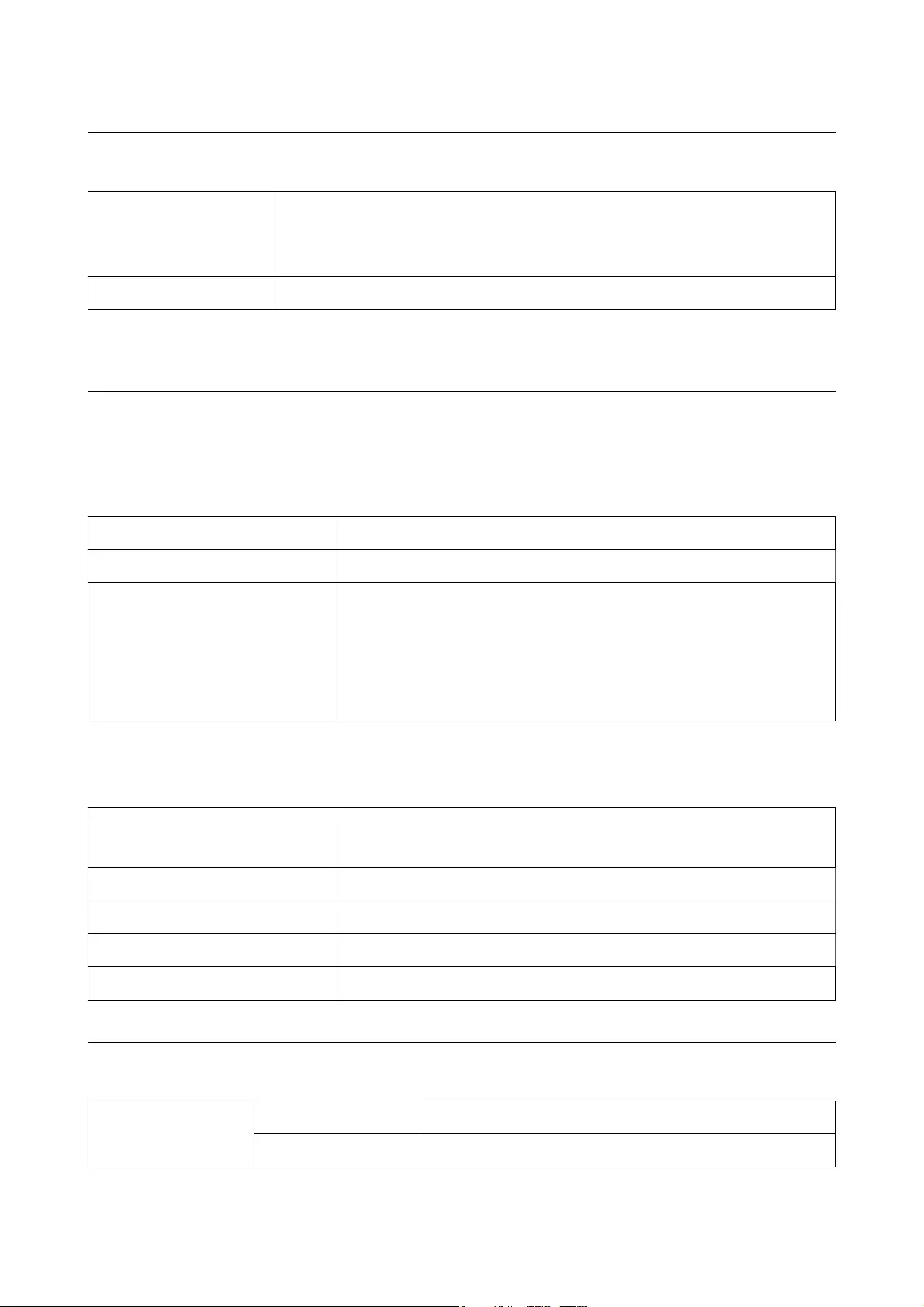
Dimensional Specications
Dimensions * Width: 296 mm (11.7 inches)
Depth: 169 mm (6.7 inches)
Height: 176 mm (6.9 inches)
Weight Approx. 3.7 kg (8.2 lb)
* Without protruding parts.
Electrical Specications
Scanner Electrical Specications
Rated DC Input Power Supply Voltage DC 24 V
Rated DC Input Current 2 A
Power Consumption USB Connection
❏Operating: Approx. 17 W
❏Ready mode: Approx. 9.2 W
❏Sleep mode : Approx. 1.2 W
❏Power o: Approx. 0.1 W
AC Adapter Electrical Specications
Model A471H (AC 100 to 240 V)
A472E (AC 220 to 240 V)
Rated Input Current 1.2 A
Rated Frequency Range 50 to 60 Hz
Rated Output Power Supply Voltage DC 24 V
Rated Output Current 2 A
Environmental Specications
Temperature When operating 5 to 35 °C (41 to 95 °F)
When stored –25 to 60 °C (–13 to 140 °F)
User's Guide
Technical Specications
113
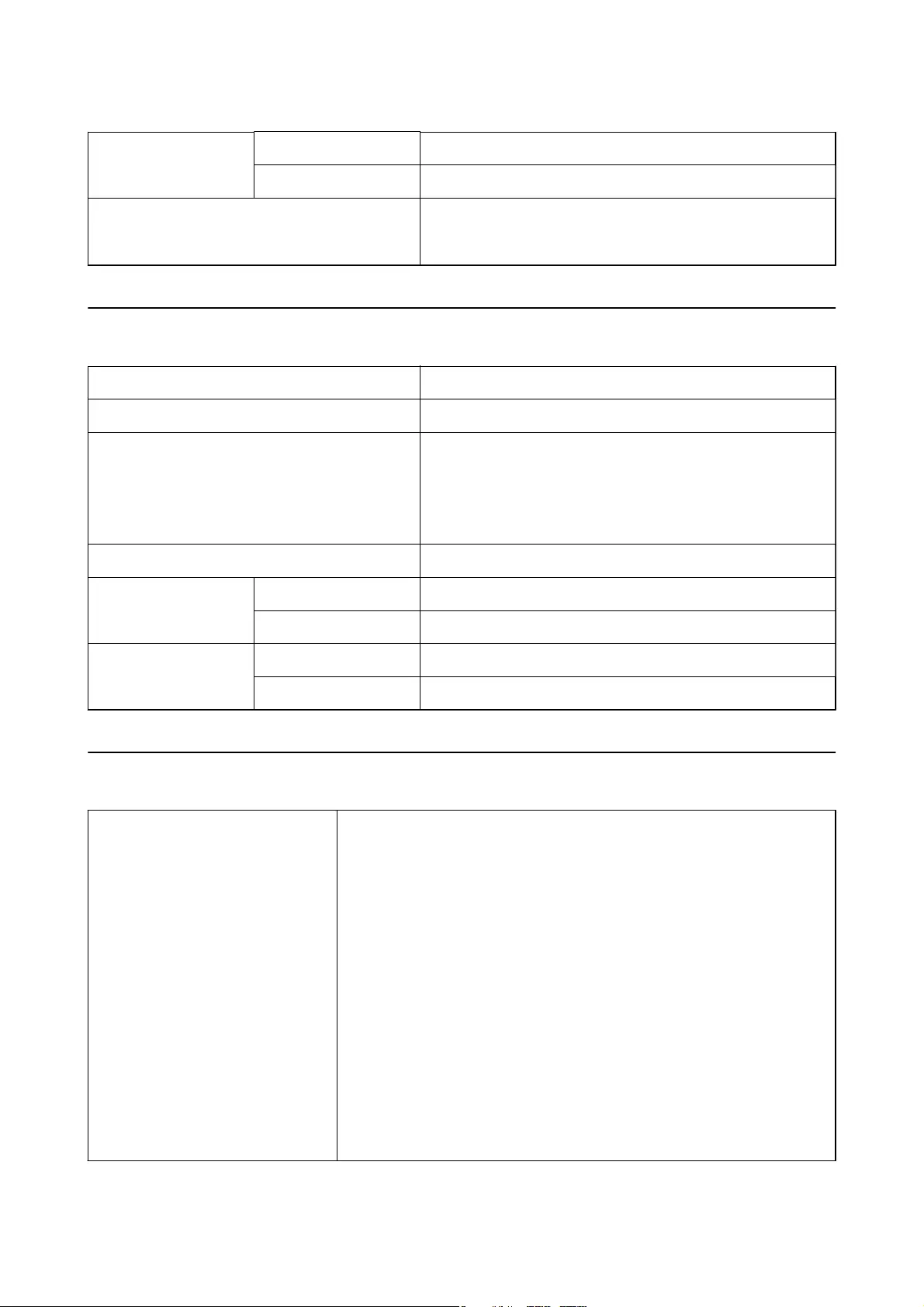
Humidity When operating 15 to 80% (without condensation)
When stored 15 to 85% (without condensation)
Operating conditions Ordinary oce or home conditions. Avoid operating the scanner in
direct sunlight, near a strong light source, or in extremely dusty
conditions.
Flatbed Scanner Dock Specications
Interface Hi-Speed USB
Rated DC Input Power Supply Voltage DC 24 V
Dimensions Width: 300 mm (11.8 inches)
Depth: 481 mm (18.9 inches)
Height: 245 mm (9.6 inches)
Assembled with the Sheet Feed Scanner and the Flatbed Scanner
Weight Approx. 1.1 kg (2.4 lb)
Temperature When operating 10 to 35 °C (50 to 95 °F)
When stored -20 to 60 °C (-4 to 140 °F)
Humidity When operating 20 to 80% (without condensation)
When stored 20 to 85% (without condensation)
System Requirements
Windows Windows 10 (32-bit, 64-bit)
Windows 8.1 (32-bit, 64-bit)
Windows 8 (32-bit, 64-bit)
Windows 7 (32-bit, 64-bit)
Windows Vista (32-bit, 64-bit)
Windows XP Professional x64 Edition Service Pack 2
Windows XP (32-bit) Service Pack 3
Windows Server 2012 R2
Windows Server 2012
Windows Server 2008 R2
Windows Server 2008 (32-bit, 64-bit)
Windows Server 2003 R2 (32-bit, 64-bit)
Windows Server 2003 (32-bit, 64-bit) Service Pack 2
User's Guide
Technical Specications
114
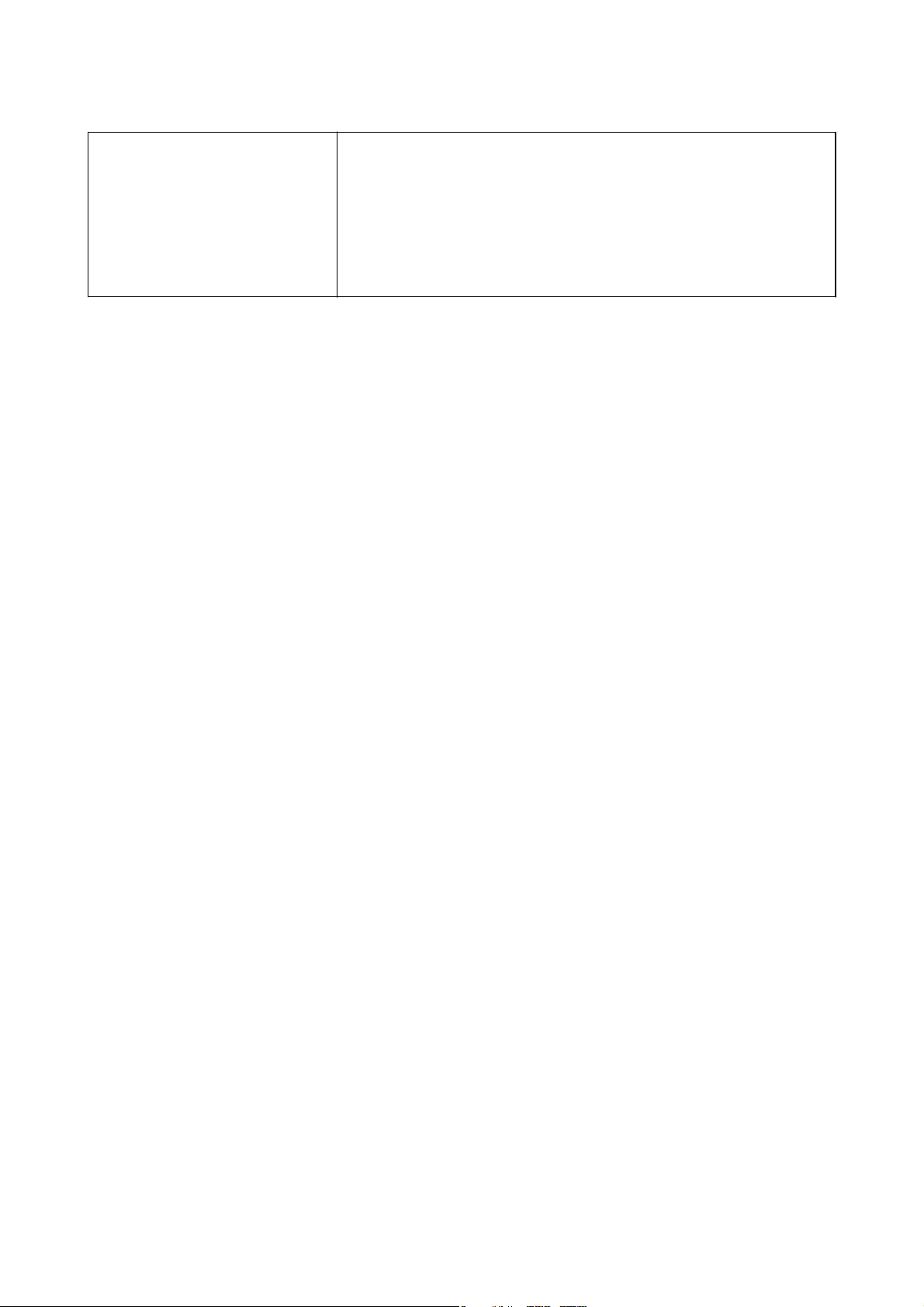
Mac OS X
*1 *2
Mac OS X v10.11.x
Mac OS X v10.10.x
Mac OS X v10.9.x
Mac OS X v10.8.x
Mac OS X v10.7.x
Mac OS X v10.6.8
*1 Fast User Switching on Mac OS X or later is not supported.
*2 The UNIX File System (UFS) for Mac OS X is not supported.
User's Guide
Technical Specications
115

Standards and Approvals
Standards and Approvals for European Models
Product and AC adapter
e following models are CE marked and in compliance with all the applicable EU Directives. For further details,
visit the following website to access the full declaration of conformities containing reference to the Directives and
harmonized standards used to declare conformity.
http://www.epson.eu/conformity
J381A
A471H, A472E
Flatbed Scanner Dock option
e following model is CE marked and in compliance with all the applicable EU Directives. For further details,
visit the following website to access the full declaration of conformities containing reference to the Directives and
harmonized standards used to declare conformity.
http://www.epson.eu/conformity
J381FBSD
User's Guide
Standards and Approvals
116

Where to Get Help
Technical Support Web Site
If you need further help, visit the Epson support website shown below. Select your country or region and go to the
support section of your local Epson website. e latest drivers, FAQs, manuals, or other downloadables are also
available from the site.
http://support.epson.net/
http://www.epson.eu/Support (Europe)
If your Epson product is not operating properly and you cannot solve the problem, contact Epson support services
for assistance.
Contacting Epson Support
Before Contacting Epson
If your Epson product is not operating properly and you cannot solve the problem using the troubleshooting
information in your product manuals, contact Epson support services for assistance. If Epson support for your area
is not listed below, contact the dealer where you purchased your product.
Epson support will be able to help you much more quickly if you give them the following information:
❏Product serial number
(e serial number label is usually on the back of the product.)
❏Product model
❏Product soware version
(Click About, Version Info, or a similar button in the product soware.)
❏Brand and model of your computer
❏Your computer operating system name and version
❏Names and versions of the soware applications you normally use with your product
Note:
Depending on the product, the dial list data for fax and/or network settings may be stored in the product’s memory. Due to
breakdown or repair of a product, data and/or settings may be lost. Epson shall not be responsible for the loss of any data, for
backing up or recovering data and/or settings even during a warranty period. We recommend that you make your own
backup data or take notes.
Help for Users in Europe
Check your Pan-European Warranty Document for information on how to contact Epson support.
User's Guide
Where to Get Help
117

Help for Users in Singapore
Sources of information, support, and services available from Epson Singapore are:
World Wide Web
http://www.epson.com.sg
Information on product specications, drivers for download, Frequently Asked Questions (FAQ), Sales Enquiries,
and Technical Support via e-mail are available.
Epson HelpDesk
Toll Free: 800-120-5564
Our HelpDesk team can help you with the following over the phone:
❏Sales enquiries and product information
❏Product usage questions or problem troubleshooting
❏Enquiries on repair service and warranty
Help for Users in Thailand
Contacts for information, support, and services are:
World Wide Web
http://www.epson.co.th
Information on product specications, drivers for download, Frequently Asked Questions (FAQ), and e-mail are
available.
Epson Hotline
Phone: 66-2685-9899
Email: support@eth.epson.co.th
Our Hotline team can help you with the following over the phone:
❏Sales enquiries and product information
❏Product usage questions or problems
❏Enquiries on repair service and warranty
Help for Users in Vietnam
Contacts for information, support, and services are:
Epson Hotline
Phone(Ho Chi Minh City): 84-8-823-9239
Phone(Hanoi City): 84-4-3978-4785, 84-4-3978-4775
User's Guide
Where to Get Help
118
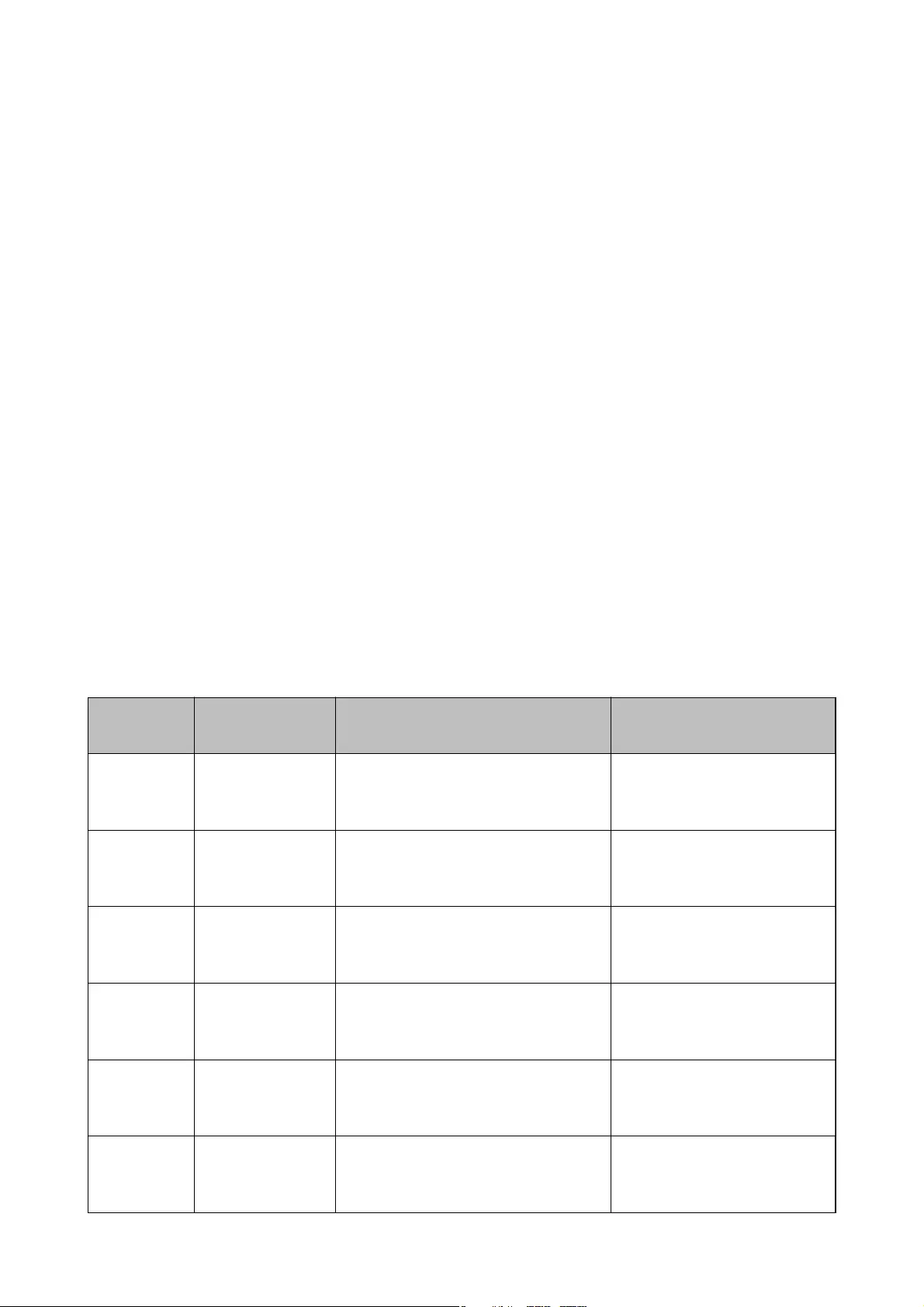
Epson Service Center
65 Truong Dinh Street, District 1, Hochiminh City, Vietnam.
29 Tue Tinh, Quan Hai Ba Trung, Hanoi City, Vietnam
Help for Users in Indonesia
Contacts for information, support, and services are:
World Wide Web
http://www.epson.co.id
❏Information on product specications, drivers for download
❏Frequently Asked Questions (FAQ), Sales Enquiries, questions through e-mail
Epson Hotline
Phone: 62-1500-766
Fax: 62-21-808-66-799
Our Hotline team can help you with the following over the phone or fax:
❏Sales enquiries and product information
❏Technical supp ort
Epson Service Center
Province Company Name Address Phone
E-mail
DKI JAKARTA ESS Jakarta MG.
DUA
RUKO MANGGA DUA MALL NO. 48 JL.
ARTERI MANGGA DUA - JAKARTA UTARA-
DKI
(+6221)62301104
jkt-technical1@epson-
indonesia.co.id
NORTH
SUMATERA
ESC Medan Kompleks Graha Niaga, Jl. Bambu II No. A-4,
Medan- 20114
(+6261)42066090/42066091
mdn-technical@epson-
indonesia.co.id
WEST JAWA ESC Bandung JL. CIHAMPELAS NO. 48A-BANDUNG JABAR
40116
(+6222)4207033
bdg-technical@epson-
indonesia.co.id
DI
YOGYAKARTA
ESC Yogyakarta YAP Square, Blok A No.6 Jl. C Simanjutak
YOGYAKARTA - DIY
(+62274)581065
ygy-technical@epson-
indonesia.co.id
EAST JAWA ESC Surabaya HITECH MALL LT.2 BLOK A NO. 24 JL.
KUSUMA BANGSA NO. 116 -118 -
SURABAYA JATIM
(+6231)5355035
sby-technical@epson-
indonesia.co.id
SOUTH
SULAWESI
ESC Makassar JL. GUNUNG BAWAKARAENG NO. 68E -
MAKASSAR SULSEL
(+62411)328212
mksr-technical@epson-
indonesia.co.id
User's Guide
Where to Get Help
119
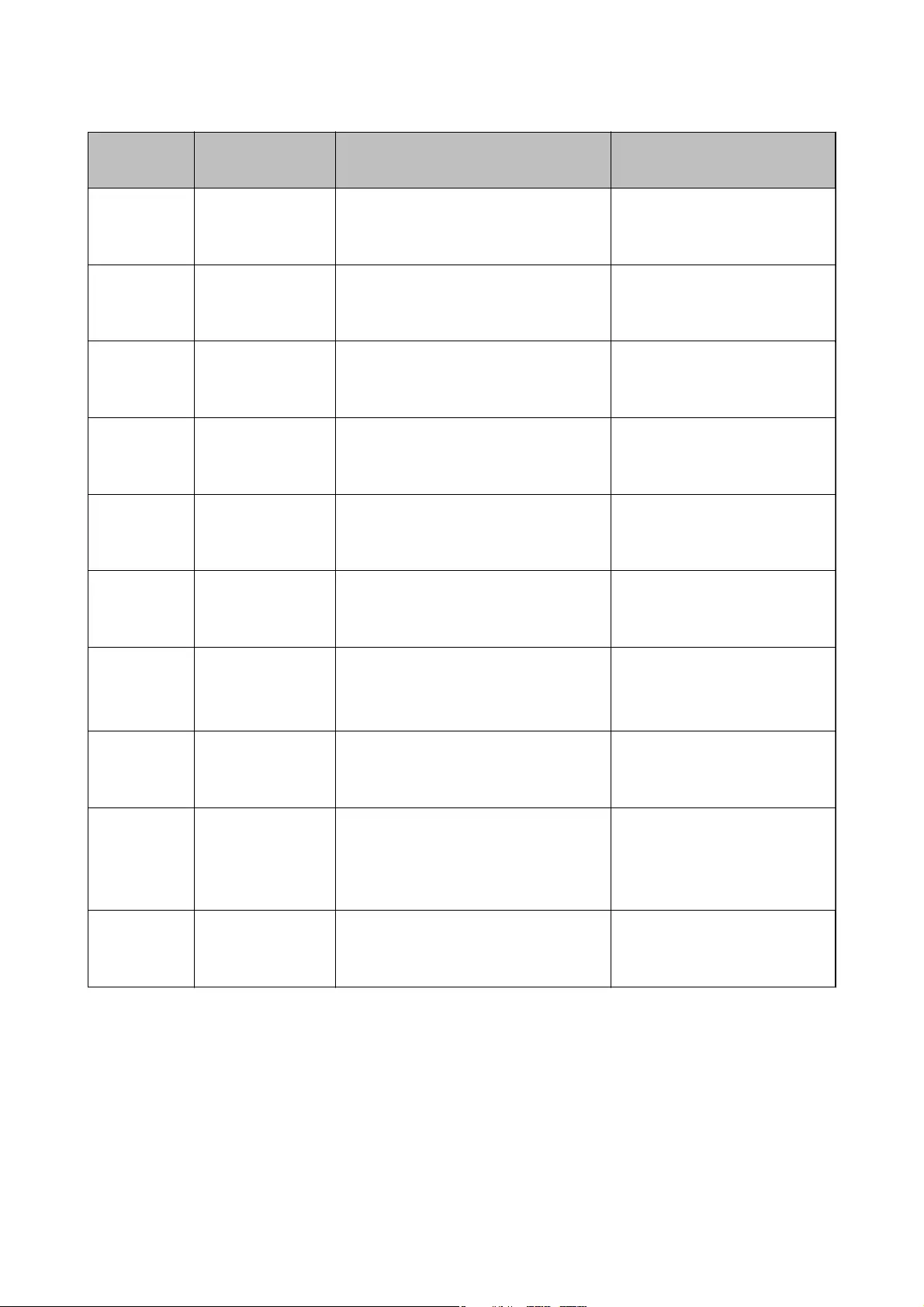
Province Company Name Address Phone
E-mail
WEST
KALIMANTAN
ESC Pontianak JL. NUSA INDAH I NO. 40A PONTIANAK
KALBAR 78117
(+62561)735507
pontianak-technical@epson-
indonesia.co.id
PEKANBARU ESC PEKANBARU JL. TUANKU TAMBUSAI NO. 353 -
PEKANBARU RIAU
(+62761)21420
pkb-technical@epson-
indonesia.co.id
DKI JAKARTA ESS JAKARTA KEIAI WISMA KEIAI LT. 1 JL. JEND. SUDIRMAN KAV.
3 JAKPUS DKI JAKARTA
(+6221)5724335
ess.support@epson-
indonesia.co.id
EAST JAWA ESS SURABAYA JL. JAWA NO. 2-4 KAV. 29, RUKO SURYA INTI,
SURABAYA - JATIM
(+6231)5014949
esssby.support@epson-
indonesia.co.id
BANTEN ESS SERPONG Ruko mall WTC MATAHARI no. 953
SERPONG - Banten
(+6221)53167051
esstag.support@epson-
indonesia.co.id
CENTRAL
JAWA
ESS SEMARANG Komplek Ruko Metro Plaza Blok C20 , Jl. MT
Haryono No 970 Semarang - Jawa tengah
(+6224)8313807
esssmg.support@epson-
indonesia.co.id
EAST
KALIMANTAN
ESC SAMARINDA Jl. KH. Wahid Hasyim (M. Yamin) Kel.
Sempaja Selatan Kec. Samarinda Utara
Samarinda- Kalimantan Timur (samping
kantor pos)
(+62541)7272904
escsmd.support@epson-
indonesia.co.id
SOUTH
SUMATERA
ESC PALEMBANG Jl. H.M. Rasyid Nawawi no.249, kelurahan 9
ilir Palembang - Sumsel
(+62711)311330
escplg.support@epson-
indonesia.co.id
EAST JAVA ESC JEMBER Jl. Panglima Besar Sudirman No.1 D JEMBER
- JAWA TIMUR (Depan Balai Penelitian dan
Pengolahan Kakao)
(+62331) 486468,488373
jmr-admin@epson-indonesia.co.id
jmr-technical@epson-
indonesia.co.id
NORTH
SULAWESI
ESC MANADO Tekno @Megamall, Megamall LG TK-21 Jl.
Piere Tendean Kawasan Megamas
Boulevard Manado 95111
(+62431)7210033
MND-ADMIN@EPSON-
INDONESIA.CO.ID
For other cities not listed here, call the Hot Line: 08071137766.
Help for Users in Malaysia
Contacts for information, support, and services are:
World Wide Web
http://www.epson.com.my
User's Guide
Where to Get Help
120

❏Information on product specications, drivers for download
❏Frequently Asked Questions (FAQ), Sales Enquiries, questions through e-mail
Epson Call Centre
Phone: +60 1800-8-17349
❏Sales enquiries and product information
❏Product usage questions or problems
❏Enquiries on repair services and warranty
Head Oce
Phone: 603-56288288
Fax: 603-5628 8388/603-5621 2088
Help for Users in India
Contacts for information, support, and services are:
World Wide Web
http://www.epson.co.in
Information on product specications, drivers for download, and products enquiry are available.
Helpline
❏Service, product information, and ordering consumables (BSNL Lines)
Toll-free number: 18004250011
Accessible 9am to 6pm, Monday through Saturday (Except public holidays)
❏Service (CDMA & Mobile Users)
Toll-free number: 186030001600
Accessible 9am to 6pm, Monday through Saturday (Except public holidays)
Help for Users in the Philippines
To obtain technical support as well as other aer sales services, users are welcome to contact the Epson Philippines
Corporation at the telephone, fax numbers and e-mail address below:
World Wide Web
http://www.epson.com.ph
Information on product specications, drivers for download, Frequently Asked Questions (FAQ), and E-mail
Enquiries are available.
Epson Philippines Customer Care
Toll Free: (PLDT) 1800-1069-37766
Toll Free: (Digital) 1800-3-0037766
User's Guide
Where to Get Help
121

Metro Manila: (+632)441-9030
Web Site: http://customercare.epson.com.ph
E-mail: customercare@epc.epson.som.ph
Our Customer Care team can help you with the following over the phone:
❏Sales enquiries and product information
❏Product usage questions or problems
❏Enquiries on repair service and warranty
Epson Philippines Corporation
Trunk Line: +632-706-2609
Fax: +632-706-2665
User's Guide
Where to Get Help
122